A first-timer's guide to Georgia, gateway to the Caucasus
Feb 17, 2022 • 9 min read

Georgia is a serene playground for hikers, but there's plenty here for city slickers too © Feng Wei Photography / Getty Images
At the boundary between Europe and Asia, Georgia has a growing reputation as the place to go for travelers who love exploring the fringes of the travel map. The oldest wine-producing nation in the world has a timeless quality that permeates its thriving cities, its bucolic mountain villages and its rugged mountain terrain.
The South Caucasus region spans Georgia, Armenia and Azerbaijan – nations still marked by the shadows of past conflicts and the long reach of their vast Russian neighbor to the north. But Georgia is emerging as the most popular and most accessible gateway to the Caucusus, helped by the growing buzz surrounding its energetic capital city, Tbilisi .
To help ease you into this fascinating corner of Europe, here's a guide for first-time visitors to Georgia.

Visa requirements for Georgia
Visiting Georgia is usually easy for travelers from most countries. Citizens of 98 nations – including the member states of the EU, Australia , New Zealand , USA , Canada , South Africa , Turkey , Russia and many nations in the Middle East, Central America and Central and Southeast Asia – can visit and stay in Georgia visa-free for 365 days. The Georgia Ministry of Foreign Affairs website has more details. Citizens of many other nations can apply for an e-visa before departure , which requires five working days to process. Check the latest Covid regulations before booking your trip.
The best time to visit Georgia
Despite its mountainous topography, Georgia is a year-round destination. Late spring and early autumn are ideal times to visit Georgia's cities, the central plains and the low ridges of the Lesser Caucasus Mountains in the south. Summer (July and August) can get uncomfortably hot and humid in the major cities but this is the peak holiday season on the Black Sea coast. With rising temperatures at higher elevations, summer is also the perfect time to visit the remote valleys and ridges of the Greater Caucasus Mountains in the north.
November to April is the low season in Georgia, with temperatures dropping to below freezing, particularly at higher elevations. However, the chilly weather can start as early as October and last until mid-March. The winter months see heavy snow, particularly in the north of the country, attracting both on-piste skiers and free-riders to the slopes of ski resorts such as Gudauri , a two-hour drive north from Tbilisi.
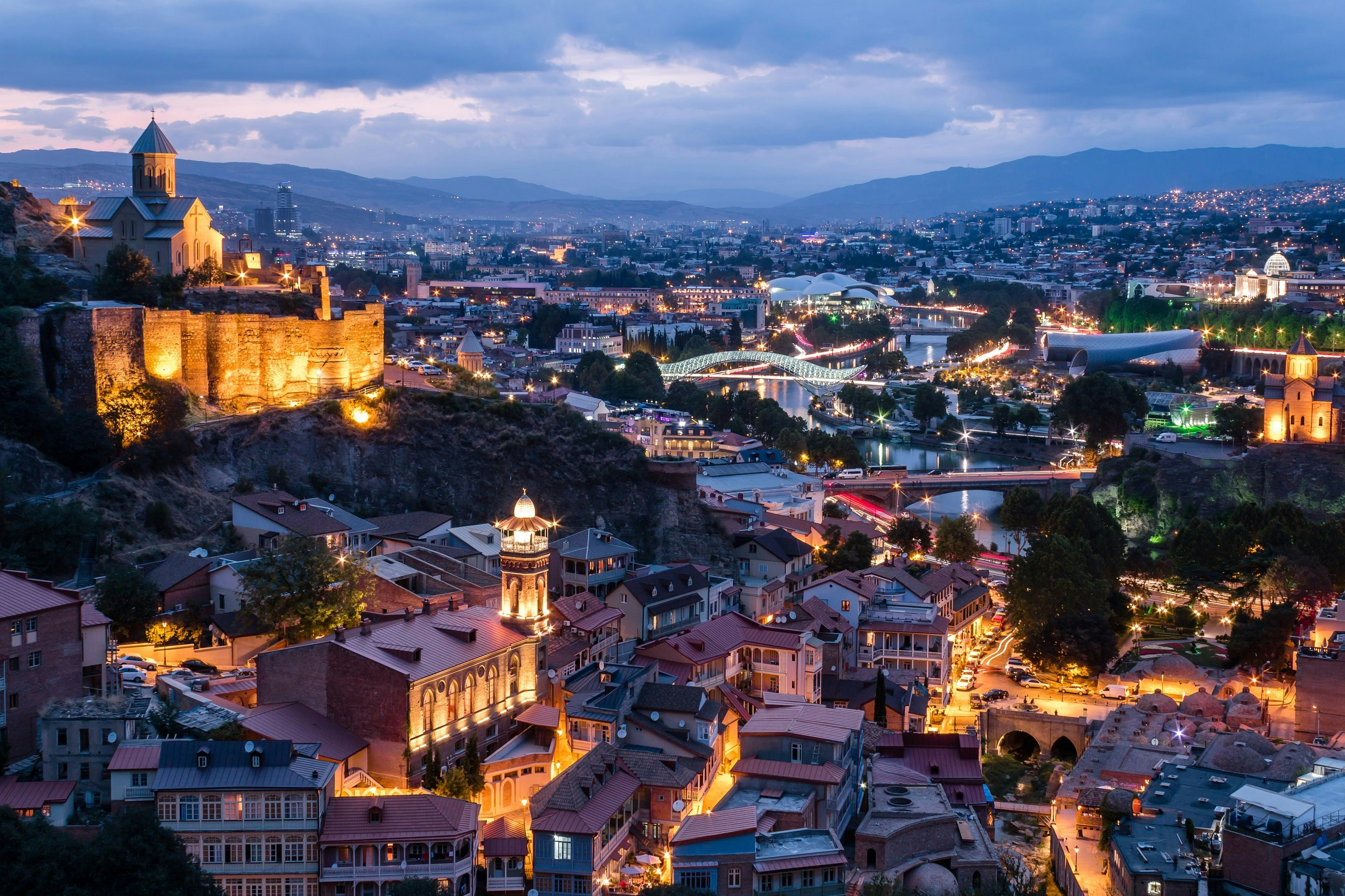
How to get to Georgia by plane
Despite being on the fringes of Europe, Georgia is relatively accessible from most parts of the world. The international airports at Tbilisi , Kutaisi and Batumi are served by numerous carriers – including the national airline, Georgian Airways . The most frequent flights are from Turkey and the Gulf States.
The easiest place to fly into is Tbilisi International Airport , which receives regular flights from cities in Western Europe and the Middle East. The list of budget airlines serving Georgia changes regularly, but Tbilisi and Kutaisi are the main budget hubs. The seaside resort town of Batumi is served by a handful of airlines, with regular flights to Turkey, Ukraine and the Middle East.
How to get to Georgia by land and sea
Georgia has one land border with Russia, close to Stepantsminda (Kazbegi) , with road transport on to the Russian town of Vladikavkaz. Turkey and Georgia share three land borders, of which Sarpi–Hopa near Batumi is the most frequently used, with easy onward travel along the Black Sea coast to Trabzon . Frequent passenger and cargo ferries transport visitors to Georgia's main ports at Poti and Batumi from destinations around the Black Sea.
Borders to Armenia (Sadakhlo–Bagratashen) and Azerbaijan (Red Bridge–Shikhli) are within an hour's drive of Tbilisi, allowing easy onward travel deeper into the Caucasus by bus, marshrutka (minibus) or rail. Night trains run daily to Baku , while overnight sleepers to Yerevan run daily from June to September, then every second day for the rest of the year. A rail link from Tbilisi to Istanbul in Turkey is under development, but currently, the section between Kars and Batumi must be completed by bus.
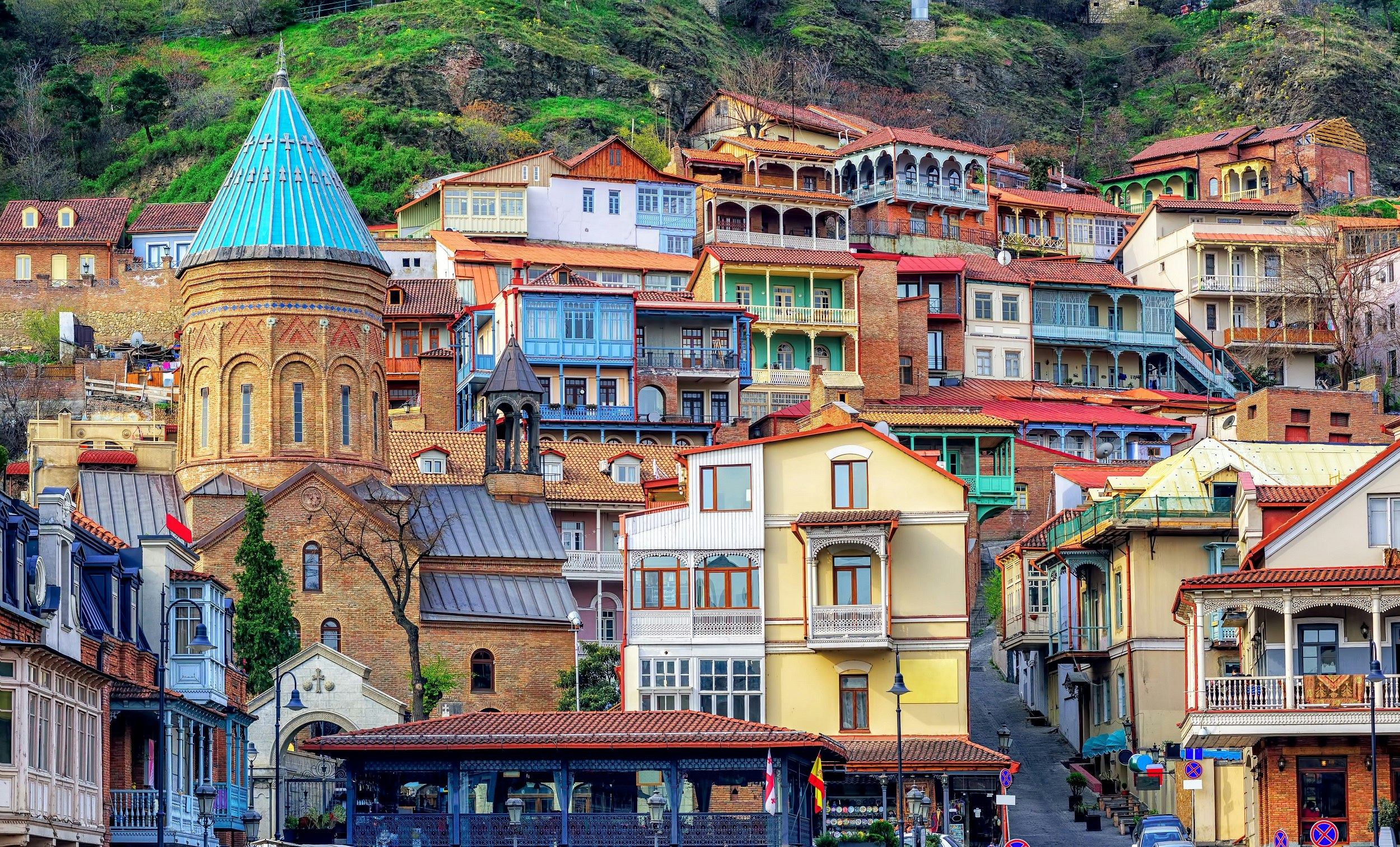
Getting around in Georgia's cities
Georgia's major cities have relatively well-organized public transport systems, though not much in the way of integrated public transport. Tbilisi is the only city with a metro; in the rest of Georgia, the primary means of transportation are buses and Russian-style marshrutky (minibuses).
Tbilisi's metro has just two lines, making it very easy to navigate. To explore the city, buy a Metromoney card from a metro-station ticket office and use it to pay for metro trips, city buses and marshrutky . City buses run on schedules displayed on digital boards at the bus stops, but m arshrutky run more often than buses, making them a favored means of transport for locals.
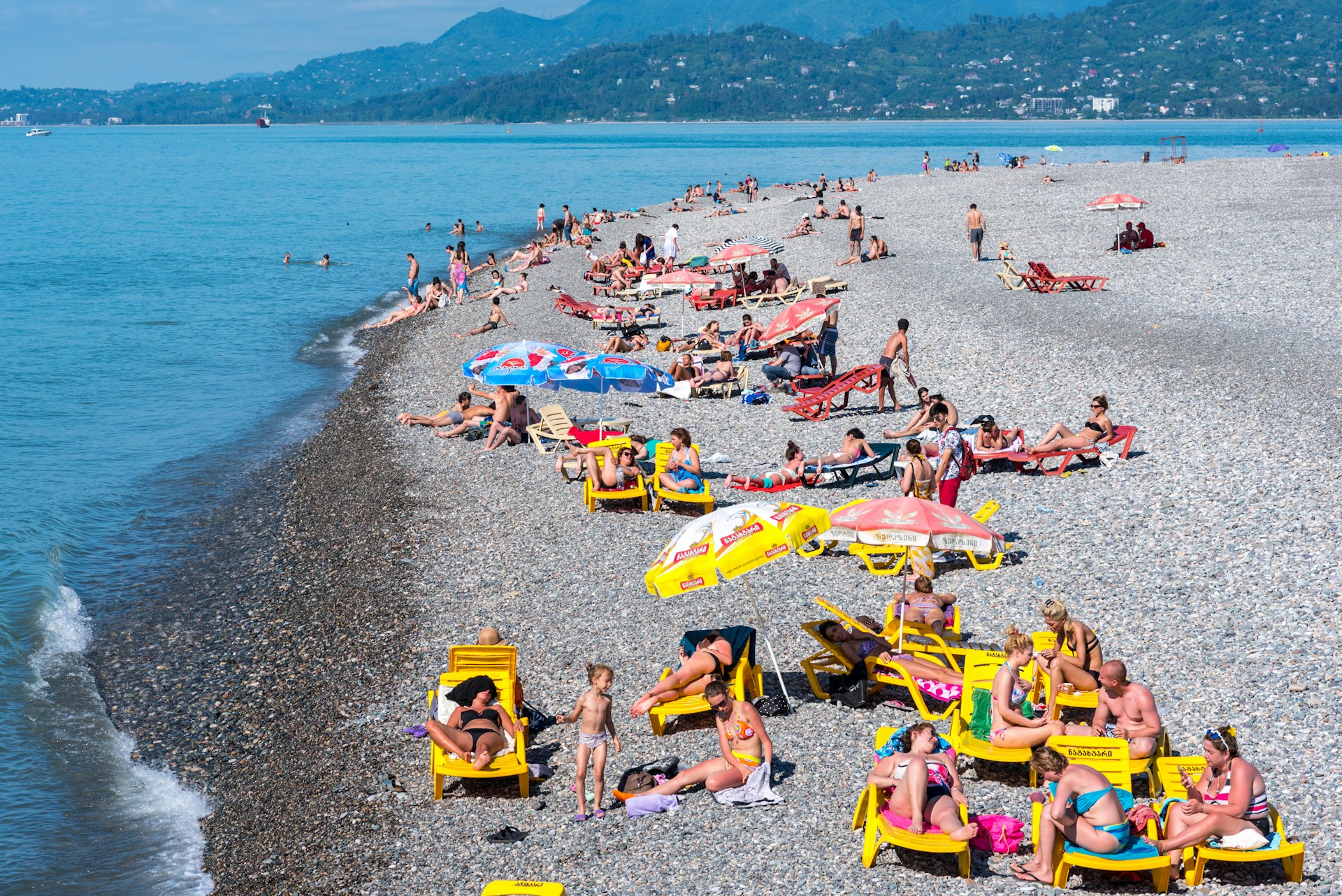
Traveling around Georgia
As well as being the backbone of public transport in cities, marshrutky are the most-used form of transport when traveling around the country. Services between major hubs run approximately every hour, depending on the destination. However, minibuses are the least comfortable option, with little legroom or space for luggage. In Tbilisi, Didube Bus Station has marshrutky going west, while vehicles going east depart from Navtlughi Bus Station.
Georgia also has a fairly well-organized train system, run by Georgian Railway . However, the network is only slowly being upgraded from Soviet times, and trains take longer to get to their destinations than marshrutky or buses. The only moderately fast train runs on the Tbilisi–Batumi route; book well ahead on this line in summer.

Money tips for Georgia
ATMs are widely available, easy to access and safe to use in cities and small towns in Georgia. The majority of businesses accept card payments, including hotels, convenience shops, restaurants, and pharmacies. However, if you're heading into the mountains or remote villages, be sure to take cash with you. US dollars and euros are the most useful currencies to carry as backup cash.
Travel costs in Georgia
Depending on how you choose to travel, Georgia can be either expensive or very budget-friendly. There are comfortable international hotel chains for those willing to spend a little more, but Georgia also has plenty of small boutique hotels, inexpensive guesthouses and apartments for rent. Tbilisi, Kutaisi and Batumi are particularly well stocked with accommodation. Renting a central apartment from Airbnb can cost as little as 100 GEL (US$35) a night, while a mid-range hotel room will cost from 40 GEL (US$15) upwards.
Georgia doesn't have any Michelin-star restaurants, but the national cuisine is feted as the best in the Caucasus, and there are plenty of opportunities to feast at all price ranges. For luxurious dinners, check out the best restaurants in Tbilisi or Batumi – dinner often comes with a spectacular panoramic city view. A meal in a high-end restaurant with a bottle of premium Georgian wine can set you back 100 GEL (US$35) or more, but eating at local restaurants will rarely set you back more than 20 GEL (US$7) for two courses.
The price of public transport in major cities can be as little as 1 GEL (US$0.34) for a local marshrutka ride. Tickets to travel around the country by marshrutka and bus vary depending on the destination; the ride between Tbilisi and Batumi costs around 30 GEL (US$10). Sightseeing is moderately priced as well – museum entry fees range from 3 GEL (US$1) to 15 GEL (US$5).

What to eat in Georgia
Georgian food is the original fusion cuisine , influenced by flavors from both Europe and Asia. The Georgian kitchen makes extensive use of local beef, lamb, pork and poultry, fresh fruits and vegetables, many kinds of bread, walnuts, cheeses and various spices that show the influence of neighboring Turkey and Russia. Vegetarians will find plenty of plant-based meals as well, though vegans may struggle with the widespread use of cheese.
Khinkali , boiled meat dumplings, are one of the national dishes of Georgia and a firm favorite meal for locals and visitors. Another must-try treat is khachapuri , a pizza-like cheese pie that is similar to a Turkish pide ; every region has its own version. Another staple is mtsvadi – grilled pork or beef chunks on a skewer – which plays an obvious nod to Russian shashlik , Turkish shish kebabs and Greek souvlaki .
To lighten your lunch or dinner, order pkhali, a simple but healthy tomato and cucumber salad with a walnut and vegetable paste. Spinach, eggplant, beetroot leaves and cabbage are also common ingredients in pkhali . As a snack to munch while exploring, seek out churchkhela , nuts preserved in a chewy confection made from grape juice.
Georgian wine is famous across the region, and it's well worth sampling local vintages from the Kakheti region when you come. Be sure to try qvevri wines, which are generally organic and unfiltered and have a very distinctive taste. For something stronger, chacha is a traditional Georgian spirit made from fermented grape skins, and it makes a nice break from the ubiquitous vodka. Last but not least, try Borjomi, a salty mineral water that was the beverage of choice for every Soviet leader from Lenin onwards.

Get to know Georgian culture
When traveling to a new country, it's always helpful to know a few words in the local language, and Georgia is no exception. The Georgian language has only around 4 million speakers, and knowing essential words such as gamarjoba (hello) and madloba (thank you) will get you a warm smile of appreciation from the locals.
Georgians are known for their hospitality. A guest for Georgians is "a gift from God," so don't be surprised if a stranger you met an hour ago invites you home for dinner with their family. If you choose to go, go hungry; the host will insist you eat every dish on the table and drink as much wine as you possibly can.
Georgia is still a traditional country when it comes to social mores. Very short skirts or dresses, off-the-shoulder tops, and skimpy or see-through clothes are likely to attract a stare. When entering churches, women should cover their heads and shoulders (some churches will provide scarves for this, but it's better to bring your own). Skirts and shorts (for men and women) should cover the knee. Men should also ensure shoulders are covered and ideally wear trousers rather than shorts.
You might also like: Tower-house trails: trekking in Georgia Tbilisi's top 10 experiences A guide to food in Georgia, the original fusion cuisine
This article was first published March 2020 and updated February 2022
Explore related stories
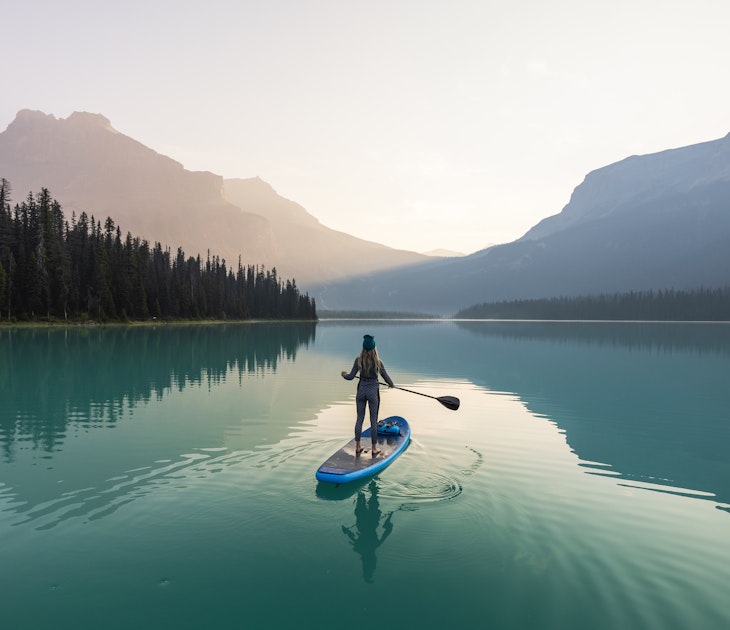
Destination Practicalities
Apr 29, 2024 • 5 min read
From outdoor summer excursions to spring festivals to winter fun, Canada merits a visit in any season. Here’s your full guide.

Apr 29, 2024 • 11 min read

Apr 28, 2024 • 7 min read

Apr 26, 2024 • 6 min read

Apr 23, 2024 • 6 min read

Apr 23, 2024 • 5 min read

Apr 20, 2024 • 9 min read

Apr 19, 2024 • 6 min read

Apr 17, 2024 • 6 min read
Wander-Lush
25 Practical Georgia Travel Tips for First-time Visitors
From pointers for planning the perfect itinerary to restaurant etiquette and staying safe on the roads, here are 25 essential Georgia travel tips to know before you go.
The first time I visited Georgia in 2017, I had absolutely no idea what to expect. I’m usually one to over-research and over-plan (can you tell?) – but on this particular trip, I was totally underprepared.
This mostly worked in my favour. Almost everything I experienced in Georgia was a kind of ‘pleasant surprise’: Transport, money, safety, food, accommodation, hospitality – everything just flowed.
- Also read: Tips for visiting the Caucasus region – religion, etiquette and cultural curiosities .
Things have changed in the interim and travelling in Georgia is a bit different to how it was even 5 short years ago. Having lived here for over a year now and travelled to almost every corner of the country, I still learn something new every day.
My job is to absorb information, and over time I’ve picked up some really helpful tips that I wish I had known on my first trip. With so many people looking to visit Georgia for the first time this year, it’s finally time to put everything down on one page.
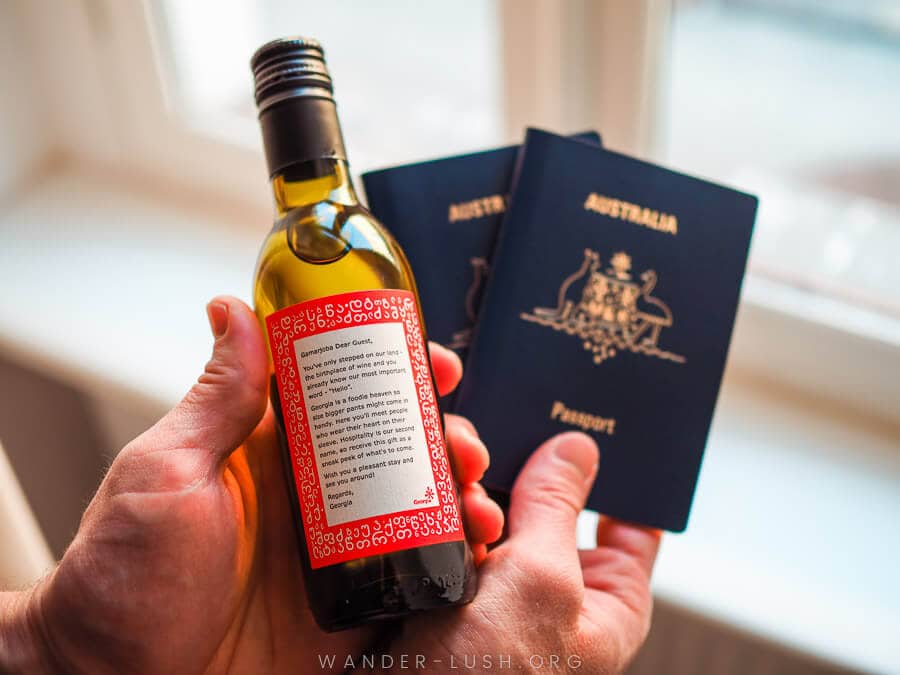
The last thing I want to do is give too much away or detract from your joy of discovering Georgia for yourself. If you’d rather come in blind like I did, stop reading this right now and go check out this list of amazing places to visit in Georgia instead!
If, however, you like to be prepared and you want to save yourself money, time and stress, then read on. Here are 25 things I think you should know before you visit the country of Georgia for the first time.
Please note: This post contains affiliate links, meaning I may earn a commission if you make a purchase by clicking a link (at no extra cost to you). Learn more.
25 practical Georgia travel tips for first-time visitors
1. late spring or fall is a nice time to visit georgia.
Georgia has a relatively mild climate outside of the high-altitude mountain regions. While there’s not exactly a definitive ‘best time to visit Georgia’, there is surely a period to avoid : Peak summer.
Summer is high season for international visitors. On top of that, when things start to heat up (and smog up) in Tbilisi , locals intuitively flock to the mountains or the villages. There’s increased pressure on transport and accommodation throughout the summer months as a result. On the Black Sea Coast, hotel prices go up considerably.
The nicest time to visit Georgia in my opinion is during shoulder season , either in late spring or in fall .
Once the spring rains clear (usually after Orthodox Easter ), temperatures are mild, wildflowers are blooming , and it’s not too crowded yet.
(Check the dates for the Eid al-Fitr holiday – this period does get busy with visitors from neighbouring countries.)
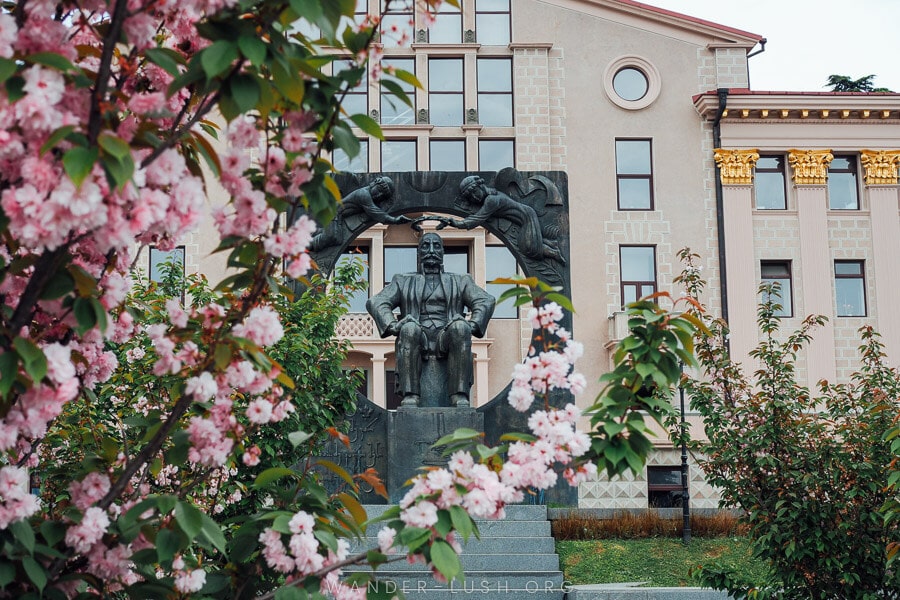
Fall or autumn (September to late October) is another great time to visit as the whole country is in a festive mood. The wine harvest, Rtveli , takes place around this time and if you’re organised, you can watch or participate in grape-picking in Kakheti .
In the capital, the Tbilisoba Festival is held in early October. Temperatures remain mild through to late October, and most mountain areas that are cut off in winter remain accessible until then.
Georgia has an extremely varied geography so temperatures and weather conditions vary a lot depending on where you go. Always do your research before you set out.
Key takeaway: Visit in late spring for hiking or fall for wine season. Avoid the summer months unless you’re going straight to the mountains. Consider winter for a Tbilisi city break but note that some mountain areas are inaccessible.
2. Top georgia travel tip: Buy a local sim card
A sim card is pretty much a necessity in Georgia if you’re going to be using taxis (see my next tip for more) or you need to navigate with Google Maps. It’s so easy and affordable to get set up with a local sim, there’s really no reason not to.
Magti is my preferred provider in Georgia for price, coverage and customer service. A sim card costs 10 GEL and the best deal is an unlimited 4G data package for just 9 GEL (2.50 USD) per week .
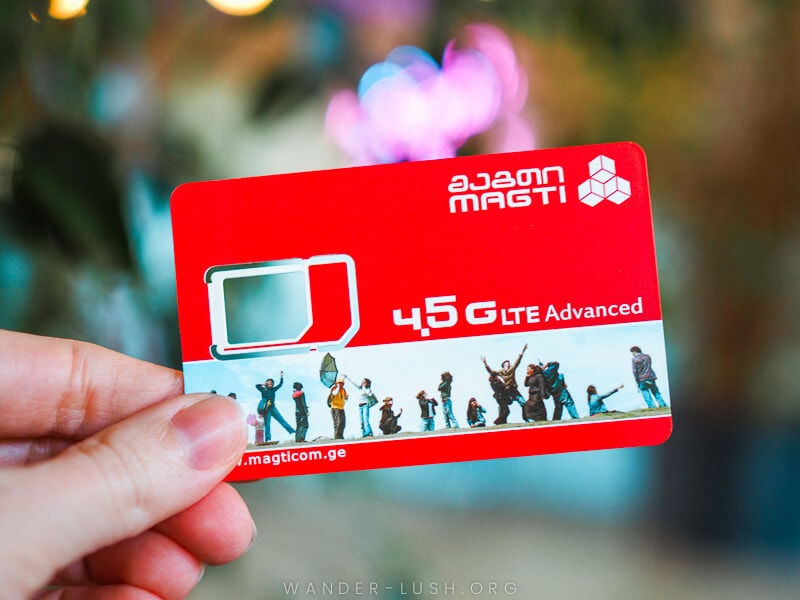
Don’t buy a sim card at the airport – prices are higher. Instead, wait until you get into the city and can visit a Magti branch. Registration is done for you at the shop (all you need is your passport) and takes all of 10 minutes.
A word of warning: Don’t always trust Google Maps in Georgia. Some streets and street numbers are way off. It’s pretty good for bus routes in Tbilisi, but TTC app is generally more reliable.
Key takeaway: Magti is the best mobile provider in Georgia. Don’t buy a tourist sim at the airport – wait to visit an office in the city. See my full step-by-step guide to buying a sim card and my recommended apps for Georgia.
3. Always use an app for taxis (and never take a taxi from the airport!)
Most regular taxis in Tbilisi and other cities do not have metres, meaning you need to negotiate the fare with the driver before you set off. To avoid confusion and overpaying, it’s much easier to use an app to book taxis.
Bolt is the most reliable local app and covers the major cities (there is no Uber in Georgia). It’s easy to use and in my experience, you never have to wait more than a few minutes for a driver. Prices are more than fair and you can tip the driver through the app if you want to.

If travelling from Tbilisi Airport to the city , use the airport bus 337, organise a private transfer with GoTrip , or use Bolt.
If travelling from Kutaisi Airport to Tbilisi, you can either use the train, use Georgian Bus or OmniBus, which are timed to depart as flights arrive, or book a private transfer . Find more info about travelling from Kutaisi Airport to Tbilisi in this transport guide .
Key takeaway: Always an app to book taxis – avoid hailing cabs on the street and never ever take a taxi from the airport in Tbilisi. See more tips for using taxis in Tbilisi and a comparison of the best apps.
4. Buy a transport card when you first arrive in Tbilisi
Tbilisi has a terrific public transport system that makes it very easy to get around the city. It has recently undergone a big overhaul – new minivans have been introduced, new routes planned, and most importantly, fares have doubled from 50 tetri to 1 GEL per ride .
As of May 2022, buses in Tbilisi no longer have coin machines . To use the buses, metro and cable cars in Tbilisi you first need to purchase one of two rechargeable transport cards.
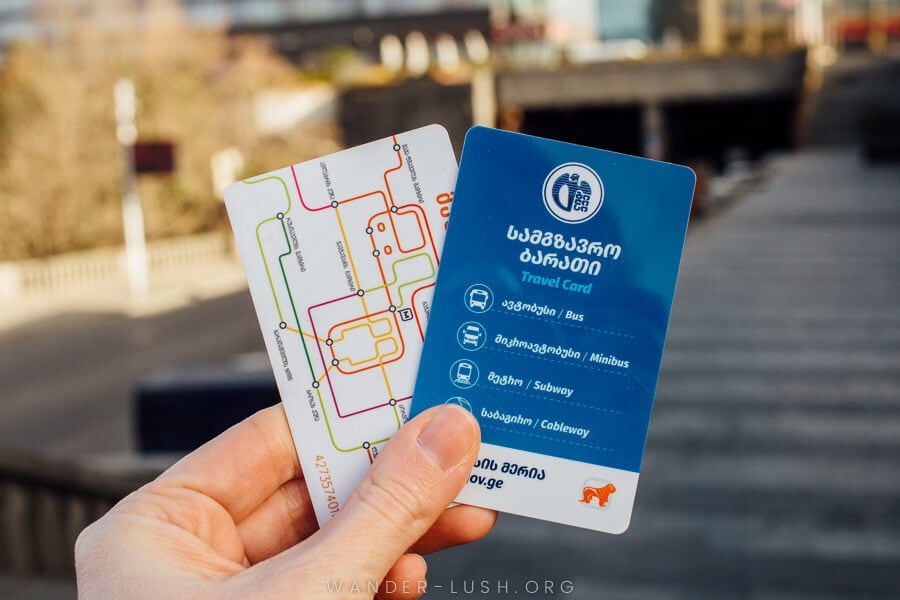
The white MetroMoney Card is used for single journeys (each journey is valid for 90 minutes), while the blue Travel Card is suitable for anyone who uses public transport more frequently. With this new card, you can purchase a daily, weekly or monthly unlimited pass (capped at 20 rides per day). Both cards cost 2 GEL and are available at the cash desk inside any metro station. Top up with cash using an orange pay box.
International bank cards also work on public transport – meaning you can tap your credit/debit card on the machine as you would with a transport card (just as long as your card has a chip). Note that the fare is higher, around 1.50 GEL per ride versus 1 GEL.
Key takeaway: If you plan to use public transport in Tbilisi, buy a rechargeable MetroMoney or Travel Card when you first arrive. You can also use the MetroMoney card for buses in Batumi. In Kutaisi and most other smaller cities/towns, buses still have coin machines so you can simply buy a single ticket onboard.
5. Be conscious of road safety
The driving style in Georgia is pure madness. Speeding, filtering to create a new lane of traffic where there isn’t supposed to be one, and overtaking around blind corners on single-lane mountain roads are some of the biggest issues.
It would be funny if it wasn’t so serious: Georgia has a terrible track record with road accidents, especially on poorly maintained mountain roads. Things are improving gradually, but it’s something every traveller should be conscious of.
I personally don’t have the stomach for long marshrutka rides anymore (even short taxi trips in Tbilisi make me anxious). When booking day trips or organising transfers, road safety is something that should always be front of mind.
Key takeaway: Be hyper vigilant when it comes to road safety in Georgia. Don’t opt for the cheapest day tour as these companies often skimp on safety precautions. Avoid travelling on the roads after dark and never get into a car with a driver who you suspect has been drinking.
6. Use GoTrip for longer road journeys
One of the biggest mistakes people tend to make on their first visit to Georgia is thinking that because the country is so small, it will be fast and easy to get around. In truth, ‘public transport’ is still quite basic here and it can take a long time to get from A to B. Trains in particular are quite slow (with the exception of the Tbilisi Batumi high-speed train and the trains to Poti and Zugdidi ).
You will come to embrace the clunky marshrutka van as all travellers do, but know there are other (more comfortable and safer) transport options available that won’t break the bank.

GoTrip.ge is one of my absolute favourite services in Georgia. I can’t tell you how many times this platform has saved me. Essentially it’s a long-distance Uber for private one-way, round-trip or multi-day transfers – input your destination/s then choose a driver and vehicle based on their credentials and star rating.
The price is fixed when you book so there’s no need to negotiate the fare, and you can stop wherever you want, whenever you want along the way. Fares are very reasonable and up to 40% cheaper than if you were to find a driver on the street. I especially love GoTrip for journeys such as the Georgian Military Highway where there are lots of places to sight-see along the way.
Visit the GoTrip.ge website and use their Trip Planner to explore routes around Georgia.
Key takeaway: Consider a car and driver for longer journeys and dangerous mountain roads, even if it means paying a bit more. Avoid using marshrutka vans for very long trips, and try to break up long road journeys with an overnight stop.
7. If you hire a car, use a local agent
Georgia is extremely affordable but some things are disproportionately expensive, car hire being one of them. If you want to get off the beaten track by driving around Georgia , the best option is to go through a local agent rather than a brand-name company.
Local Rent is my favourite platform for booking cars in Georgia. They work exclusively with local agents and offer great prices, as little as $34/day for a 4WD. Insurance is typically included and most agents don’t ask for a deposit or credit card. Just note that the car might be a bit shabbier than you’re used to. Because these agents don’t have offices, they’ll even throw in free delivery to your address.
Check availability and prices for your travel dates here on Local Rent .
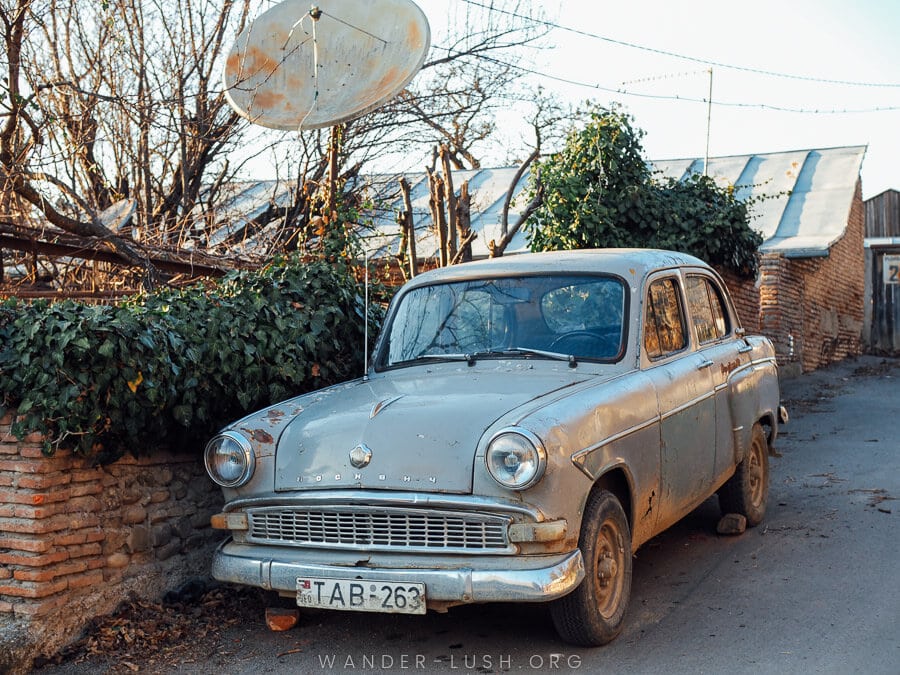
Remember what I said about road safety and exercise a higher level of caution than normal when you’re driving in Georgia. Most highways are in good nick and there aren’t too many curly road rules to wrap your head around – the main thing is to watch out for other drivers. Here are my insights into the local driving style and top tips for self-driving.
Key takeaway: Avoid renting a car through the usual channels and use a local agent instead. Local Rent is the best platform to find an affordable rental car in Georgia. BUT only hire a car if you’re a confident and experienced driver who doesn’t get spooked by erratic or aggressive drivers.
8. Always carry some cash
While 99% of restaurants and hotels in the city take credit card, smaller cafes, markets, taxi drivers (if you’re using them in rural areas) and smaller guesthouses only accept cash payment. Lari is the official currency in Georgia and you should always carry some on you – especially if you’re headed to the regions or the mountains.
Avoid the currency exchange at the airport – instead, use one of the ATMs in the arrivals hall (there are several) to withdraw GEL. All ATMs in Georgia accept Visa and Mastercard, while Bank of Georgia takes AMEX. Withdrawal fees are usually around 2 GEL (some charge nothing) but you’ll need to check with your issuing bank for other charges. Basisbank and Cartu Bank ATMs have higher withdrawal limits.
Don’t mistake a paybox for an ATM – payboxes are the jukebox-like plastic boxes on every street corner used for paying bills and other services. They don’t dispense cash. ATMs are everywhere on the street and in malls (but not in convenience stores). For peace of mind, it’s advisable to use the ATMs inside bank branches when you can.
Key takeaway: Card is accepted almost everywhere in the cities but it’s handy to have some cash for smaller purchases. ATMs are ubiquitous throughout Georgia but you should always carry cash with you when travelling in rural areas.
9. Understand the tipping culture
Tipping is not part of the culture in Georgia and it is not considered mandatory. But tipping is now expected in most service industries , especially in Tbilisi, and particularly when it comes to tourists.
The common-sense principle that you should only tip if you’re happy with the service applies. Personally I almost always tip because I understand that wages are low (40-60 GEL/day is the average for a restaurant server).
You’ll notice that many restaurants, bars and cafes add a 10% ‘service fee’ onto the bill (on top of 18% VAT). This almost never goes to the server, though – it’s used for other purposes, such as replacing broken plates and glasses.
If you want to be sure your server receives a gratuity, leave an extra tip in cash and try to hand it to them personally. I usually tip 10% for servers and 1-3 GEL for Bolt drivers.
Key takeaway: Tipping is not ‘the norm’ in Georgia, but it is hugely appreciated. If you’re happy with the service, tip your restaurant/cafe server in cash. Remember that the 10% ‘service charge’ added to your bill does not normally go to the waiter.
10. Tourist scams and corruption are rare
As long as you exercise common sense, Georgia is an extremely safe place and Tbilisi is a very safe city. Crime is very rarely targeted at tourists.
Scams do happen on occasion, though. Avoid eating or shopping in overly ‘touristy’ areas (such as the pedestrianised part of Aghmashenebeli Avenue in Tbilisi), and always ask for the price first before committing to purchase something from a market or food vendor. The biggest culprit is taxis and the best way to safeguard against this is to use an app in the cities and book drivers through your guesthouse when you’re in towns or rural areas.
There is one other perennial tourist scam in Tbilisi and Batumi to watch out for. A group or individual, either someone you meet on the street or through a dating app, will invite you for a drink at a local bar then ask you to foot the insanely overpriced bill. (This happened to friends of ours and they ended up getting fleeced for thousands of dollars.)
Be cautious when accepting invitations from strangers and if you do, meet at a place of your choosing. Avoid restaurants or especially bars that are not on Google Maps . Unless they’re brand new, if they don’t have a listing or past reviews you can safely assume this is a red flag.
A few decades ago Georgia embarked on a national project to stamp out corruption (notice how every police station is made of glass?). It mostly worked and today, corruption in all forms is extremely rare , especially where tourists are concerned. It’s not something you have to be wary of.
Key takeaway: Exercise a normal level of vigilance, especially in the big cities, but know that petty crime, scams and corruption targeted at tourists is extremely very rare in Georgia.
11. It’s (mostly) safe to drink the tap water
Can you drink the tap water in Georgia? This is always the subject of debate among expats. Georgians love their spring and mineral waters (e.g. Borjomi ) and for the most part, tap water is of a similarly high quality. Nine times out of 10 when you’re travelling in rural areas and small towns it will be more than safe to drink the tap water.
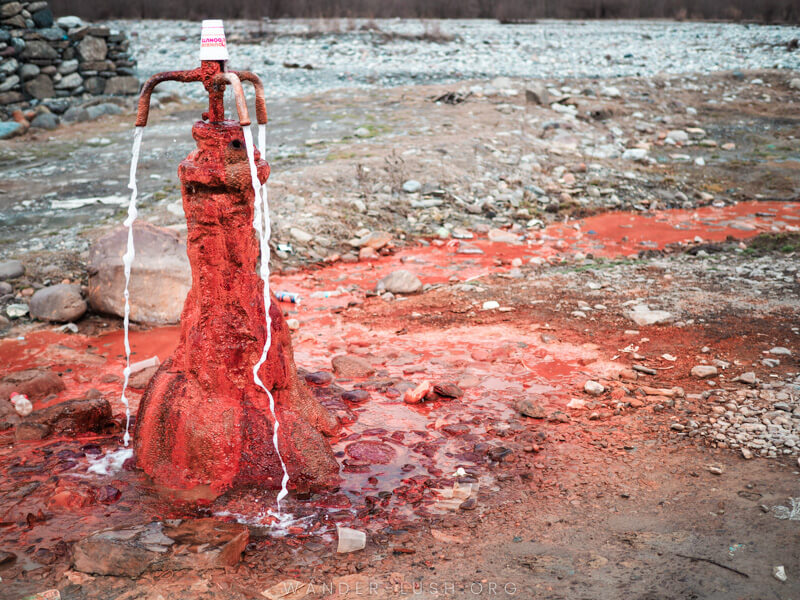
Many people choose not to drink the tap water in Tbilisi. In this case it’s more of an issue with the pipes than the water itself. If you’re staying in an old building, the water might be tainted with residue from old pipes. In all likelihood it’s still safe to drink but it might not sit well with you.
Key takeaway: Georgia is blessed with mountain springs and mineral waters – always carry a reusable water bottle when you’re travelling so that you can fill up at these natural springs. For the most part, tap water is safe to drink in towns and cities but some people choose to avoid it in Tbilisi. Bottled water is extremely affordable.
12. Understand that the days start late
Tbilisi in particular wakes up late and stays up late. Even in summer when the sun is out before 5am, if you’re on the street before 9, you can hear a pin drop. Banks open at 10am but many people start work mid-morning and continue late into the evening.
Don’t wake up early and expect everything to be open. Georgia doesn’t have a strong breakfast or brunch culture , so cafes in Tbilisi rarely open before 10am ( see a list of early risers here ). Shops, museums, galleries and other attractions tend to open between 10am and 11am. Peak hour falls later, and public transport is always very busy around 7pm on weekdays. Plan your days accordingly.
Key takeaway: Whenever possible, take breakfast at your accommodation (especially when you’re staying in a smaller town or village). Restaurant opening hours are sometimes flexible so it’s best to arrive 15-20 minutes after advertised opening time to be safe. Stick to outdoor activities in the mornings, especially in Tbilisi, and save your museums for the afternoon.
13. Take listed opening hours with a pinch of salt
As I mentioned earlier, Google Maps is far from 100% reliable in Georgia . Sometimes you’ll roll up to an address expecting to find a cafe there and zip, nada, nothing! (This still happens to me fairly often – sometimes I just can’t see the place, other times it’s moved.)
Business owners often neglect to update their opening hours or addresses on Google Maps, so it’s better to check on Facebook or Instagram instead. If I’m visiting a venue for the first time, I will always send a message on social media the day before to check they’re actually going to be open.
When a cafe or restaurant goes out of business, sometimes this doesn’t get updated either – so you’ll find places that are marked as ‘open’ on maps but are actually long abandoned, and other places marked as ‘permanently closed’ that are actually open.
In addition, lots of venues will open up later than their listed hours indicate or close the kitchen for the day at short notice (especially if the water or power is out). This is just something you have to get used to. Always have a Plan B up your sleeve just in case!
Key takeaway: Don’t rely on Google Maps – businesses are much more likely to update their Facebook or Instagram pages if they close down, move, or if their hours change. If in doubt, message ahead to double check.
14. Don’t rush through Tbilisi
If you’re starting or ending your trip in the capital, you might think a night in Tbilisi will suffice. While it’s true that you can see a good deal of Tbilisi’s ‘must-sees’ in a day, if you want to savour the city, you’ll need more time than that.
Tbilisi is the capital of course, but it doesn’t necessarily feel like it. Where other big cities are anonymous and cookie-cutter, Tbilisi has a very unique look and atmosphere that I can’t really compare to anywhere else. This has long been the most multicultural city in the region and all that wonderful diversity still shines through today.
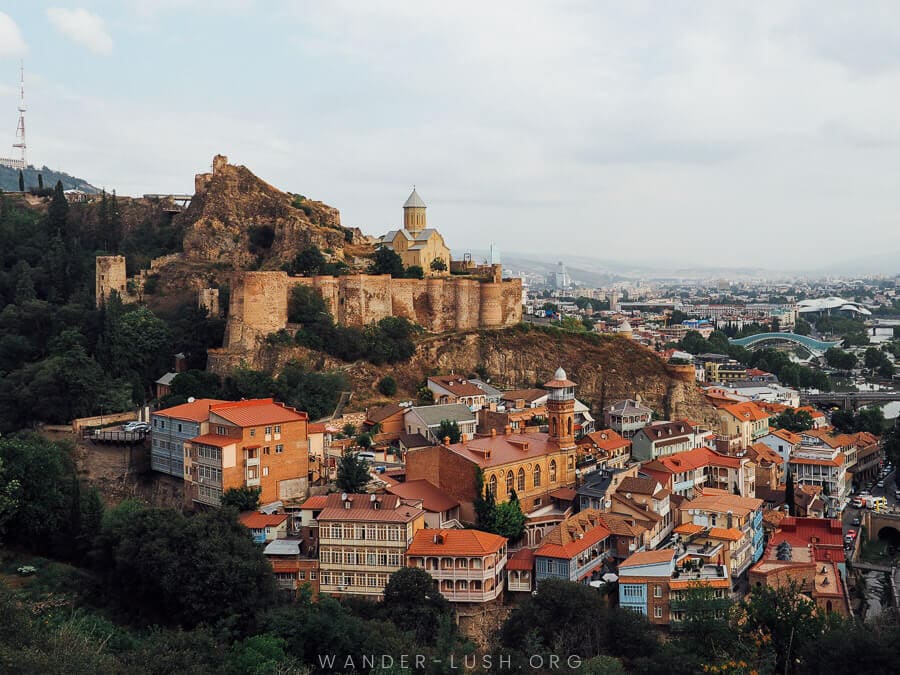
Aside from the historical landmarks, museums and important churches, there are lots of offbeat things to do in Tbilisi , from visiting Stalin’s old printing press to taking an urban hike for a city view . On top of that, there are squillions of cafes, galleries , cute boutiques and wine bars that you can happily spend a day floating between.
Some of Tbilisi’s most interesting neighbourhoods, especially Sololaki, Abanotubani and Chugureti, should be explored at a slow pace by foot. Consider joining a free or paid walking tour for a more in-depth look at the city’s heritage architecture or Soviet history .
Plus, you’ll want at least six meals in Tbilisi so that you can sample a good range of the city’s best restaurants .
Key takeaway: Two to three days is the minimum amount of time you need in Tbilisi if you want to do it justice. If you love cities or you prefer slow travel, you can quite easily fill in 5-plus days in Tbilisi.
15. Remember to pack your bathers for the sulfur baths
I know this is very specific, but a trip to the sulfur baths is a Tbilisi experience most visitors want to have – just make sure it’s memorable in the right way!
Everyone goes nude at the public baths, but if you’re booking a private room with a Kisi massage/scrub treatment, it’s advisable to wear a bikini (women) or trunks (men).
Key takeaway: Pack your swimmers for Georgia, even if you’re visiting in winter. Read more about bathhouse etiquette in Abanotubani here.
16. Stay at family guesthouses when you can
Guesthouses are by far the most popular type of accommodation in rural Georgia. When you stay at a guesthouse, you’re spending the night in a family home – a bit like a homestay .
Home-cooked meals and home-made alcoholic beverages are part and parcel of the guesthouse experience. More than that, guesthouse host families are like travel agents who can organise taxis, tours and tickets, phone ahead to save you a seat on the next marshrutka, call the local restaurant to book you a table… And just about anything else you might need.

I swear by guesthouses, especially in small villages where you might need some help with travel logistics. It’s also a really nice way to meet a family and make a local connection , and to link up with other travellers too.
Needless to say this is one of the easiest ways to show your support for small business and community tourism in Georgia.
Key takeaway: When in doubt, book a family run guesthouse. Not only do they offer affordable accommodation and home-cooked meals, they can help you with all kinds of travel logistics too. Most can be booked online through Booking.com but many only accept cash payment. See here for a full list of my favourite guesthouses around Georgia.
17. Remember that Georgia is a good place to treat yourself
As soul-nourishing as guesthouse hospitality is, it’s nice to treat yourself to something slightly more luxurious once in a while. The good news is that Georgia – a budget-friendly destination by any measure – has a stellar range of high-quality accommodations that are extremely well priced.
In Georgia, you can spend the night in a historic wine chateaux in Kakheti , settle into a ski-in luxury mountain cabin in Kazbegi, go glamping in the heart of the forest in Racha, or curl up in a high-rise boutique hotel overlooking the Black Sea for a fraction of the cost of something similar in Western Europe (or even Eastern Europe for that matter).
It’s within almost every traveller’s budget to splash out on a nice hotel room or a private tour. If you’re supporting a local business at the same time, then why not.

The only area where you don’t really need to fork out extra cash is food . In my experience, a higher price tag rarely equates with better tasting food or more attentive service – so you’re safe to stick to the cheap (or mid-range) and cheerful when it comes to restaurants.
On a serious note: Don’t come to Georgia expecting everything to be dirt cheap or worse, for things to get handed to you for free. No doubt you’ll be the recipient of Georgia’s legendary hospitality at some point in your travels, but remember to be gracious and try not to take advantage of people’s generosity.
Key takeaway: Don’t be afraid to book that beautiful accommodation or private tour if it will enhance your experience. There are other areas where you can save money, such as on food and alcohol.
18. Make sure you do at least one hike
Even as a bonafide non-hiker, I can say this with absolute confidence: You must get out on foot in the mountains, even if it’s just for a half-day trek.
Many people come to Georgia for the sole purpose of hiking. The Mestia to Ushguli trail in Svaneti is arguably the most popular multi-day hike, but there are trails in every national park. Black Rock Lake in Lagodekhi, the Truso Valley near Kazbegi and St Andrews Trail near Borjomi are all great alternative options. If you’re serious about hiking, have a look at the Transcaucasian Trail , a route-in-progress that will soon connect the whole South Caucasus region.
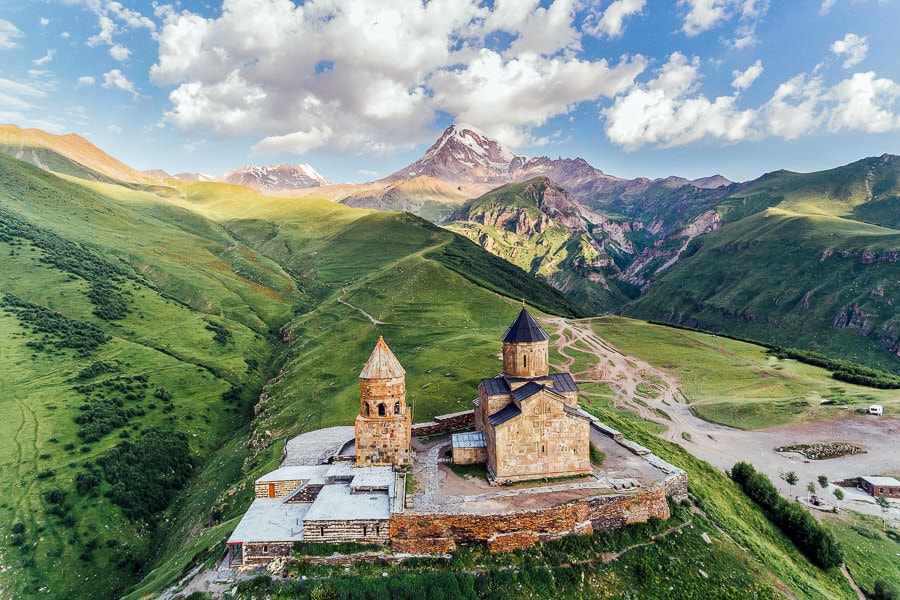
Why hike? There’s no better way to connect with the mountain landscapes that make Georgia so special. It’s not just the scenery, but the cultural diversity and way of life in the mountains that makes hiking a must-do.
Key takeaway: Bring your comfy shoes because a hike in Georgia is mandatory. The Gergeti Trinity Church hike is easily the best half-day trek in the country.
19. Look beyond the mountains
We all know Georgia has majestic mountains, but did you know there’s also mud volcanoes, rainbow hills, volcanic plateaus and primordial Colchic forests in Georgia – sometimes all within the same region?
For a country of its size, Georgia is incredibly diverse in terms of the climate and landscape. Wake up in the mountains, off-road through a semi-desert then eat dinner on a black-sand beach – it’s possible in Georgia.

The Greater Caucasus are obviously a must, but I urge you to explore some of the other landscapes and outdoor adventures Georgia has to offer as well. Some of the most rewarding experiences this country has to offer can be found in the more remote, rugged corners: Start by looking at Vashlovani, Lagodekhi, Machakhela and the newly UNESCO-listed Colchic Forests and Wetlands for inspiration.
By the same token, don’t limit your horizons to the big three cities. Georgia has some incredible smaller cities and regional towns that are every bit as rewarding. My favourites are Gori , Telavi , Oni and Zugdidi .
Key takeaway: The best Georgia itineraries sample as many different landscapes as possible. This will help you appreciate the contrasts – and make those mountains seem all the more stunning. Here are 35+ places to visit in Georgia to get you started.
20. Understand the dress code for visiting religious sites
There is a strict dress code for visiting Orthodox churches, monasteries and convents in Georgia. The same applies for mosques.
For men, this means covered knees (no shorts) and covered shoulders (no singlet tops). Women must cover their shoulders and knees as well, and cover their hair. Some churches in rural areas require women to be wearing a long skirt rather than fitted pants. In my experience, a long jacket that’s zipped up will do.
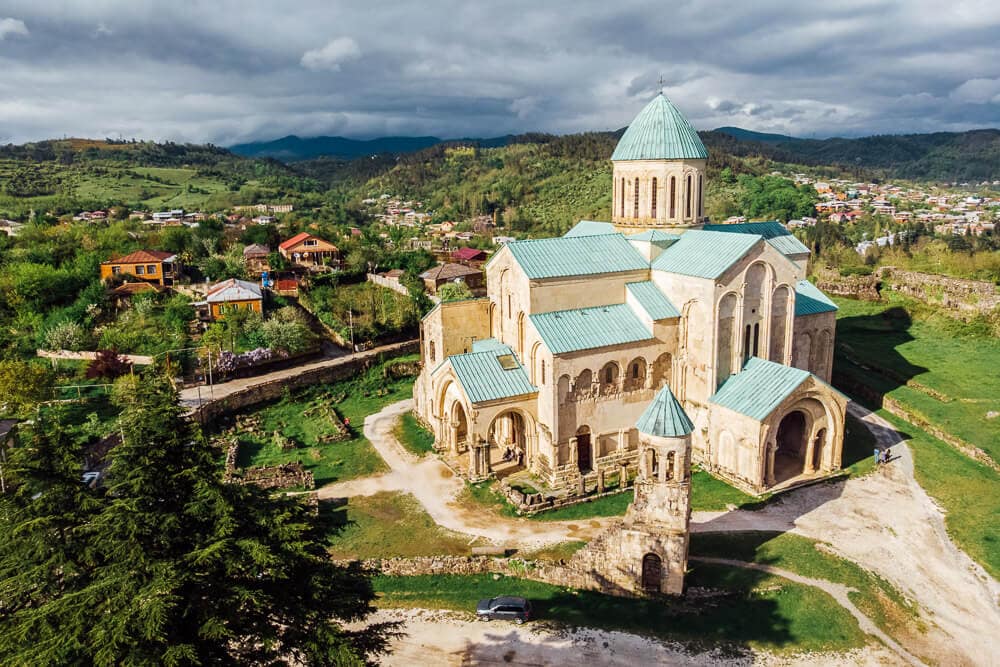
Ninety-nine percent of religious sites have wrap-around apron skirts and headscarves that you can borrow at the door free of charge. However, I always recommend dressing appropriately if you know you’re going to be visiting a church or monastery. For hygiene reasons, I suggest women carry their own light scarf for their hair.
Remember that many tourist sites such as Vardzia and Uplistsikhe have chapels or churches so you’ll need to dress appropriately if you want to visit this part of the complex.
Although there are no hard and fast rules about how to dress outside of religious settings, Georgia tends to err on the conservative side in this department. It’s unusual for men to wear shorts or for women to wear microskirts (except in Batumi), for example. When visiting rural areas and small villages, it’s better to cover up to avoid making other people feel uncomfortable.
Key takeaway: If you’re going to be visiting lots of religious sites, make sure you pack appropriate attire. Ladies, pack a lightweight cotton scarf and always carry it with you. Try to dress more conservatively in rural areas. See here for my full Georgia packing list and what to wear in Georgia.
21. Watch out for monastery fatigue
Speaking of visiting religious sites – monastery fatigue is real, and it’s something many travellers experience. I have no idea just how many monasteries and churches there are in Georgia, but it’s probably in the tens of thousands. Kakheti in particular has dozens and dozens of splendid monuments to see.
I’ve been here long enough that I can start to appreciate the little design details and historical quirks that set each one apart. But on my first few visits to Georgia, I didn’t know enough to appreciate the differences so everything just started to blend into one.
Something important to mention here is that monasteries are much more than just religious sites: They’re equally historical sites. Georgian culture, literature, music, food, wine – the list goes on – is all so interwoven with the church, it’s impossible to find one without the other. When you visit a monastery, you’re not just learning about religion, you’re immersing yourself in history and culture as well. Where else in the world but Georgia would you visit a monastery to do a wine tasting!?

My advice is to pace yourself – don’t pack too many monasteries/churches into one day, and try to split them up with other activities (in Kakheti, wine tastings do the job perfectly). Look for something memorable, maybe a distinctive icon, to help you differentiate each place.
And be selective about the ones you do visit – don’t feel pressured to visit a monastery you’re not interested in just because someone says you should. (Unless it’s me telling you, because I am very selective about the monasteries I recommend!)
Key takeaway: Most monasteries have little or no signage beyond a basic information plaque so if you want to gain an appreciation (and you don’t speak enough Georgian to converse with the priest), either go with a guide or read-up as much as you can before your visit. This will help you better appreciate each monastery and church that you visit and keep you feeling motivated to see more.
22. Don’t skip the wine region
Cultivating grapes, fermenting wine and raising a glass of Saperavi at a Supra feast are all fundamental aspects of Georgian identity. Just as you can’t visit the country without seeing a few monasteries, no trip to ‘the cradle of wine’ is complete without a jaunt through the wine region.

I say ‘the’ wine region, but what I really mean is a wine region. Kakheti might be the biggest, most productive and most popular wine route, but there are vineyards all over Georgia . Maranis (cellars) in Imereti (outside Kutaisi ), Upper Adjara ( a day trip from Batumi ) and Racha all showcase traditional winemaking methods.
You don’t go to a winery just to drink wine – you also go to learn about Qvevri technology , Georgia’s 8000-year tradition of fermenting grapes underground in clay vessels . Even if you don’t drink alcohol or you have no interest in wine, it’s an opportunity for a hands-on lesson in Georgian culture.
Key takeaway: Kakheti is a great choice for a wine tour, but remember there are vineyards and cellars all over Georgia. Wherever you go, be sure to visit a mix of commercial and small family wineries that use Qvevri techniques so you can observe the traditional methods.
23. Come hungry!
Is it rumours of ‘soup dumplings’ as big as your hand and ‘cheesy bread’ topped with melted butter and egg yolk that are drawing you like a magnet to Georgia? Don’t worry, you wouldn’t be the first traveller to be lured here by their stomach.
It doesn’t take long to realise there’s way more to Georgian cooking than just Khinkali and Khachapuri – though both those dishes really are very good.

Marigold, blue fenugreek, sour plum, kiwi, pomegranate, homemade cheese, tandoor bread and the best tomatoes on earth – it’s all waiting for you in Georgia, and in combinations and concoctions you’ve likely never encountered before.
The food here continues to blow me away every time I eat out, especially when I’m travelling in the villages. Unexpectedly fresh, always packed with flavour and fiercely regional, Georgian must be one of the most underrated cuisines on the planet.
Just be strategic with your meals! It’s not a bad idea to skip breakfast so that you can concentrate on lunch and dinner, the two biggest meals of the day traditionally.
Key takeaway: Get your fill of Khachapuri and Khinkali then look beyond the typical dishes to discover the wonderful world of Georgian cuisine. Tbilisi has many restaurants that specialise in regional dishes but it’s even better if you can taste them in-situ. Samegrelo, Upper Adjara and Racha are my personal favourite foodie destinations in Georgia.
24. Never eat Khinkali with a knife and fork
This one is fairly self-explanatory. There’s only one way to eat Khinkali and that’s with your fingers – it’s the only way to ensure you don’t miss a single drop of that delicious meat juice!
There are of course some exceptions: Non-meat Khinkali is sometimes eaten with cutlery, and you can use the tip of your fork to harpoon the meat dumplings if you don’t want to get your hands dirty.
Key takeaway: Put that knife and fork away. Read more restaurant etiquette tips here, and don’t forget to download a free copy of my Tbilisi Khinkali Guide so you know where to find the best dumplings!
25. Learn a bit of Georgian before you arrive
Someone once told me that state, religion and language are the holy trinity in Georgia.
The Georgian language has monumental significance as a symbol of cultural identity and sovereignty. Unlike some other post-Soviet countries , Georgia held onto its tongue through thick and thin. People are incredibly proud of their language and everything it represents.
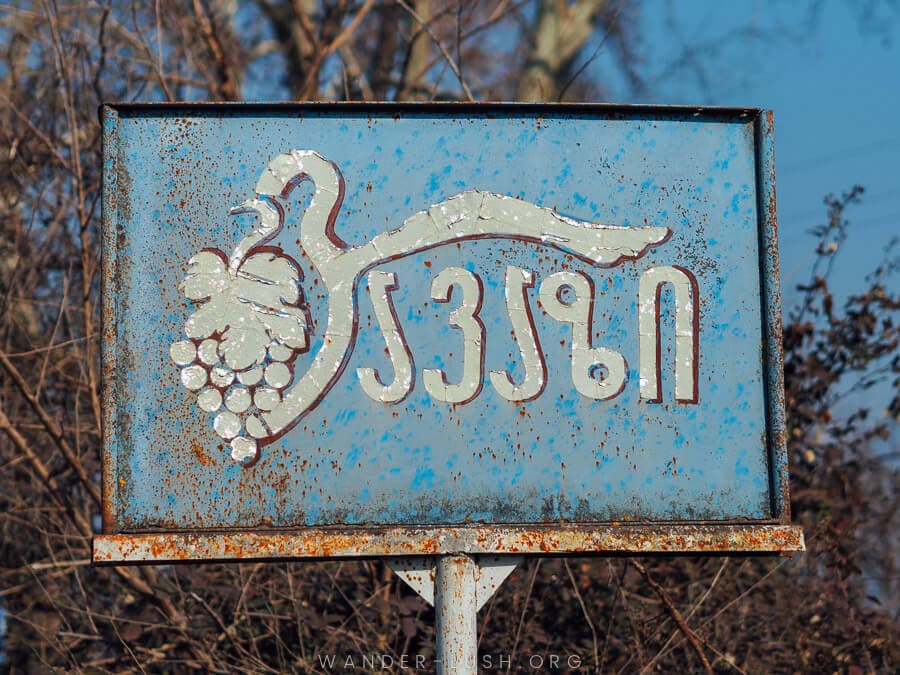
Learning a few words of Georgian will not only help you interact with people and break the ice, it’s also a nice way to demonstrate your respect for the country and the people. Believe me when I say that locals will hugely appreciate you making even the smallest effort.
As someone who’s spent the past year or so trying to learn Georgian, I can tell you it’s very challenging. Learning the characters of the Georgian alphabet is a great place to start. Helpfully, every letter is ‘pure’ and pronounced the same way no matter how it’s written or where it falls in a word. Once you know your k from your k’ , you’ll be surprised how much you can read and understand.
Georgians are normally very open (beneath that sometimes hard exterior) and happy to chat about any topic. But it’s a good idea to warm up to each other’s company before you start talking politics or religion . By the same token, don’t be surprised if someone you just met asks you your age, marital status and whether or not you have children (and if the answer to the last one is ‘no’, they might weigh in with their opinion on your life choices!). Personal questions are fairly common , don’t be surprised if people pry. But money is rarely discussed.
Key takeaway: English is widely spoken in Georgia but it pays to learn a bit of the language. Use an app such as Write Georgian to master the beautiful characters and watch free YouTube tutorials such as this one to practice basic conversational Georgian.
What did I miss? Do you have any extra Georgia travel tips to share? Let me know in the comments below.
Georgia essentials
Here are the websites and services I personally use and recommend for Georgia. Check out my full list of travel resources for more tips.
FLIGHTS: Search for affordable flights to Tbilisi, Batumi or Kutaisi on Skyscanner .
TRAVEL INSURANCE: Insure your trip with HeyMondo , my preferred provider for single-trip and annual travel insurance (get 5% off when you book with my link).
SIM CARD: Magti is my preferred provider, with prices starting from 9 GEL/week for unlimited data. See this guide for all the details about buying a Georgian SIM card .
AIRPORT TRANSFERS: Most flights into Georgia arrive in the early hours. For ease, pre-book a private transfer from Tbilisi Airport to your hotel (from $17) or from Kutaisi Airport to Tbilisi (from $90) with my partners at GoTrip.ge.
ACCOMMODATION: Booking.com is the most widely used platform in Georgia. Use it to find family guesthouses, private apartments, hostels and hotels around the country.
CAR HIRE: Find a great deal on a rental car in Georgia – use the Local Rent website to book through a local agent (prices start from $20/day).
DAY TRIPS & CITY TOURS: Use Viator or Get Your Guide to browse a range of day trips and city tours. For off-beat programs, I recommend Friendly.ge (use the promocode wanderlush for 10% off). For in-depth day trips to Georgia’s wine regions, I recommend Eat This! Tours (use the promo code wanderlush for 5% off).
PRIVATE TRANSFERS: GoTrip.ge is a terrific service for booking a private professional driver and car for the day. Use it for A-to-B transfers, a customised round-trip itinerary, or a multi-day trip. You can stop wherever you like for as long as you like without the fixed price going up.
NEED SOME HELP?: Need feedback on your itinerary or personalised travel tips? I offer a one-on-one consultation call service for Tbilisi and Georgia. More information and bookings here .
You might also be interested in…
- The ultimate Georgia itinerary : Four detailed & custom-designed itineraries
- Georgia Travel Guide : All of my 200+ posts plus my top travel tips
- Georgia travel tips : 25 essential things to know before you go
- Places to visit in Georgia : 50+ unique & underrated destinations around the country
- The best things to do in Tbilisi : Favourites, hidden gems & local picks
- 35+ best restaurants in Tbilisi : Where to eat Georgian food
- 15 best day trips from Tbilisi : With detailed transport instructions
- The best time to visit Georgia : Month-by-month guide to weather, festivals & events
25 Comments
Hi Emily, First of all, I would like to thank you for sharing so many updated tips for a great discovery of Armenia and Georgia. Your website is definitely my 1st source of information for my oncoming trip to both countries. From what I read on your website, you are away visiting Albania, etc at the moment, but could you possibly tell me if there is a train between Tbilisi and Yerevan on Monday, Oct 23. With the changes in the timetable, it is difficult to know for sure which is which between odd and even days. I asked the hostel people in Tbilisi, but they did not bother to check and said they did not know… Looking forward to your answer. Have a great time in the Balkans, Guy (France)
Hi Guy, the timetable does indicate that there is a train on October 23 (Tbilisi to Yerevan). If you are in Tbilisi now, I would pop down to the station to check and buy tickets if you can.
Thanks very much for the well wishes. Safe travels!
Mrs Emily, I would like personally to thank you for this amazing blog. It has really helped me organise my trip to Tbilisi this November!
Thanks Eirini! So happy to hear that. Have a wonderful trip to Georgia!
Wow, this is a bunch of information…. It is not easy to find good information about Georgia as it is still an underestimated holday destination .
Thanks Jos! Glad you found it helpful.
Hello Ms. Wander Lush, your blogs have been my BIBLE for planning my trip to Georgia this September. Thank you for all the information for any possible question I had in mind. Really looking forward to the holiday!
Thanks Vinodini, so glad the site has been helpful. Wishing you a terrific trip!
Hi Ms Emily,
Me and my friend will be travelling to Georgia and Armenia this coming Friday. And I’m so lucky to find your blog about these two countries which is very informative and useful for our travel plans. We we’re able to arrange our trip smoothly because of your blog as our reference…such as taking overnight train for Armenia trip, group tours, souvenirs shops, food and budget tips. Keep it up and thank you so much.
Hello Jasmin, that’s so great to hear! Thank you for your comment. I hope you both have a wonderful trip! Safe travels!
Hi again Ms Emily.. just quick question, which one they prefer for currency exhange, euro or in dollars? Thanks again.
Hi Jasmin, it is better to withdraw local currency (lari) directly from an ATM if possible.
wow couldn’t find a better blog about Georgia,we are on our initial stage to plan a trip to Georgia from India and we have got the perfect itinerary from this blog,thank you so much Emily for this amazing blog, going thoroughly in and out of it.
Thanks so much Suchi!
Wow! Such an elaborate post! I just bumped on this link and with the information given here it sounds so easy to me now. I might plan a trip soon but do you recommend coming to Georgia with a 15month old?
Hi Akanksha, thanks! Georgia is generally a family friendly destination, you just have to be aware of a few things such as road safety. But there are certainly lots of fun things for families to do!
Thank you so much for your insight! I plan on traveling there with a group in May, do you have any travel tips for groups of 10?
Hi Jasmin – transport will be your biggest consideration. Feel free to email me with any specific questions and I will try to help out.
Thank u for ur guidance. We should book red bus tour or should we visit the places by ourselves? Can we get Halal food easily in Tbilisi?
Hi Imran – it’s really up to you, but in my opinion walking around Tbilisi is bliss so I think it’s much better to explore on foot. You’ll see a lot more! There are plenty of Halal restaurants in Tbilisi, especially around Aghmashenebeli Avenue and Marjanishvili Metro Station. Enjoy your trip!
DIDI MADLOBA I just moved to Georgia and your tips are extremely helpful. Well done, informative and interesting. I am so glad I found your blog. Thank you!
Thank you Lucie! Welcome to Georgia!
thank you very much for information
I am planning to travel to Georgia, Armenia and Azerbaijan next Spring. I cannot eat gluten. Is this going to be a problem do you think?
There will be limitations but I think you’ll be fine as long as you plan ahead. A lot of guesthouses can cater to dietary requirements. Lots of dishes in this region are veg and meat based.
Leave a Reply Cancel reply
Your email address will not be published. Required fields are marked *
- Subscribe to future posts
Nomadic Matt's Travel Site
Travel Better, Cheaper, Longer
Georgia Travel Guide
Last Updated: August 31, 2023
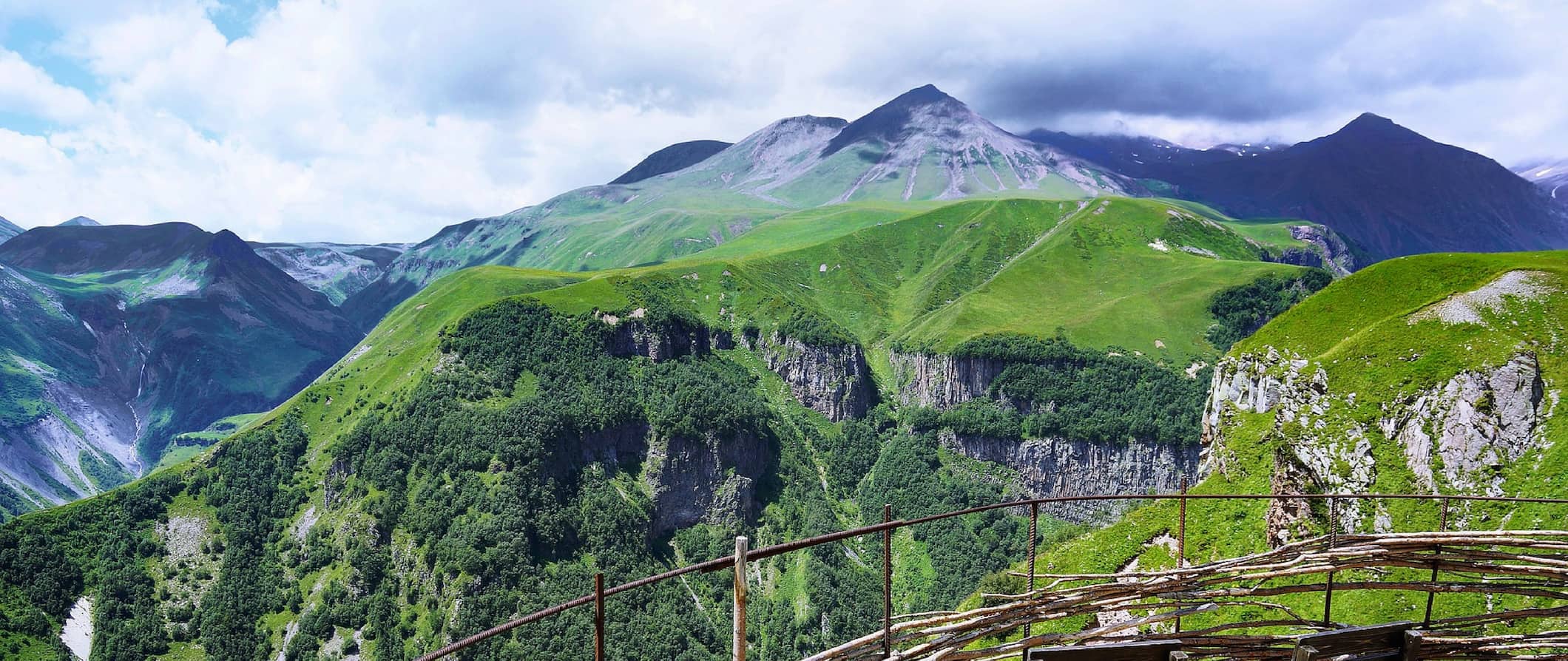
Backpacking Georgia was everything I thought it would be.
For years, I’d heard from my more well-traveled friends that Georgia was the place to be; it’s cheap, has delicious food and wine, incredible hikes and mountain scenery, and is devoid of huge numbers of tourists.
When I finally traveled around Georgia, I found they were right. I loved Georgia. It was better than I thought it could possibly be.
The country is in the Caucasus region and has a rich history, owing to its location at the intersection of Europe and Asia. It’s long been a cultural crossroads. Artifacts, including evidence of wine production, date to 6000 BCE, earning Georgia the nickname the “Cradle of Wine.”
From ancient monasteries to vineyards to tiny mountain towns to the Black Sea beaches, Georgia has it all — without the prices or crowds of Europe . The capital, Tbilisi, known for its diverse architecture and maze-like cobblestone streets, has a hip art and robust foodie scene. ( I loved Tbilisi so much I extended my time there .)
This travel guide to the country of Georgia can help you plan your trip, save money, and make the most of your visit!
Table of Contents
- Things to See and Do
- Typical Costs
- Suggested Budget
- Money-Saving Tips
- Where to Stay
- How to Get Around
- How to Stay Safe
- Best Places to Book Your Trip
- Related Blogs on Georgia
Top 5 Things to See and Do in Georgia
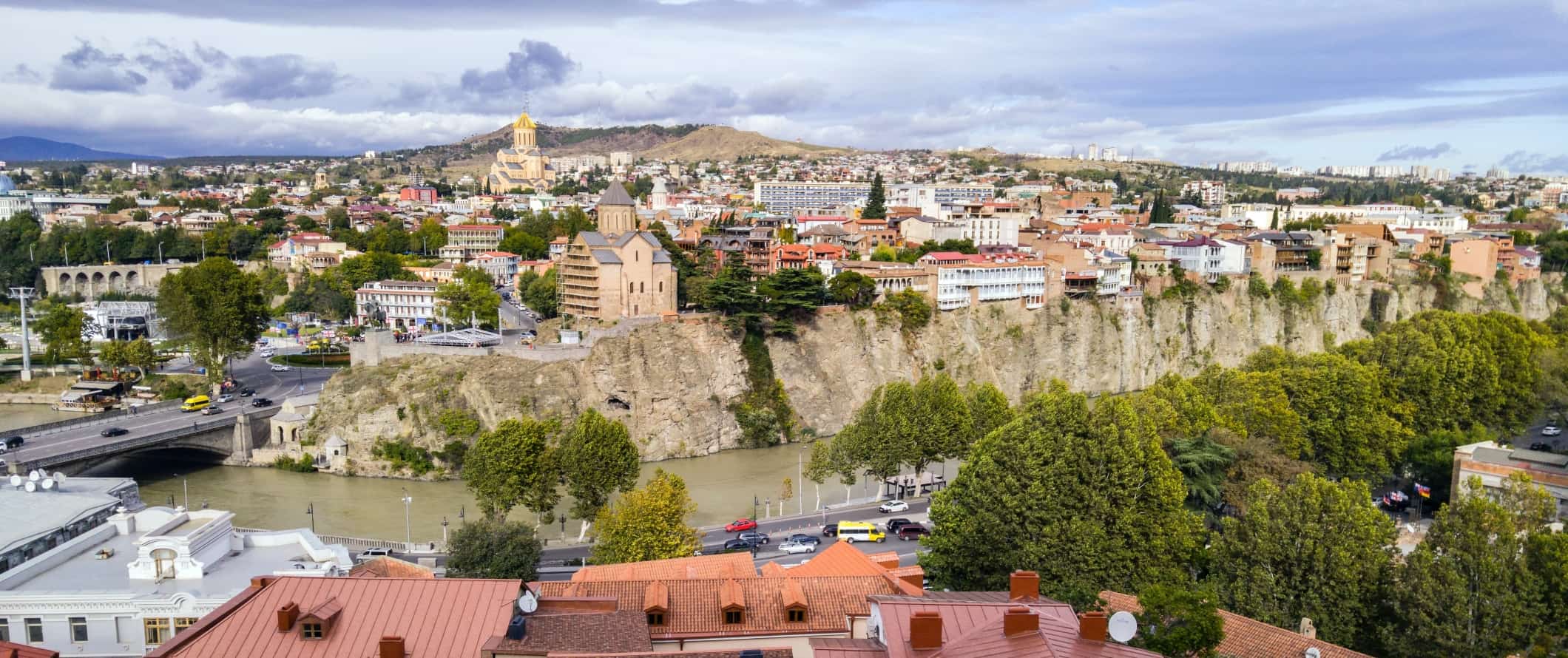
1. Explore Tbilisi
Tbilisi, the capital of Georgia, is incredible. Its cobblestoned old town has ancient streets, beautiful buildings, and thermal baths. Its modern district is filled with old Soviet buildings turned into co-working and art spaces. It’s a fun, youthful, energetic city. Stay awhile.
2. Check out Batumi
Batumi is the country’s famous Black Sea resort and port city, with a beautiful waterfront promenade, parks, and beaches. The towering Alphabetic Tower, adorned with Georgian script, has a seaside observation deck at the top (10 GEL). The old town district is lined with renovated 19th-century buildings.
3. Explore Stepantsminda
Located on the Georgian Military Highway, Stepantsminda is a valley town at the foot of Mount Kazbek. Often referred to as Kazbegi (its former name), it’s home to the famous hilltop silhouette of Tsminda Sameba Church. It makes a great base for hiking, climbing, and mountain-biking.
4. See Mtskheta
Mtskheta, the country’s former capital, is one of the oldest cities of Georgia. As the birthplace and one of the most vibrant centers of Christianity in Georgia, Mtskheta was declared as the “Holy City” by the Georgian Orthodox Church in 2014. It’s another must see place in the country.
5. Tour Gelati Monastery
One of the most spectacular monasteries in the country is the Gelati Monastery outside of Kutaisi. It is widely regarded as a masterpiece of Georgian’s Golden Age. It’s one of my favorite places in the entire country — it’s just beautiful. Free admission.
Other Things to See and Do in Georgia
1. visit vardzia cave monastery.
This unique monastery was built into the side of Erusheli mountain during the Georgian Golden Age (11th-13th century) for Queen Tamar the Great as a sanctuary to hide from invaders. The fortress contains 6,000 apartments as well as a throne room, 25 wine cellars, a bakery, and a large church. Today, the monastery is occupied by a small number of monks with about 300 of the original 6,000 apartments in use. It is easy to get here by marshrutka (minibus) from Akhaltsikhe. The journey takes about 1.5 hours. Admission is 15 GEL.
2. Wander the Batumi Botanical Garden
Located 9 kilometers (5.5 miles) from Batumi, these expansive gardens are located on a hillside overlooking the sea, covering over 275 acres. The main trail takes about 1.5 hours, on which you can see a diverse range of flora and fauna as well as waterfalls and a river in which you can swim. There are nine sections to the park, including areas dedicated to plants from the Caucasian subtropics, the Himalayas, the Mediterranean, New Zealand, East Asia, and more. The entrance fee is 8 GEL and camping overnight is possible for 20 GEL (includes admission).
3. Take a day trip to the town in a cave
Founded in the late Bronze Age, Uplistsikhe Cave Town is an ancient rock-hewn town located outside Gori. The area has been inhabited for thousands of years, and between the 6th century BCE and the 11th century CE, this was one of the most important political and religious centers in the country. The town was abandoned in the 13th century after multiple invasions by the Mongols. Admission is 15 GEL.
4. Soak in the sulfur baths
Mineral sulfur baths are central to the history and culture of Georgia’s capital. In fact, Tbilisi comes from the word for “warm place.” Although there were once 63 bathhouses in Tbilisi, sadly, there are now only a handful left. The baths are still wildly popular and are supposed to have healing powers and be good for your skin. The historic bathhouses straddle a small river that feeds them and then meanders through a canyon leading to the amazing Dzveli Tbilisi sulfur waterfall. Prices for an hour soak start at 20 GEL at public facilities and go all the way up to 200 GEL for a private room in fancier bathhouses. You can also opt to get a scrub down for an additional 10-20 GEL.
5. Visit Svaneti and the Caucasian Mountains
One of the most visited places in the mountains is Svaneti, thanks to its hundreds of ancient watchtowers dotted around the landscape. Historically, these watchtowers were used to keep citizens safe from invaders. While you can fly there, I’d recommend taking the long winding road through the mountains. It’s more scenic and there are lots of great photo ops.
6. Explore the Caves of Gareji
Located on the border with Azerbaijan , the David Gareji monastery complex consists of hundreds of rooms and churches, constructed on the side of the hilly landscape. Due to ongoing border disputes with Azerbaijan, only half of the complex is open to visitors. You can easily visit as a day trip from Tbilisi for around 108 GEL or you can travel by bus and stay locally. The entrance fee is 7 GEL, with an audio guide costing an additional 10 GEL.
7. Go Skiing
Thanks to the high Caucasus mountains, there is some really underrated skiing in the country. The most popular resorts are Gudauri, Bakuriani, and Mestia. Expect to pay around 40-50 GEL for a day pass. You can find accommodation from 140 GEL a night.
8. Visit the Georgian National Museum
One of the best museums in Tbilisi, this massive museum complex consists of several museums wrapped in one. It has a wealth of pre-Christian gold, silver, and precious stonework from burials in Georgia going back to the 3rd millennium BCE. Most stunning are the fabulously detailed gold adornments from Colchis (western Georgia). On the top floor, the Museum of Soviet Occupation focuses in copious detail on Soviet repression and resistance to it. Admission to all the museums in the complex costs 20 GEL.
9. Enjoy Mtatsminda Park
Mtatsminda Park sits at the top of Mount Mtatsminda overlooking Tbilisi. It’s a famous amusement park with a killer view from the highest point in Tbilisi and is worth the funicular trip just for the view. The park costs nothing to enter, but if you want to go on the rides you need to buy a card for 2 GEL and then top it up to pay. Rides include a Ferris wheel, carousels, water slides, and a roller coaster.
10. See Katskhi Pillar
The Katskhi Pillar is a 40-meter (130-foot) limestone monolith with the ruins of a small medieval hermitage at the top. The site was used between the 9th-13th centuries by an early Christian group called the “Stylites” who were known as “pillar monks.” They would spend long periods of time sitting (or standing) on top of pillars as they believed the practice would bring them closer to God. You cannot ascend the pillar, but it makes for gorgeous views and photos.
11. Visit the Stalin Museum
Stalin’s birthplace of Gori, Georgia, is now home to a weird museum that pays homage to his life (and forgets all the bad stuff he did). The museum takes you through Stalin’s life, from his early years growing up in Gori to his leadership of the USSR and finally his death in 1953. It’s a whitewashed exhibition but worth a visit as it’s a weird experience. Admission is 15 GEL including an English-speaking guide.
12. Explore the Tusheti region
The Tusheti region is located in the northeast of Georgia on the northern slopes of the Caucasus Mountains. If you want to go hiking in Georgia and get off the beaten path, head here. It’s incredibly beautiful and panoramic, and many people hike village to village to stay in guesthouses. The Omalo Loop Trek is a good one, although long (it takes several days). If you’re just looking to do some day hikes, do Omalo to Diklo Fort (4 hours) or Ghele to Parsma (8-9 hours).
Georgia Travel Costs
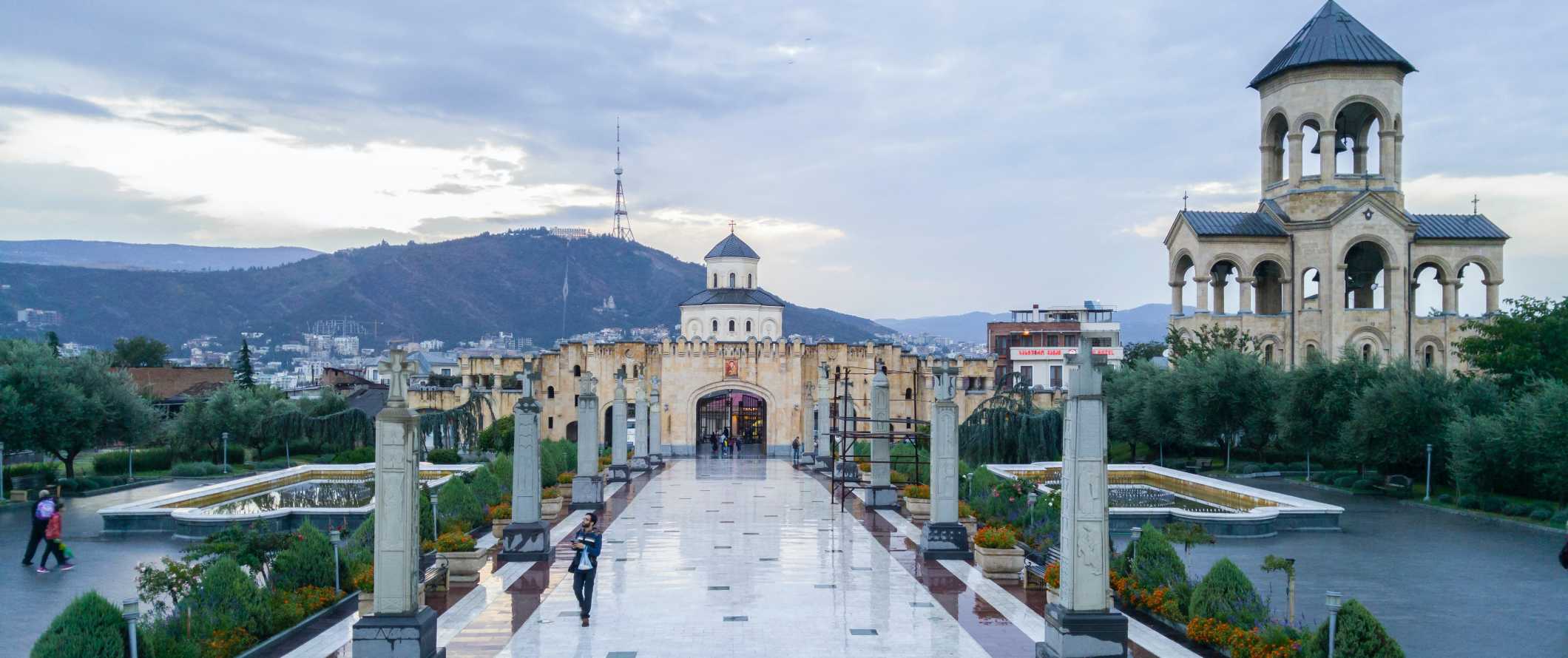
Accommodation – Georgia is a great budget backpacker destination, with a ton of cheap accommodation options. A bed in a 4-6-bed dorm costs around 15-20 GEL per night. For a private room in a hostel, expect to pay around 50-80 GEL per night. Free Wi-Fi is standard and most hostels also have self-catering facilities.
Budget hotels cost between 40-67 GEL per night and come with basic amenities like Wi-Fi, TV, and coffee/tea makers. Mountain guesthouses start from 55-67 GEL and often require a minimum stay of 2-3 nights. Airbnb is another great budget option, with private rooms starting at 45 GEL per night. Entire apartments start at around 60-90 GEL.
Camping is available around the country. There are a few hundred campgrounds scattered around, with prices costing around 10-25 GEL per night for two people and a tent. Wild camping is legal in Georgia as long as you’re not camping on someone’s private property.
Food – Georgian cuisine is a flavorful and healthy mix of meats, produce, fresh cheeses, and lots of spices. Soups and salads are plentiful, as are all kinds of fresh bread. Be sure to try khachapuri (a gooey, cheesy bread), khinkali (Georgian dumplings), bean soup, and sulguni (a popular local cheese). Wine, of course, is the drink of choice and can be found everywhere for incredibly affordable prices.
Overall, food is very cheap in Georgia — especially if you stick to eating the local cuisine. For an inexpensive lunch at a restaurant serving traditional Georgian cuisine, expect to pay around 20 GEL. Fast food (think burger and fries) is around 15 GEL while a medium pizza is 14 GEL.
If you want to splash out, a nicer meal at a mid-range restaurant costs around 35-40 GEL, including a drink.
Expect to pay around 4-5 GEL for a beer and 5-7 GEL for a glass of wine. A latte/cappuccino is around 6 GEL.
If you are planning to cook your own food, a week’s worth of groceries costs between 68-95 GEL. This gets you basic stapes like rice, pasta, seasonal produce, and some meat.
Backpacking Georgia Suggested Budgets
If you are backpacking Georgia, my suggested budget is 70 GEL per day. This covers the cost of a hostel dorm, eating only cheap meals but mostly your own food, limiting your drinking, using public transportation to get around, and sticking mostly to free and cheap activities like free walking tours and hiking.
On a mid-range budget of about 185 GEL per day, you can stay in a private Airbnb, eat out for most of your meals, enjoy a few drinks, take the occasional taxi, and do more paid activities like visiting museums or doing a guided hike.
On a “luxury” budget of 360 GEL per day or more, you can stay in a hotel, eat out for all your meals, rent a car or hire a driver to explore, enjoy more drinks, take taxis when you need to, and do whatever tours and activities you want. This is just the ground floor for luxury though. The sky is the limit!
You can use the chart below to get some idea of how much you need to budget daily, depending on your travel style. Keep in mind these are daily averages – some days you’ll spend more, some days you’ll spend less (you might spend less every day). We just want to give you a general idea of how to make your budget. Prices are in GEL.
Georgia Travel Guide: Money-Saving Tips
Georgia is a great place for backpackers as both food and accommodation are affordable. However, there are still ways you can cut costs even further. Here are some tips on how to save money in Georgia:
- Take a free walking tour – Tbilisi Free Walking Tour offers free walking tours which are a great way to get familiar with the city and the culture. Just be sure to tip your guide at the end!
- Drink the tap water – The water in Georgia is perfectly safe to drink, so an easy way to save money is to bring a reusable water bottle. LifeStraw is my go-to brand since their bottles have built-in filters that ensure your water is always clean and safe.
- Wild camp – If you really want to save money in Georgia, bring a tent. Camping is perfectly legal on public land.
- Cook your own meals – Many hostels here include kitchen facilities, so if you want to save money, book accommodation with a kitchen. Buying your own groceries may not be as glamorous as going out to eat, but it definitely saves money!
- Stay with a local – Staying with a local via Couchsurfing (or similar sharing economy sites) is a great way to save money and meet a knowledgeable local who can share their insider tips and advice.
- Walk everywhere – All of the major towns and cities in Georgia are quite walkable, so skip the public transportation (and the taxis) if you want to save a few extra Lari.
Where to Stay in Georgia
You can find some incredibly cheap accommodation options throughout Georgia. These are some of my suggested places to stay in Georgia:
- Guest House Darejani (Kutaisi)
- Boutique Hotel and Hostel Medusa (Batumi)
- Rock Hotel First Line (Batumi)
- Nino Ratiani Guesthouse (Mestia)
- Nato and Lado Guesthouse (Sighnaghi)
- My Moon Hostel Zugdidi (Zugdidi)
How to Get Around Georgia
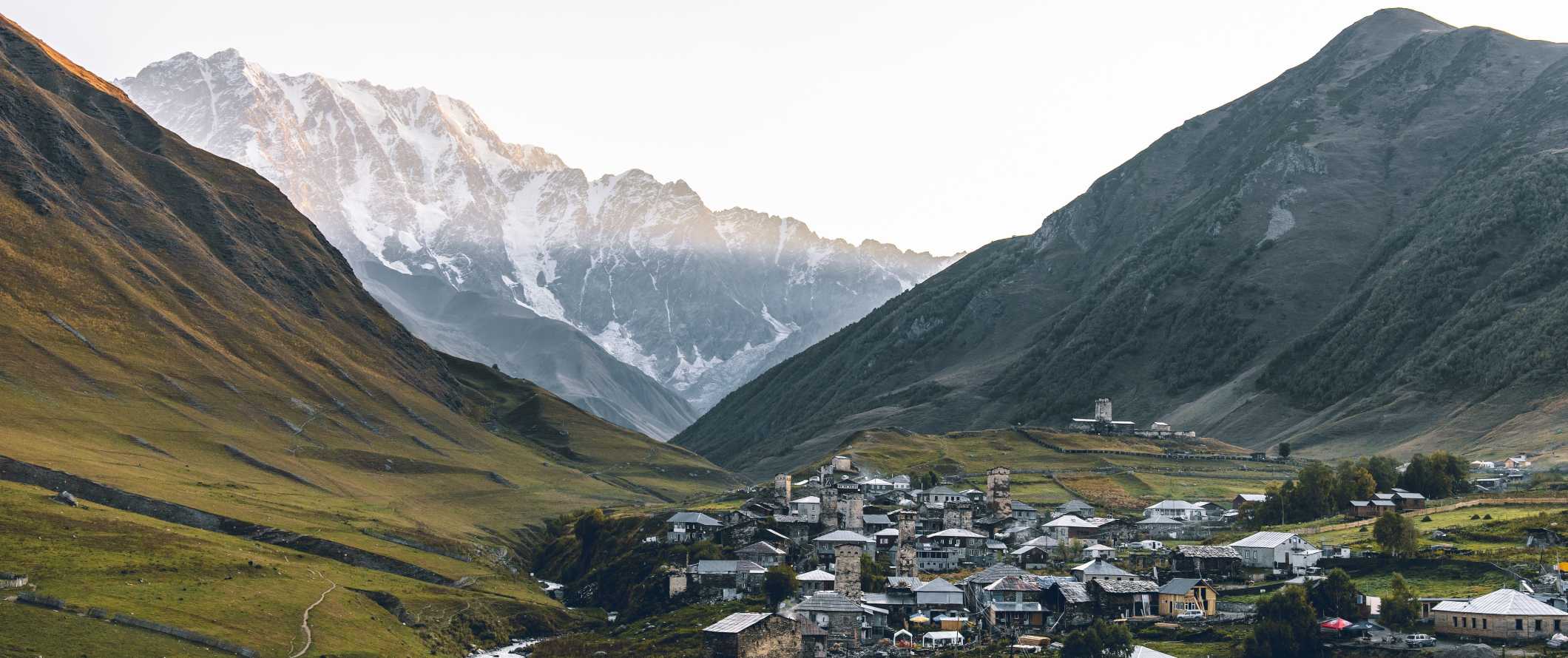
Public Transportation – Larger cities in Georgia are served by buses, mini-buses, and taxis. Tbilisi is the only city that has a metro system, costing 0.5 GEL per ride. You can also get a “Metromoney” card for 2 GEL that gives discounts on Tbilisi public transport and can be topped up as you go.
Public transportation prices vary by city but expect to pay around 0.5 GEL for a standard adult ticket. Most cities are walkable, although Tbilisi, with the exception of the old town, is pretty spread out so you may want to try and navigate the city’s public transport system.
If you need to take a taxi, prices start around 3 GEL and cost around 0.60 GEL per kilometer. Be sure to negotiate a fare before you get in.
Alternatively, if you are in Tbilisi and don’t want to take the bus then you can use Yandex, which is Georgia’s answer to Uber. You can download the app and use it to book a driver. Most journeys cost no more than 5 GEL.
Trains – Train travel within Georgia is slow and most of the trains are old and don’t have AC. If you do decide to travel by train and are traveling in high season, you need to book at least a day or two in advance or risk your train being sold out.
If you are entering or leaving Georgia by train, you can find direct routes from Armenia and Azerbaijan . Prices are very budget friendly with the overnight train from Baku in Azerbaijan costing from 62 GEL for a second-class ticket to Tbilisi. The journey is around 13 hours, so it may be worth paying a little extra for first class (around 100 GEL).
Bus – Buses, known locally as a marshrutka , are the best way to get around the country on a budget. Expect to pay 35 GEL to get from Tbilisi to Yerevan in Armenia.
Airlines – You can fly between Tbilisi and Batumi. Flights cost anything from 215-1,078 GEL so this is not the most economical option. I’d only recommend it if you’re short on time and have lots of money to spend.
Car rental – One of the best ways to see Georgia is by renting a car. This way you are free to roam without restrictions. Car rentals can be as low as 94 GEL per day for a multi-day rental. However, the roads in Georgia really aren’t the best and accidents are common so you’ll need to drive carefully. An International Driving Permit (IDP) is required for renting a vehicle.
When to Go to Georgia
The best time to visit Georgia is during the spring or autumn. Georgia can get extremely hot during the summer months and winters can be bitterly cold, making the shoulder seasons the best time to visit.
As the weather begins to get warmer from April to June, the cities come alive with people taking advantage of the weather. The temperatures also make hiking and outdoor activities more pleasant; the summer can be too warm to hike comfortably. Expect spring and autumn daily highs around 18°C (65°F).
The ski season in Georgia is from December through to April. Expect temperatures to hover around freezing. If you don’t plan on skiing or doing other winter sports, I’d avoid a winter visit to Georgia.
How to Stay Safe in Georgia
Georgia is a very safe country and violent crime against travelers is rare. The only areas to be avoided are the Russian-occupied areas of Georgia in the north (Abkhazia and South Ossetia) where things are still a bit rough and contentious.
As in any destination, don’t flash your valuables and keep an eye out for pickpockets in busy tourist areas and on crowded public transportation.
Solo female travelers should feel safe here, though the standard precautions apply (don’t leave your drink unattended at the bar, don’t walk home alone intoxicated, etc.).
Road accidents are very common so be sure to always wear your seatbelt when in a vehicle and always look twice when crossing busy streets. If you rent car, make sure you don’t leave any valuables in it overnight. Break-ins are rare but it’s always better to be safe than sorry.
Scams here are rare, but you can read about common travel scams to avoid if you’re concerned.
If you experience an emergency, dial 112 for assistance.
Always trust your gut instinct. Make copies of your personal documents, including your passport and ID. Forward your itinerary along to loved ones so they’ll know where you are.
The most important piece of advice I can offer is to purchase good travel insurance. Travel insurance will protect you against illness, injury, theft, and cancellations. It’s comprehensive protection in case anything goes wrong. I never go on a trip without it as I’ve had to use it many times in the past. You can use the widget below to find the policy right for you:
Georgia Travel Guide: The Best Booking Resources
These are my favorite companies to use when I travel. They consistently have the best deals, offer world-class customer service and great value, and overall, are better than their competitors. They are the companies I use the most and are always the starting point in my search for travel deals.
- Skyscanner – Skyscanner is my favorite flight search engine. They search small websites and budget airlines that larger search sites tend to miss. They are hands down the number one place to start.
- Hostelworld – This is the best hostel accommodation site out there with the largest inventory, best search interface, and widest availability.
- Booking.com – The best all around booking site that constantly provides the cheapest and lowest rates. They have the widest selection of budget accommodation. In all my tests, they’ve always had the cheapest rates out of all the booking websites.
- Get Your Guide – Get Your Guide is a huge online marketplace for tours and excursions. They have tons of tour options available in cities all around the world, including everything from cooking classes, walking tours, street art lessons, and more!
- SafetyWing – Safety Wing offers convenient and affordable plans tailored to digital nomads and long-term travelers. They have cheap monthly plans, great customer service, and an easy-to-use claims process that makes it perfect for those on the road.
- LifeStraw – My go-to company for reusable water bottles with built-in filters so you can ensure your drinking water is always clean and safe.
- Unbound Merino – They make lightweight, durable, easy-to-clean travel clothing.
- Top Travel Credit Cards – Points are the best way to cut down travel expenses. Here’s my favorite point earning credit cards so you can get free travel!
Georgia Travel Guide: Related Articles
Want more info? Check out all the articles I’ve written on backpacking/traveling Georgia and continue planning your trip:
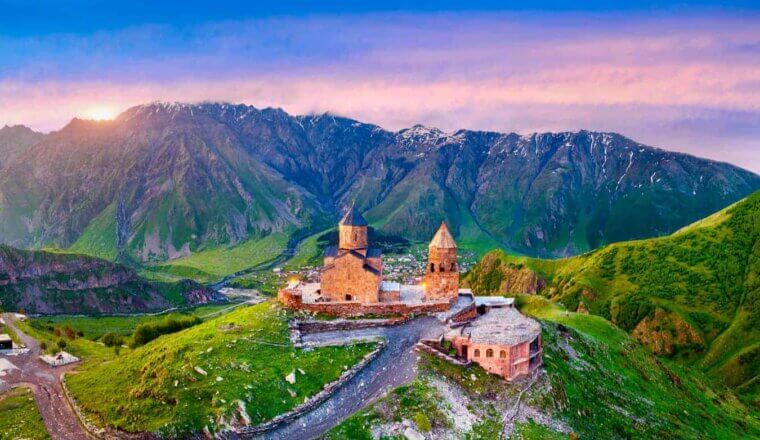
My 15 Favorite Things to See and Do in Georgia
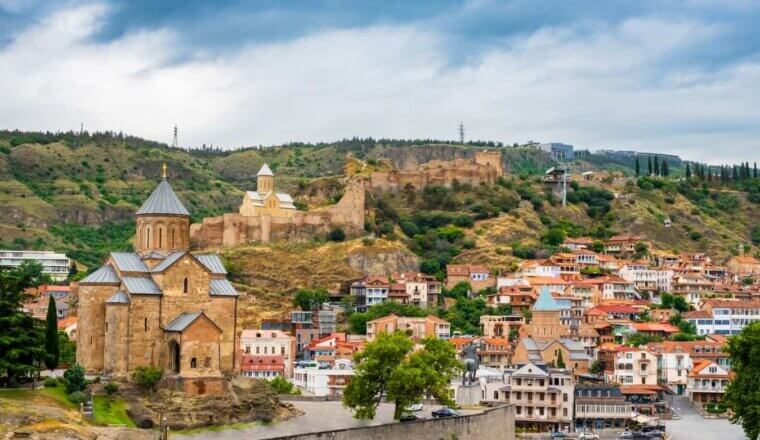
Is Georgia Safe to Visit?
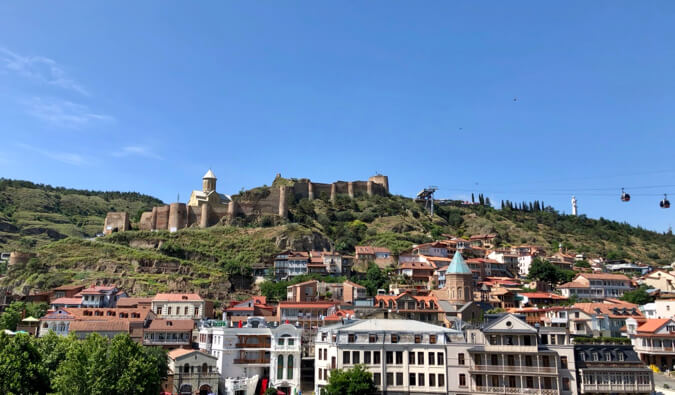
Finding Love and Home in Tbilisi, Georgia
Get my best stuff sent straight to you, pin it on pinterest.
- Where To Stay
- Transportation
- Booking Resources
- Related Blogs
Update April 12, 2024
Information for u.s. citizens in the middle east.
- Travel Advisories |
- Contact Us |
- MyTravelGov |
Find U.S. Embassies & Consulates
Travel.state.gov, congressional liaison, special issuance agency, u.s. passports, international travel, intercountry adoption, international parental child abduction, records and authentications, popular links, travel advisories, mytravelgov, stay connected, legal resources, legal information, info for u.s. law enforcement, replace or certify documents.
Before You Go
Learn About Your Destination
While Abroad
Emergencies
Share this page:
Travel Advisory July 26, 2023
Georgia - level 1: exercise normal precautions.
Last Update: Reissued with updates to health information.
Exercise normal precautions in Georgia. Some areas have increased risk. Read the entire Travel Advisory.
Do Not Travel To:
- The Russian-occupied Georgian regions of South Ossetia and Abkhazia due to risk of crime, civil unrest, and landmines .
Read the country information page for additional information on travel to Georgia.
If you decide to travel to Georgia:
- Enroll in the Smart Traveler Enrollment Program (STEP) to receive Alerts and make it easier to locate you in an emergency.
- Follow the Department of State on Facebook and Twitter .
- Review the Country Security Report for Georgia.
- Visit the CDC page for the latest Travel Health Information related to your travel.
- Prepare a contingency plan for emergency situations. Review the Traveler’s Checklist .
South Ossetia and Abkhazia – Do Not Travel
Russian troops and border guards occupy both South Ossetia and Abkhazia. The precise locations of administrative boundary lines are difficult to identify. Entering the occupied territories will likely result in your arrest, imprisonment, and/or a fine. Violent attacks and criminal incidents occur in the region. Landmines pose a danger to travelers near the boundary lines of both territories.
The U.S. government is unable to provide emergency services to U.S. citizens traveling in South Ossetia and Abkhazia, as U.S. government employees are restricted from traveling there.
Visit our website for Travel to High-Risk Areas .
Embassy Messages
View Alerts and Messages Archive
Quick Facts
Must be valid at the time of entry.
One page is required for an entry stamp.
Not required for stays of 365 days or less.
Hepatitis A and pre-exposure rabies are recommended.
Embassies and Consulates
U.s. embassy tbilisi.
29 Georgian-American Friendship Avenue Didi Dighomi Tbilisi, Georgia, 0131 Telephone: +(995)(32) 227-7724 (M-F 8:30-5:30) Emergency After-Hours Telephone: +(995)(32) 227-7000 Website: https://ge.usembassy.gov/ Email: [email protected]
Destination Description
See the Department of State’s Fact Sheet on Georgia for information on U.S.-Georgia relations
Entry, Exit and Visa Requirements
You need a valid passport to enter Georgia . U.S. citizens may enter, reside, work or study in Georgia without a visa for up to 365 days. Border authorities are free to conduct questioning and deny entry to anyone at their discretion, regardless of the traveler's citizenship. U.S. Embassy Tbilisi is unable to intercede on behalf of U.S. citizens or petition the government of Georgia to allow entry into Georgia. Visit the Georgian Ministry of Foreign Affairs website for the most current visa information. Visit the U.S. Centers for Disease Control ( CDC) website for immunization information.
- U.S. citizens who overstay the permitted 365-day period are subject to a fine.
- If transiting Georgia , law enforcement and border officials may inquire about the purpose of your travel, funds, insurance, reservations, return tickets, and invitations before granting entry.
- Georgian law requires travelers to enter and depart using travel documents of the same nationality.
- Georgian law requires that Georgian citizens, including dual nationals, enter and depart Georgia on Georgian passports. The government of Georgia may consider naturalized U.S. citizens a Georgian citizen.
- Under Georgian law, U.S.-Georgian dual-national males between the ages of 18 and 27 may be subject to military conscription. For more information, please review the Georgian Ministry of Defense webpage.
- Foreign documents intended for official use in Georgia must be authenticated with an apostille. This includes documents used to apply for a Georgian residency permit or to document the birth of a child born in Georgia.
- The U.S. Embassy cannot, under any circumstances, authenticate a document issued in the United States , regardless of whether the document has been notarized in the United States. See the Department’s webpages on Judicial Assistance and Notarial and/or Authentication Service for more information on apostilles.
The U.S. Department of State is unaware of any HIV/AIDS entry restrictions for visitors to or foreign residents of Georgia.
Find information on dual nationality , prevention of international child abduction , and customs information on our websites.
Safety and Security
Terrorism: Terrorist groups and those inspired by such organizations continue to plot possible attacks throughout Europe. Terrorists are increasingly using less sophisticated methods of attack – including knives, firearms, and vehicles – to more effectively target crowds. Frequently, their aim is unprotected or vulnerable targets, such as:
- High-profile public events (sporting contests, political rallies, demonstrations, holiday events, celebratory gatherings, etc.)
- Hotels, clubs, and restaurants frequented by tourists
- Places of worship
- Shopping malls and markets
- Public transportation systems (including subways, buses, trains, and scheduled commercial flights)
For more information, see our Terrorism page.
Abkhazia, South Ossetia, and Adjacent Areas: The United States and most other countries consider these regions part of Georgia. However, de facto local authorities claim independence, and Russian troops and border guards occupy both regions. Attacks, criminal incidents, and kidnappings have occurred in and around the areas. While none of the activity has been anti-American in nature, there is a high risk of travelers finding themselves in a wrong place/wrong time situation. Follow the guidance in our Travel Advisory for Georgia and do not travel to these regions. If you choose to travel there, you should be aware:
- U.S. government employees are restricted from traveling to the Russian-occupied regions of Abkhazia or South Ossetia. We are unable to provide emergency services to U.S. citizens in either territory. U.S. government employees also are restricted from traveling within five kilometers of the administrative boundary line (ABL) dividing these regions from Tbilisi-administered territory.
- The administrative boundary line (ABL) of South Ossetia is not clearly marked in many places and frequently moving in other places. There is an elevated risk of wandering into South Ossetia unknowingly while hiking, particularly on the ABL’s eastern side , which could result in detention by security forces.
- Unexploded ordnance left over from previous conflicts pose a danger near the administrative boundary line of South Ossetia.
- You may only legally enter these regions from the Georgian side, per Georgian law.
- You may be arrested, detained, imprisoned, and/or fined by Russian, Georgian or de facto authorities if you enter without proper documentation.
- Medical services in the occupied territories are extremely limited. Hospitals do not accept credit cards or medical insurance, have little to no infectious disease control, and lack medicine.
- There are no commercial airports in either region making air ambulance evacuations impossible during medical emergencies.
- It is illegal to undertake any type of economic activity in Abkhazia or South Ossetia that requires permits, licenses, or registration, per Georgian law. Laws also ban mineral exploration, money transfers, and international transit via Abkhazia or South Ossetia.
Pankisi Gorge: The Department of State cautions U.S. citizens against travel to the Pankisi Gorge region (north of the villages of Matane and Chorale, to the border with Russia, including the city of Duisk) because of the current security environment and the potential for civil unrest. There are restrictions on U.S. Embassy personnel traveling to this region or within five kilometers of it. While the Georgian government has had success in combating terrorism within its borders, U.S. citizens should remain vigilant. ISIS recruiting has occurred in Pankisi in the past, and some known terrorists have confirmed ties to the Pankisi Gorge region.
Crime : Criminals may target foreigners. Take precautions against becoming a victim of crime as you would in any large city.
- Firearms are readily available in Georgia, assailants may be armed, and disputes with firearms could occur.
- Alcohol consumption is prevalent and has been attributed to escalating or exacerbating otherwise minor disputes.
- Carrying pocket knives or other cutting devices in Georgia is illegal under most circumstances . You may be detained or cited if found in violation.
- There has been an increase in reports of “ confidence scams” where a traveler who orders drinks or food in a bar or restaurant is presented with a bill for exorbitantly high sums and then physically threatened if they do not pay. These are sometimes combined with “ romance scams ” wherein a traveler is taken to these establishments by someone they met online through a dating or other social meetup site.
- U.S. and other visitors have reported occurrences of sexual assault in Georgia.
- Avoid walking alone at night .
- Exercise caution when riding alone in private taxis or “marshrutka” mini buses.
- Maintain a low profile, do not carry large amounts of cash, and do not draw unnecessary attention to yourself.
- Use caution at ATMs , and always check for skimming devices or other tampering.
- Avoid using public WIFI networks or internet terminals as they did not protect your data or personal information.
- Foreign visitors report having items stolen from locked hotel rooms. Review additional information on crime threats in the Overseas Security Advisory Council (OSAC) Georgia Country Security Report .
Demonstrations occur frequently. They may take place in response to political or economic issues, and during international events.
- Demonstrations can be unpredicatable, avoid areas around protests and demonstrations.
- Security alerts about demonstrations can be found on the Embassy’s website here .
International Financial Scams: See the Department of State and the FBI pages for information.
Victims of Crime : U.S. citizen victims of sexual assault are encouraged to contact the U.S. Embassy for assistance. Report crimes to the local police by dialing 112, and contact the U.S. Embassy in Tbilisi at (+ 995) (32) 227-7724 (after hours + 995 32 227-7000).
The Georgian Ministry of Internal Affairs (MOIA) operates a 24-hour emergency response center similar to 911 (dial 112) and transfers emergency calls to the fire and rescue service, police, or the nearest medical emergency center. Most dispatchers speak only Georgian and Russian but will transfer calls to English-speaking operators.
Remember that the local authorities are responsible for investigating and prosecuting crimes. The U.S. Embassy has no law enforcement or legal authority overseas, nor can it investigate crimes in Georgia. U.S. embassy staff are prohibited by federal regulation from acting as agents, attorneys, or in a fiduciary capacity on behalf of U.S. citizens involved in legal disputes overseas.
See our webpage on help for U.S. victims of crime overseas .
- Help you find medical care
- Assist you in reporting a crime to the police
- Contact relatives or friends with your written consent
- Provide general information regarding the victim’s role during the local investigation and following its conclusion
- Provide a list of local attorneys
- Provide our information on victim’s compensation programs in the United States
- Provide an emergency loan for repatriation to the United States and/or limited medical support in cases of destitution
- Help you find accommodation and arrange flights home
- Replace a stolen or lost passport
Domestic Violence : U.S. citizen victims of domestic violence are encouraged to contact the Embassy for assistance. Local resources for victims of domestic violence, sexual abuse, or human trafficking include a hotline dial 116-006), temporary shelters, medical and rehabilitation services, interpretation and legal assistance. These may be available through a government agency known as Atipfund Georgia .
Tourism: The tourism industry is unevenly regulated, and safety inspections for equipment and facilities are not routine. Hazardous areas/activities are not always identified with appropriate signage, and staff may not be trained or certified by host government orby recognized authorities in the field. . In the event of an injury, appropriate medical treatment is typically available only in/near major cities. First responders are generally unable to access areas outside of major cities and to provide urgent medical treatment. U.S. citizens are encouraged to purchase medical evacuation insurance. See our webpage for more information on insurance providers for overseas coverage .
Personal Safety in Remote Areas: If you intend to camp , climb , or hike in the mountains or any remote area in Georgia:
- Research local conditions in advance.
- Go with a companion or a group. Avoid traveling alone.
- Provide route and contact information to someone not traveling with you.
- Maintain communication with your family and friends.
- If in trouble, call the emergency number 112. Most dispatchers speak Georgian and Russian but will transfer calls to English-speaking operators.
In the case of a crisis or natural disaster , U.S. citizens in Georgia may check the Embassy’s website for U.S. Embassy emergency messages, or receive them by email by signing up for the Smart Traveler Enrollment Program (STEP).
Local Laws & Special Circumstances
Criminal Penalties : You are subject to local laws. If you violate local laws, even unknowingly, you may be fined, arrested, deported, or imprisoned. Individuals establishing a business or praticing a profession that requires additional permits or licensing should seek information from the competent local authorities, prior to practicing or operating a business.
If arrested, you may be held in pre-trial detention for up to nine months. Review the State Department’s page on Arrests or Detention of U.S Citizens Abroad.
Furthermore, some lawsare also prosecutable in the United States, regardless of local law. For examples, see our website on crimes against minors abroad and the Department of Justice website.
Arrest Notification : If you are arrested or detained, ask police or prison officials to notify the U.S. Embassy immediately. See our webpage for further information.
Notification to U.S. Embassy Tbilisi of the arrest of U.S. citizens is typically significantly delayed in Georgia. In addition, the Georgian police have the authority under the Administration Violation Code to detain individuals for up to 24 hours without court intervention and 48 hours with court approval (this is referred to as “administrative detention”). There are no due process rights assigned during an administrative hold, meaning the person has no right to counsel.
Special Circumstances : Georgia has strict regulations concerning:
- Possession, use, or trafficking in illegal drugs in accordance with Georgian laws and controlled substance classifications. Penalties are severe and convicted offenders can expect long jail sentences and heavy fines.
- The import or export of alcohol, tobacco, jewelry, religious materials, art or artifacts, antiquities, and business equipment.
- Export of items of historical value , such as artwork, antiques, jewelry, or paintings. You must obtain a license. Contact the Embassy of Georgia or see our customs regulations webpage.
- Firearms cannot be imported into Georgia.
- Georgian law prohibits the sale of real property (land and houses) in the occupied regions of Abkhazia and South Ossetia. Prior owners may have the right to reclaim the property in the future.
Counterfeit and Pirated Goods: Although counterfeit and pirated goods are prevalent in many countries, they may still be illegal according to local laws. If you attempt to bring counterfeit or pirated goods into the United States you may incur a fine or have the items seized. See the U.S. Customs and Border Protection website for more information.
Faith-Based Travelers : See the following webpages for details:
- Faith-Based Travel Information
- International Religious Freedom Report – see country reports
LGBTQI+ Travelers: There are no legal restrictions on consensual same-sex sexual conduct or the organization of LGBTQI+ events in Georgia. However, traditional cultural attitudes result in LGBTQI+ individuals often facing discrimination and harassment. Some LGBTQI+ persons in Georgia have been targets of attacks. In addition, violent anti-LGBTQI+ protests have occurred in Tbilisi, including in response to public LGBTQI+ related events.
See our LGBTQI+ travel information page and section 6 of the Department of State’s Human Rights report for further details.
Travelers with Disabilities : Georgian law prohibits discrimination against persons with physical, sensory, intellectual, or mental disabilities, but the government does not enforce the law effectively. In July 2020, Georgia adopted legislation on the rights of persons with disabilities that establishes principles to guide the government’s implementation of the United Nations Convention on the Rights of Persons with Disabilities. The government has until this year (2023) to develop an implementation action plan and 15 years to complete accessibility of government buildings, infrastructure, and services. Social acceptance of persons with disabilities is not as prevalent as in the United States. Expect accessibility to be limited or nonexistent in public transportation, lodging, communication/information, and general infrastructure.
Students: See our Students Abroad page and FBI travel tips.
Women Travelers : See our travel tips for Women Travelers
For emergency services in Georgia, dial 112 (the equivalent of 911 in the United States)
Ambulance services are not widely available outside Tbilisi and training and availability of emergency responders may fall below U.S. standards. Ambulances are not equipped with state-of-the-art medical equipment. Injured or seriously ill travelers may prefer to take a taxi or private vehicle to the nearest major hospital rather than wait for an ambulance.
Limited Medical Services in Rural Areas: In the event of injury, appropriate medical treatment is typically available only in/near major cities. First responders are generally unable to access areas outside of major cities and to provide urgent medical treatment. U.S. citizens are encouraged to purchase medical evacuation insurance. See our webpage for more information on insurance providers for overseas coverage .
We do not pay for medical bills. Be aware that U.S. Medicare/Medicaid does not apply overseas. Most hospitals and doctors overseas do not accept U.S. health insurance.
Medical Insurance: Make sure your health insurance plan provides coverage overseas. Most health care providers in Georgia only accept cash payments. See our webpage for more information on insurance providers for overseas coverage. Visit the U.S. Centers for Disease Control and Prevention website for more information on type of insurance you should consider before you travel overseas.
We strongly recommend supplemental insurance to cover medical evacuation.
Always carry your prescription medication in original packaging, along with your doctor’s prescription . Check with the Ministry of Health to ensure the medication is legal in Georgia . Georgia strictly regulates types and quantities of prescription medications that may be brought into the country. Travelers carrying prohibited prescription drugs have been detained and face heavy fines or arrest.
Vaccinations: Be up-to-date on all vaccinations recommended by the U.S. Centers for Disease Control and Prevention.
The U.S. Embassy maintains a list of English-speaking doctors and hospitals in Georgia. We do not endorse or recommend any specific medical provider or clinic.
Further health information:
- World Health Organization
- U.S. Centers for Disease Control and Prevention (CDC)
Air Quality: Visit AirNow for information on air quality at U.S. Embassies and Consulates. Air pollution is a significant problem in Tbilisi. Consider the impact seasonal smog and heavy particulate pollution may have on you and consult your doctor before traveling, if necessary. Georgia has installed and maintains air quality monitors around the country. Real-time data is available at: https://air.gov.ge/en/ .
Health Facilities in General:
- Adequate healthcare facilities are available in Tbilisi, although below U.S. standards. Outside major cities, medical facilities in Georgia are limited.
- Hospitals and doctors may require payment “up front” prior to service or admission. Credit card payment is not always available.
- Medical staff may speak little or no English.
Assisted Reproductive Technology and Surrogacy:
- If you are considering traveling to Georgia to have a child through use of assisted reproductive technology (ART) or surrogacy, please see our ART and Surrogacy Abroad page .
- The Georgian government has announced it intends to pass legislation that would ban surrogacy for foreigners starting January 1, 2024. Breaking the law will be a criminal offense. Currently, the law is in draft form and several issues related to surrogacy services, including if and how pre-existing contracts with ART facilities and surrogates in Georgia would be honored, will not be known until the law is passed. You might not be able to receive a refund if you enter into a contract for surrogacy services. Babies born through illegal arrangements might be prevented from leaving Georgia. Before you commit to a surrogacy arrangement, seek independent legal advice. A list of local attorneys in Georgia who have expressed interest in assisting U.S. citizens can be found on Embassy Tbilisi’s website.
Adventure Travel : Visit the U.S. Centers for Disease Control and Prevention website for more information about Adventure Travel .
- Travelers with existing health problems may be at risk due to inadequate medical facilities.
- There is a significant risk of rabies in Georgia. The CDC recommends some travelers complete the rabies vaccine series prior to arriving in country.
- Some spices made in Georgia contain high levels of lead. Consider purchasing spices only from recognized U.S. or international manufacturers.
- Georgia has a high rate of Hepatitis C . Exercise caution if you plan to get a tattoo, piercing, dental work , or other procedure with potential for blood exposure. Ensure the provider uses proper sterilization procedures.
- Ensure food is cooked thoroughly to reduce the risk of food-borne illness.
- Georgia has eight venomous snake species that are active between March and October. Few medical facilities have antivenin serum. Treat all snakes as potentially venomous.
Tuberculosis is prevalent in Georgia. Visit the CDC website for more information about Resources for Travelers regarding specific issues in Georgia.
Travel and Transportation
Road Conditions and Safety : Road conditions in Georgia differ significantly from those in the United States. Many roads are in poor condition with stretches of road missing pavement and having large potholes. Driving at night can be dangerous due to varying road and traffic conditions, poor lighting, and the presence of open range livestock.
- Avoid traveling at night. U.S. Embassy official travel at night outside of urban areas is prohibited, except for emergencies.
- Exercise caution when driving in Georgia at all times . Reckless driving is common, and drivers frequently ignore traffic laws.
- Be careful when crossing streets, as pedestrians are not given right-of-way .
- Winter travel can also be hazardous , especially in mountainous areas.
Traffic Laws: Vehicles drive on the right. Speed limits range from 80 to 110 km/hr. (50 to 69 m/hr.) on highways and 30 to 70 km/hr. (19 to 44 m/hr.) on urban thoroughfares. Motorists are not permitted to make right turns at red traffic lights.
- Wear seat belts when driving. Children under four must travel in child-safety seats. Children under twelve may not ride in the front seat.
- There is zero tolerance for driving under the influence of alcohol . Anything above a blood alcohol content of 0.0% is illegal.
- Vehicle safety inspections are being phased in since January 2018, but there are still many vehicles on the road in poor condition or lacking basic features such as working lights.
- The Georgian Patrol Police maintain traffic safety in Georgia, but enforcement of traffic regulations is inconsistent.
Public Transportation : Public transportation, while inexpensive, may be unreliable and uncomfortable. Minibuses (“marshrutkas”) are often overcrowded, poorly maintained, lack seat belts, and are frequently involved in accidents.
See our Road Safety page and the website of the Georgian National Tourism Agency for more information.
Aviation Safety Oversight : As there is no direct commercial air service to the United States by carriers registered in Georgia, the U.S. Federal Aviation Administration (FAA) has not assessed the Government of Georgia’s Civil Aviation Authority for compliance with International Civil Aviation Organization (ICAO) aviation safety standards. Further information may be found on the FAA’s safety assessment page .
Maritime Travel: Mariners planning travel to Georgia should also check for U.S. maritime advisories and alerts . Information may also be posted to the U.S. Coast Guard homeport website , and the NGA broadcast warnings website .
For additional travel information
- Enroll in the Smart Traveler Enrollment Program (STEP) to receive security messages and make it easier to locate you in an emergency.
- Call us in Washington, D.C. at 1-888-407-4747 (toll-free in the United States and Canada) or 1-202-501-4444 (from all other countries) from 8:00 a.m. to 8:00 p.m., Eastern Standard Time, Monday through Friday (except U.S. federal holidays).
- See the State Department’s travel website for the Worldwide Caution and Travel Advisories .
- Follow us on Twitter and Facebook .
- See traveling safely abroad for useful travel tips.
Review information about International Parental Child Abduction in Georgia . For additional IPCA-related information, please see the International Child Abduction Prevention and Return Act ( ICAPRA ) report.”
Travel Advisory Levels
Assistance for u.s. citizens, georgia map, learn about your destination, enroll in step.

Subscribe to get up-to-date safety and security information and help us reach you in an emergency abroad.
Recommended Web Browsers: Microsoft Edge or Google Chrome.
Make two copies of all of your travel documents in case of emergency, and leave one with a trusted friend or relative.
Afghanistan
Antigua and Barbuda
Bonaire, Sint Eustatius, and Saba
Bosnia and Herzegovina
British Virgin Islands
Burkina Faso
Burma (Myanmar)
Cayman Islands
Central African Republic
Cote d Ivoire
Curaçao
Czech Republic
Democratic Republic of the Congo
Dominican Republic
El Salvador
Equatorial Guinea
Eswatini (Swaziland)
Falkland Islands
France (includes Monaco)
French Guiana
French Polynesia
French West Indies
Guadeloupe, Martinique, Saint Martin, and Saint Barthélemy (French West Indies)
Guinea-Bissau
Isle of Man
Israel, The West Bank and Gaza
Liechtenstein
Marshall Islands
Netherlands
New Caledonia
New Zealand
North Korea (Democratic People's Republic of Korea)
Papua New Guinea
Philippines
Republic of North Macedonia
Republic of the Congo
Saint Kitts and Nevis
Saint Lucia
Saint Vincent and the Grenadines
Sao Tome and Principe
Saudi Arabia
Sierra Leone
Sint Maarten
Solomon Islands
South Africa
South Korea
South Sudan
Switzerland
The Bahamas
Timor-Leste
Trinidad and Tobago
Turkmenistan
Turks and Caicos Islands
United Arab Emirates
United Kingdom
Vatican City (Holy See)
External Link
You are about to leave travel.state.gov for an external website that is not maintained by the U.S. Department of State.
Links to external websites are provided as a convenience and should not be construed as an endorsement by the U.S. Department of State of the views or products contained therein. If you wish to remain on travel.state.gov, click the "cancel" message.
You are about to visit:

Search Smartraveller

Latest update
We advise:
Exercise normal safety precautions overall in Georgia.
Higher levels apply in some areas.
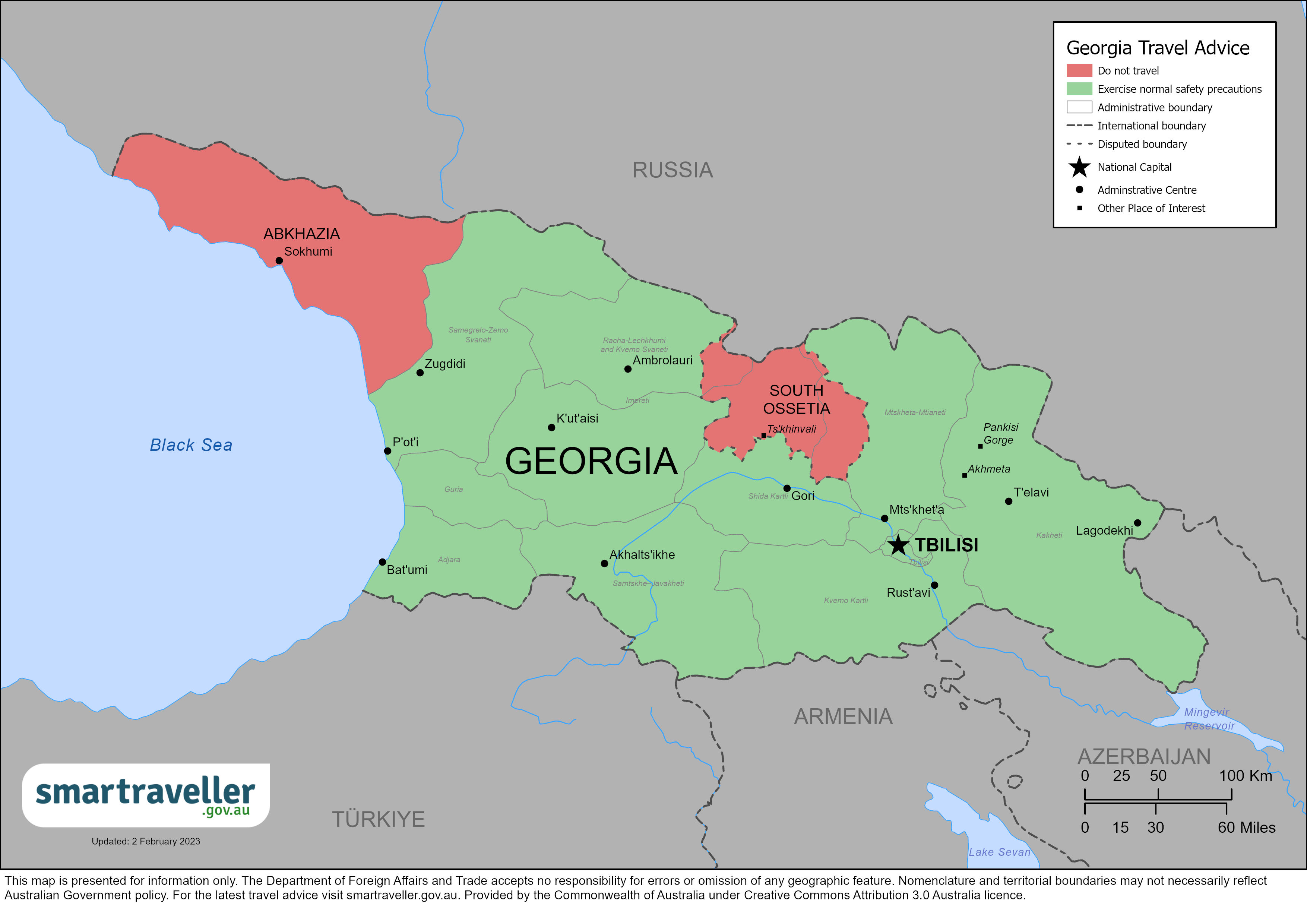
Georgia (PDF 207.94 KB)
Europe (PDF 2.62 MB)
Local emergency contacts
Fire and rescue services, medical emergencies.
Call 112, or contact the nearest police station.
Advice levels
Exercise normal safety precautions in Georgia.
Do not travel to South Ossetia and Abkhazia.
Do not travel to South Ossetia and Abkhazia due to the risk of landmines, violence and fighting.
See Safety
- Political rallies are common in Georgia, including Tbilisi. They can turn violent. Monitor the media. Avoid public protests and demonstrations.
- Don't travel to South Ossetia or Abkhazia. There's a high risk of terrorist attacks, unexploded landmines and violence in these regions. We can't provide consular help to Australians who are there.
- Violent crime can occur. Financial, import and export scams also happen. Be wary of strangers. Be extra careful when walking after dark.
- Earthquakes and floods can happen in Georgia. Monitor the media. Follow the advice of local authorities.
Full travel advice: Safety
- Malaria is a risk in south-eastern Georgia. Make sure your accommodation is insect-proof. Use insect repellent.
- Waterborne, foodborne, and other infectious diseases occur. Boil drinking water or drink bottled water. Avoid ice cubes, unpasteurised dairy products, and raw and undercooked food.
- Medical care is limited and of poor quality. If you become ill or injured, you may need to be evacuated. Make sure your travel insurance covers this.
Full travel advice: Health
- Georgia has announced it intends to ban surrogacy for foreigners. The ban was due to start on 1 January, but the bill is currently still before the Georgian parliament.
- Babies born through illegal arrangements may be prevented from leaving. If you plan to engage in surrogacy in Georgia, be aware of all the risks. Get legal advice from a Georgian solicitor with knowledge of this area of law.
Always carry your passport, visa or migration card (or copies).
- Taking photos near military or strategic sites, such as airports, is illegal. It's also illegal to export items of national heritage without a licence.
- Georgia doesn't always recognise dual nationality. If you're a dual national, get advice from an embassy or consulate of Georgia before you travel.
Full travel advice: Local laws
- You can visit Georgia for up to 12 months without a visa if you have an Australian passport. You'll need a visa for longer stays. Entry and exit conditions can change at short notice. You should contact the nearest embassy or consulate of Georgia for the latest details.
- Land and sea borders are open, except for the border with Azerbaijan, which requires special permission from the Ministry of Foreign Affairs of Azerbaijan to cross. The Georgian land border with Russia near Stepantsminda (Kazbegi) is open 24/7.
- Don't enter or exit Georgia via land borders with Russia. It's illegal to enter Georgia via Abkhazia or South Ossetia. There's no official border control in these regions.
- You need travel insurance in Georgia. Check the Ministry of Foreign Affairs of Georgia e-Visa Portal for details.
Full travel advice: Travel
Local contacts
- The Consular Services Charter tells you what the Australian Government can and can't do to help when you're overseas.
- Australia doesn't have an embassy or consulate in Georgia. For consular assistance, contact the Australian Embassy in Türkiye .
- Limited consular assistance is also available from the British Embassy in Tbilisi .
- To stay up to date with local information, follow the Embassy’s social media accounts.
Full travel advice: Local contacts
Full advice
Civil unrest and political tension.
Public protests and events that draw large groups of people can turn violent.
Political rallies are common in Georgia, including Tbilisi.
To protect yourself during periods of unrest:
- avoid public protests and rallies
- monitor local media and other sources for possible threats
- follow the advice of local authorities
More information:
- Demonstrations and civil unrest
Conflict zones
South Ossetia and Abkhazia, and the surrounding areas are unsafe. Unexploded landmines exist in these areas.
Violence and fighting between the military and, militia and criminals, including terrorists, is common.
Some roads in the Abkhazia region may have landmines.
We can't provide consular assistance to Australians in Abkhazia or South Ossetia.
Georgia has a risk of violent crime, including:
- carjackings
- sexual assaults
- home invasions
- drink spiking
Financial, import and export scams have increased in recent years.
To protect yourself from crime:
- be careful when walking after dark
- always keep car doors locked and windows up, even when moving
- always keep sight of your credit card
- check for card skimming devices before using ATMs
To protect yourself around people you don't know:
- don't accept food or drinks from strangers
- don't leave your food or drink unattended
- be wary of friendly strangers
- be wary of people who mention business or trade opportunities
Cyber security
You may be at risk of cyber-based threats during overseas travel to any country. Digital identity theft is a growing concern. Your devices and personal data can be compromised, especially if you're connecting to Wi-Fi, using or connecting to shared or public computers, or to Bluetooth.
Social media can also be risky in destinations where there are social or political tensions or laws that may seem unreasonable by Australian standards. Travellers have been arrested for things they have said on social media. Don't comment on local or political events on your social media.
More information:
- Cyber security when travelling overseas
Terrorism is a threat worldwide.
Since 2008, car bombings have occurred in Abkhazia and South Ossetia. This started when the conflict between Georgia and the Russian Federation ended.
Attacks target military and security sites, but civilians have been hurt.
Recent terrorist targets include:
- public transport
- commercial and public places where foreigners might be present
To reduce your risk:
- report suspicious activity or items to the police
- monitor the media for new threats
- listen to official warnings
Be alert in public places, especially around known terrorist targets, including:
- shopping areas
- places of worship
- sporting venues
- airports and other transport hubs
- places of mass gathering
If there's an attack, leave the affected area as soon as it's safe. Avoid the area in case of secondary attacks.
Adventure activities
It's difficult to get accurate updates on mountain conditions.
Emergency responses may be limited if you get into trouble while mountaineering or hiking.
Contact Georgian companies with specialist guides if you're thinking about trekking or mountaineering.
Transport and tour operators don't always follow safety and maintenance standards. This includes mountaineering and hiking.
If you plan to do an adventure activity :
- check if your travel insurance policy covers it
- ask about and insist on minimum safety requirements
- always use available safety gear, such as life jackets or seatbelts
If proper safety equipment isn't available, use another provider.
Climate and natural disasters
Earthquakes and floods can happen in Georgia.
If there is a natural disaster or severe weather :
- secure your passport in a safe, waterproof location
- keep in contact with friends and family
- check local media and other sources
- take official warnings seriously
- don't enter flood-affected areas
Register with the Global Disaster Alert and Coordination System to receive alerts on major disasters.
- Travel insurance
Ensure you get comprehensive travel insurance before you leave, as you may be asked to provide evidence at check-in or by the immigration authorities on arrival in Georgia.
Your policy needs to cover all overseas medical costs, including medical evacuation. The Australian Government won't pay for these costs.
If you travel to South Ossetia and Abkhazia despite our advice, you'll need a special insurance policy that covers travel to high-risk destinations. Most Australian policies won't cover you for travel to these areas.
If you can't afford travel insurance, you can't afford to travel. This applies to everyone, no matter how healthy and fit you are.
If you're not insured, you may have to pay thousands of dollars up-front for medical care.
- what activities and care your policy covers
- that your insurance covers you for the whole time you'll be away
Physical and mental health
Consider your physical and mental health before you travel, especially if you have an existing medical condition.
See your doctor or travel clinic to:
- have a basic health check-up
- ask if your travel plans may affect your health
- plan any vaccinations you need
Do this at least 8 weeks before you leave.
If you have immediate concerns for your welfare or the welfare of another Australian, call the 24-hour Consular Emergency Centre on +61 2 6261 3305 or contact your nearest Australian Embassy, High Commission or Consulate to discuss counselling hotlines and services available in your location.
- General health advice
- Healthy holiday tips (Healthdirect Australia)
Medications
Not all medication you can buy over the counter or by prescription in Australia is available in other countries. Some may even be considered illegal or a controlled substance, even if prescribed by an Australian doctor.
Georgia has a very strict anti-drug policy. There are legal limits on how much you can take into Georgia for some medications. If you travel without the required permits, you may be detained at the border and face heavy fines. For further information on the legal status of a specific medication, you'll need to contact the Embassy of Georgia.
If you plan to bring medication, check if it's legal in Georgia. Take enough legal medication for your trip.
Carry a letter from your doctor stating:
- what the medication is
- your required dosage
- that it's for personal use
Health risks
Insect-borne diseases.
Malaria is a risk in the southeastern part of Georgia.
To protect yourself from disease:
- make sure your accommodation is insect-proof
- use insect repellent
- wear long, loose, light-coloured clothing
Consider taking medicine to prevent malaria.
Measles cases can routinely occur in Georgia, which is currently experiencing increased measles activity. Make sure your vaccinations are up-to-date before you travel.
- Measles Outbreak 2019 (Department of Health and Aged Care)
- Measles immunisation service (Department of Health and Aged Care)
Other health risks
Waterborne, foodborne, and other infectious diseases occur. These include:
- tuberculosis
- brucellosis
Sometimes serious outbreaks occur.
To protect yourself from illness:
- drink boiled water or bottled water with sealed lids
- avoid ice cubes
- avoid unpasteurised dairy products
- avoid raw and undercooked food, such as salads
- avoid contact with dogs, cats and other animals
Get medical attention straight away if an animal scratches or bites you
Get medical advice if you think you have food poisoning or have a fever or diarrhoea.
- Infectious diseases
Medical care
Medical care in Georgia can be limited, particularly outside Tbilisi.
International medical supplies are available, but the quality of services and facilities is poor.
If you become ill or injured, you may need to be evacuated. Medical evacuation can be very expensive. Ensure your travel insurance covers this.
Georgia has announced it intends to ban surrogacy for foreigners. The ban was due to start on 1 January, but the bill is currently still before the Georgian parliament. Contravening this law would be a criminal offence. It's unclear what transitional arrangements would be in place if the bill passes.
Babies born through illegal arrangements may be prevented from leaving Georgia. Be aware that you may not be able to get your money back if you enter into a contract for surrogacy services.
Before you commit to a surrogacy arrangement, seek independent legal advice from a Georgian solicitor with knowledge of this area of law. See our advice on going overseas for international surrogacy .
To bring children born through surrogacy to Australia, you must apply for an Australian passport. Check the website of the Australian Embassy in Türkiye for details on how to apply.
If you're going to Georgia for surrogacy, before leaving Australia, get prepared:
- Australians often find surrogacy in Georgia to be an extremely stressful experience.
- Tell us about your travel - [email protected]
- The entire process will likely take longer than you think. Plan for delays.
- Prepare your documents. Ensure you understand which documents you'll need and in what form (do they need to be apostilled, translated, or notarised?). Third-country documents (e.g. if your marriage certificate is not from Australia) may be scrutinised closely by the Georgian authorities and may cause delays.
- Understand what to expect from your surrogacy agency. Couples often experience a lack of information or sympathy from their surrogacy agency. Realise your agency will be managing multiple births at the same time as yours.
- Understand your surrogacy contracts, including contracted timeframes. Be cautious of verbal agreements from your surrogacy agency that differ from your contract documents. Have funds set aside for legal costs should a dispute arise.
- You'll need to travel to an Australian Embassy to obtain a passport for your child. Your child must stay in Georgia until you return to Georgia with the passport.
- Don't book return tickets before you have your child's passport. When to travel from Georgia to an Australian mission for a passport is your decision. We can't guarantee when a passport will be issued.
- Australia doesn't have an embassy or consulate in Georgia. Consular services in Georgia are limited. Obtaining a birth certificate, citizenship, and passport takes time. Processing times vary.
- Children born through surrogacy can experience medical complications. Medical complications could extend your stay in Georgia and the costs of surrogacy. Medical evacuation is your responsibility.
- Don't expect special treatment from Georgian authorities. Georgian authorities will issue a birth certificate according to their requirements and timelines; they will not expedite your application simply because you need to leave Georgia. The embassy can't intervene with Georgian authorities on your behalf.
- Be prepared to change your plans. Due to Georgian authorities ' requirements, you may need to travel unexpectedly to Tbilisi.
- Due to language difficulties, you may find it frustrating to engage with medical and hospital staff.
- You may meet other clients undertaking surrogacy in Georgia. Every case is different. Don't compare how long it takes for others to leave Georgia. Be cautious about taking advice from other surrogacy clients; only seek advice from official sources.
It's your choice to travel to Georgia for surrogacy, and you're responsible for your safety, the safety of your child, and any legal or medical risks.
- Going overseas for international surrogacy
- For Georgian birth certificates – the Local Government or via your surrogacy agency
- For Australian citizenship – The Department of Home Affairs ( [email protected] )
- For an Australian Passport - the Specialised Case Management Section ( [email protected] ) in Australia for assessment and the Australian Embassy Ankara for your passport interview and printing of the emergency passport.
- For consular assistance – the Australian Embassy in Ankara ( [email protected] )
You're subject to all local laws and penalties, including those that may appear harsh by Australian standards. Research local laws before travelling.
If you're arrested or jailed, the Australian Government will do what it can to help you under our Consular Services Charter . But we can't get you out of trouble or out of jail.
Penalties for drug offences are severe. They can include heavy fines and long prison sentences.
- Carrying or using drugs
It's illegal to take photos:
- near military sites
- of strategic sites, such as airports
You need a licence from the Ministry of Culture and Sport's Department of Expertise and Evaluation to export items of national heritage.
Australian laws
Some Australian criminal laws still apply when you’re overseas. If you break these laws, you may face prosecution in Australia.
Staying within the law and respecting customs
Dual citizenship
Georgia doesn't always recognise Australians with Georgian dual nationality.
If you're a dual citizen, this may limit the consular services we can give if you're arrested or detained.
Georgia has compulsory military service.
Dual nationals should get advice from an embassy or consulate of Georgia before travelling.
- Dual nationals
Local customs
Same-sex relationships are legal in Georgia but aren't widely accepted.
Consider avoiding public displays of affection.
Advice for LGBTI T ravellers
Every country or territory decides who can enter or leave through its borders. For specific information about the evidence you'll need to enter a foreign destination, check with the nearest embassy, consulate or immigration department of the destination you're entering.
Visa-free travel for short stays
You can visit Georgia for up to 12 months without a visa if you have an Australian passport. You'll need a visa for longer stays.
Entry and exit requirements can change at short notice. Contact the Georgian Foreign Ministry or an embassy or consulate of Georgia for details about visas, currency, customs and quarantine rules.
- Ministry of Foreign Affairs of Georgia e-Visa Portal
Travelling with children
Children under 18 years travelling alone or with one parent may need a letter of consent from the non-travelling parent or parents.
They'll also need a copy of their birth certificate and passport.
Check requirements with an embassy or consulate of Georgia.
We advise against all travel to the North Caucasus region of Russia due to the high threat of terrorist activity. See our travel advice for Russia .
It's illegal to enter Georgia via Abkhazia or South Ossetia, where there's no official border control.
Some countries won't let you enter unless your passport is valid for 6 months after you plan to leave that country. This can apply even if you're just transiting or stopping over.
Some foreign governments and airlines apply the rule inconsistently. Travellers can receive conflicting advice from different sources.
You can end up stranded if your passport is not valid for more than 6 months.
The Australian Government does not set these rules. Check your passport's expiry date before you travel. If you're not sure it'll be valid for long enough, consider getting a new passport .
Lost or stolen passport
Your passport is a valuable document. It's attractive to people who may try to use your identity to commit crimes.
Some people may try to trick you into giving them your passport. Always keep it in a safe place.
If your passport is lost or stolen, tell the Australian Government as soon as possible:
- In Australia, contact the Australian Passport Information Service .
- If you're overseas, contact the nearest Australian embassy or consulate .
Passport with X gender identifier
Although Australian passports comply with international standards for sex and gender, we can't guarantee that a passport showing 'X' in the sex field will be accepted for entry or transit by another country. Contact the nearest embassy, high commission or consulate of your destination before you arrive at the border to confirm if authorities will accept passports with 'X' gender markers.
- LGBTI travellers
The local currency is the Lari (GEL).
When entering or leaving, you must declare any foreign currency worth $US10,000 or more. This covers all forms of currency, not only cash.
By law, all goods and services must be paid for in GEL.
Credit cards are widely used in Tbilisi, but less so in regional areas.
ATMs are available in major towns.
Traveller's cheques aren't widely accepted.
Local travel
Abkhazia and south ossetia.
Do not travel to South Ossetia or Abkhazia and nearby areas. There's a risk of terrorist and criminal activity.
Unexploded weapons are in these areas.
We can't help Australians who are in these regions.
Driver's licence
You need an Australian driver's licence to drive in Georgia.
You may need an International Driving Permit (IDP) for insurance.
Before you drive in Georgia, check with your insurance and vehicle providers on what you need to do.
Vehicle insurance
Civil liability insurance is compulsory for vehicles registered outside Georgia.
You can buy insurance from centres at most border crossings.
- Compulsory Insurance Centre
Road travel
Driving in Georgia can be dangerous. Hazards include:
- poorly maintained roads and vehicles
- poorly lit roads
- not enough signs
- drivers not following the road rules
Traffic signals and road rules are often ignored.
Mountain roads can be dangerous. Take extra care in winter.
Driving with a blood alcohol reading above 0% is illegal.
If you plan to drive in Georgia, check if your travel insurance will cover driving.
- Driving or riding
Use registered taxis and limousines arranged through your hotel.
To avoid issues with taxis:
- don't hail taxis on the street
- sit in the back seat
Public transport
Public transport can be unsafe due to poor road conditions.
Theft and assault happen on trains and around the Tbilisi station.
DFAT doesn't provide information on the safety of individual commercial airlines or flight paths.
Check Georgia's air safety profile with the Aviation Safety Network.
Emergencies
Depending on what you need, you could contact:
- your family and friends
- travel agent
- tour operator
- travel insurer
English-speaking operators are usually available.
Always get a police report when reporting a crime.
Your travel insurer should have a 24-hour emergency number.
Consular contacts
Read the Consular Services Charter for what the Australian Government can and can’t do to help you overseas.
Australia doesn't have an embassy or consulate in Georgia. For consular assistance, contact the Australian Embassy in Turkiye.
Australian Embassy, Ankara
MNG Building, 7th floor
88 Uğur Mumcu Caddesi
Gaziosmanpaşa
Ankara, Turkey
Phone: +90 312 459 9500
Website: turkey.embassy.gov.au
Facebook: Australia in Turkiye
X: @AusAmbTurk iye
Limited consular assistance is also available from the British Embassy in Tbilisi.
British Embassy, Tbilisi
51 Krtsanisi Street
Tbilisi, 0114
Phone: (+995) 32 227 4747
Website: ukingeorgia.fco.gov.uk
24-hour Consular Emergency Centre
In a consular emergency, if you can't contact an embassy, call the 24-hour Consular Emergency Centre on:
- +61 2 6261 3305 from overseas
- 1300 555 135 in Australia

Travelling to Georgia?
Sign up to get the latest travel advice updates..
Be the first to know official government advice when travelling.
What to do in Georgia in a 7-day itinerary
By Joan Torres Leave a comment Last updated on April 25, 2024

A beautifully vibrant capital, snow-capped mountains, a jaw-dropping glacier, an off the beaten track valley, and Stalin’s hometown; this 1-week itinerary for Georgia will take you through some of the country’s most interesting and easy to get to attractions.
If we agree to consider it part of Europe, Georgia is definitely my favorite country in the whole continent.
I lived in Georgia for more than 7 months and what I loved most about it was that, despite its tiny size, it has a large variety of different things to do and see, from European-like towns to jaw-dropping mountain scenery, plenty of Soviet Heritage, and even 2 unrecognized republics within it.
Georgia has something to offer to any kind of traveler and, while I believe all the things I visited would perfectly fit into a 2-month itinerary, today I just wanted to share what to do in Georgia in 7 days , which includes a bunch of very amazing places easily reached from Tbilisi, the capital.

This Georgia itinerary contains:
Table of Contents
- Quick travel tips
- Day 1 & 2: Tbilisi
- Day 3: Day trip to Mtskheta, Gori & Uplitsikhe
- Day 4: Kazbegi
- Day 5: Truso Valley
- Day 6: Trekking to Holy Trinity Church & Gergeti Glacier
- Day 7: Way back
- More information
our recommended travel insurance for Georgia
With its backpacker plan, IATI Insurance is the best insurance for any kind of trekking destination, like Georgia.
Georgia is a complicated country and, in order to make the most out of your visit, I recommend you read 1 or 2 books before your trip. Read: The best books on Georgia country
Quick tips for your Georgia travel itinerary
When to visit.
It really depends on what you want to do.
If you only wish to visit a few cities, you can come at any time of the year but, if you want to explore its mountains – and you definitely should – June to September would be best.
My suggested Georgia itinerary contains a remote valley and a glacier that can only be visited during the warmest months.

How to get there
- Via Tbilisi – Tbilisi has many connections with Europe, some Asian destinations, and Dubai and other places in the Middle East .
- Via Kutaisi – This is a low-cost airport, with many Wizzair flights coming from several European cities.
By land border:
- Border crossing – Georgia shares borders with Turkey, Russia, Armenia and Azerbaijan . All borders are open and can be easily crossed.
- By boat – You can also come by ferry from Odesa ( Ukraine ).
How to move around during your 7 days in Georgia
Marshrutka – Marshrutka is what minibuses are called across former Soviet countries, including Georgia. They are the cheapest way to move around, they go pretty much anywhere and leave once they are full. You can travel by marshrutka to most places suggested in this Georgia itinerary.
Train – There is a train line that goes all the way to Zugdidi, Batumi and also to Armenia and Azerbaijan. You can book your train tickets at the train station itself but I bought mine online, through this website .
Renting a car – Very feasible and convenient. We used a local company named parent.ge , which is significantly cheaper than most international branches. The owner of this company was our landlord.

Georgia travel itinerary: what to do in 7 days
This Georgia DIY itinerary can be realistically done by both public transportation and car rental.
Map of the Georgia backpacking itinerary
Georgia 1-week itinerary Day 1, 2 – Tbilisi
Tbilisi is beautifully appealing, a city that charms the eyes, composed of one of the cutest old towns ever and, most likely, the start of your 7-day itinerary in Georgia.
Both traditional and modern at the same time, Tbilisi is a fun city to roam around, with narrow alleys, several bars and restaurants, and epic viewpoints.
It also has a great nightlife and, if you like Soviet stuff, the outskirts of town are filled with bizarre buildings and Soviet modernist art.

Tbilisi highlights (things to do in 2 days)
Like any capital in Europe, you would need several days to visit everything but, in 2 days, you can visit the highlights of the Old City and downtown:
- Inside the Old City – Don’t miss the Puppet Theatre, the clock tower, Anchiskhati Church, Meteki Church and the sulfur baths.
- Mother of Georgia – A massive 20-meter aluminum female statue from where you get great views of the city.
- Sameba Cathedral – One of the tallest churches in the world.
- Dezerter Bazaar – A purely traditional bazaar that resembles the Middle East more than Europe.
- Marjanishvili – The trendy neighborhood where you find places like Fabrika.
For more information, read my Tbilisi travel guide
Where to stay in Tbilisi
Best Hostel for backpackers – Fabrika – Built in an abandoned factory in the area of Marjanishvili, a pretty cool area where you find several cafés and hipster-like bars. They have both dorms and private rooms and host travelers of all ages.
Budget Guest House Old City – Guest House Lile – A beautiful, very cozy guest house, located at the heart of the traditional part of the Old Town.
Best Hotel – Stamba – Located downtown, this is kind of a boutique hotel that also features a famous restaurant always packed with wealthy Georgians.
Best Super Budget Hostel – Pushkin 10 Hostel – Cheaper option just outside the Old City. Really comfortable and everything is brand-new.

Georgia country itinerary Day 3 – Day trip to Gori, Uplitsikhe and Mtskheta
If you leave early in the morning, these 3 places can be easily visited in 1 day, even if you travel by marshrutka.
If you travel by marshrutka, I recommend you start with Gori because it is furthest and, at the end of the day, coming back to Tbilisi from Mtskheta is easier.
If you go by car, I recommend you finish your day in Uplitsikhe with the sunset.
Gori, Stalin’s hometown
In case you didn’t know, Stalin was Georgian and he was born in Gori, a small industrial city full of very unattractive Soviet buildings.
In 1956, after Nikita Khrushchev made his speech , portraying the former leader as the cruelest of all tyrants, the thousands of Stalin statues across the whole Soviet Union were suddenly taken down, the one in Gori being the only one remaining until 2010.
Belarus is the only country where you can still see Stalin statues. Read the weirdest things to do in Belarus
The truth is that Stalin was the only reason Gori appeared on the maps and, despite Stalin’s dark past and Russian-Georgian relations, the Georgians from Gori feel both love and hate towards the dictator.
If you are interested in Stalin’s earlier history, do go to Gori to visit his house-museum.
How to get to Gori from Tbilisi
From Didube station, you can take a marshrutka for 3GEL and it takes a bit more than an hour.
The cave-city of Uplistsikhe
Uplistsikhe is an extremely underrated place in Georgia.
Located very close to Gori, Uplistsikhe is what is today called a cave city that used to be an important trade center during the Silk Road times.
Most travelers don’t like it because the cave and walls look too restored and fake, it is full of tourists and, basically, it can very boring.
Well, to some extent, I agree. However, Uplistsikhe is in an awesome location, on the left bank of the Kura River, with stunning views of the valley and from where you get the best light for photography during sunset.
Since there is no public transportation to Gori after sunset, most tourists are gone before then, so we had the site pretty much by just ourselves and the best light.
The entrance fee to the cave is 7GEL.
How to get to Uplitsikhe from Gori
From the bus station of Gori, take a marshrutka to Kvakhvreli, located a 20-minute ride away.

Mtskheta, the holiest town in Georgia
Just 20km from Tbilisi downtown, you find Mtskheta, a historical village and the most popular day trip from Tbilisi in any Georgia itinerary.
Historical evidence shows that Mtskheta has been inhabited for 5,000 years and, 2,000 years ago, this was the center of the Pagan cult of Armazi which was a local version of Zoroastrianism , the official religion in the pre-Islamic Persian Empire.
Then, it became an important center for Christianity and, today, the Georgian Orthodox Church has declared Mtskheta a Holy City that contains some churches that have become UNESCO World Heritage sites.
Churches to visit in Mtskheta
Except for the first one – which is in the center of town – you will need a car to visit them. We rented a taxi in the main tourism office and paid 30-40GEL.
- Svetitskhoveli Cathedral
- Jvari Monastery
- Ghvtismshobeli Church (barely visited)
- Shio-Mgvime Monastery (barely visited)
How to get to Mtskheta
You can get a marshrutka at Didube station in Tbilisi for just a few cents.

Day 4 – Kazbegi
After checking out the urban life of Georgia, I strongly recommend you head to the mountains, to Kazbegi, the place where you find the most spectacular, yet easily accessible, mountain scenery in the whole Georgian Caucasus.
Kazbegi is a small town located just a couple of kilometers away from the Russian border, from where you get jaw-dropping views of Mount Kazbek, a 5,000-meter peak.
Absolutely breathtaking.
The town also has great tourist infrastructure, from budget guesthouses to a 5-star lodge and, of course, a lot of restaurants.
How to get to Kazbegi from Tbilisi
The road that connects Tbilisi with Kazbegi is the Georgian Military Highway , a historical road built by the Russian Empire in the 17th century that goes all the way to Russia.
If coming by public transportation, you can get a marshrutka from Didube station (10-15GEL, 3-4 hours).
If coming by car, there are many places which are worth stopping at. You can find more information here .
Where to stay in Kazbegi
Kazbegi is a great base to explore many epic places, so I recommend you book your 3 nights here.
Budget Guest House – Blue Guest House – The 3 times I traveled to Kazbegi, I always stayed in this guest house. Lovely family, great views, clean and good Wi-Fi.
Mid-range – Kazbegi View – My parents stayed here when we traveled together to Kazbegi. As the name says, the rooms have awesome views of the area and it is the perfect place for couples and other mid-range travelers.
The best hotel – Rooms – The best hotel in town has the best views of Mount Kazbek. Even if you don’t stay here, I recommend you check out the bar & restaurant.

Day 5 – Day trip to Truso Valley
If you want to check out off the beaten track, epic landscapes and unspoiled mountain villages, I recommend you include Truso Valley in Georgia 7-day itinerary, and go all the way to the end of it, to the border with South Ossetia.
Traditional Caucasian towers and remote mountain settlements, Truso Valley was the only place in the region – specifically in a village named Abano – where we were blessed by the locals’ hospitality, a family who invited us to have some cheese while checking out how they processed the wool.
The area has also great hiking opportunities and everything can be organized on a day trip from Kazbegi.
If you want to know more about trekking, read my tips and packing list for hiking in Georgia .
How to get to Truso Valley from Kazbegi
The beginning of Truso Valley lies 20km south of Kazbegi, from where you need to follow a dirt road for 15 additional kilometers until you reach Abano Village.
The place is only accessible by 4×4 and, for the full trip, we managed to find a driver to whom we paid 100GEL, but I believe it is very negotiable.

Day 6 – Hiking to Holy Trinity Church and Gergeti Glacier
The last day of your trip – not counting the day you return – should be reserved for what, in my opinion, is the highlight of this Georgia 7-day itinerary: Hiking to Holy Trinity Church and the Gergeti Glacier
On the one hand, Saint Trinity Church is the most iconic church in the country, Georgia’s main postcard, an ancient monastery built in the most epic location ever.
On the one hand, Holy Trinity Church is the most iconic church in the country, Georgia’s main postcard, an ancient monastery built in the most epic location ever.
On the other hand, the trek to the Gergeti Glacier (Mount Kazbek base camp) is one of the greatest 1-day treks in the country.
You should know, however, that trekking to the glacier is pretty tough, as you have to go 1,600 meters up and down in a single day.
Holy Trinity Church is at the beginning of the actual trek to Gergeti and, even if you believe you are not fit enough to trek to the glacier, I recommend you walk for a few hours at least as, the further you follow the trail, the better the views of Mount Kazbek you will get.
If visiting both places, do leave early in the morning.
By the way, there is a trail that goes all the way to the church (1 hour) but it is also accessible by car.

Day 7 – Way back to Tbilisi
On your last day of you 7-day Georgia trip, you should make your way to Tbilisi (3 to 4 hours by marshrutka).
If you still have time, you can check my travel guide to Tbilisi , as it contains a complete 4-day itinerary .
More information to help you plan your 1-week Georgia itinerary
📢 In my Travel Resources Page you can find the list of all the sites and services I use to book hotels, tours, travel insurance and more.
All guides and articles for traveling in Georgia destination
- Travel Guide to Kakheti
- Travel Guide to Kazbegi
- Tbilisi Travel Guide
- Georgia Travel Guide
- Best Books on Georgia
- Trekking Guide to Georgia
Travel Itineraries to former Soviet countries
- Azerbaijan Itinerary
- Ukraine Itinerary
- Travel Guide to Tajikistan
- Belarus Itinerary
- Travel Guide to Moldova
- Kyrgyzstan Itinerary
- Uzbekistan Itinerary
- Kazakhstan Itinerary

Leave a Comment Cancel reply
Your email address will not be published. Required fields are marked *
Notify me when new comments are added.
Join our Expeditions
From Syria to Iraq in Pakistan, Against the Compass is finally running expeditions to the most epic and off-the-beaten-track countries.
We have scheduled expeditions for every month of the year.
Latest posts
- Backpacking Venezuela Travel Guide (2024)
- How to travel to Afghanistan during Taliban rule (2024)
- How to visit Los Llanos in Venezuela
- How to visit Angel Falls and Canaima National Park
- Things to do in Haiti in a 1-week itinerary

21 Georgia Travel Tips: Local’s Guide to First-Timers
Sandwiched between Europe and Asia, Georgia has lush nature, centuries-old traditions, and rich history. Here, old and new harmoniously co-exist next to each other – remote villages are still untouched, while cities are bustling with life.
Even though hundreds of thousands of tourists flock to the country, Georgia still can be overwhelming with not-so-well-organized public transport or tourist infrastructure. Therefore, as a local, here are some essential Georgia travel tips to ease your travel here as much as possible.
This post includes affiliate links to products, which earn me a small commission at no extra cost to you. This helps to fund my blog and bring more authentic articles to you 🙂 Learn more
Essential things to know about Georgia (country)
Where is georgia.
Georgia shares its borders with Russia, Turkey, Armenia, and Azerbaijan at the intersection of Europe and Asia. The classification of Georgia as either European or Asian has long been discussed.
From a Georgian perspective, we consider ourselves an integral part of Europe, while our mentality and traditions often align with those of Asian countries.
Do you need a visa?
In contrast to numerous countries in the region, Georgia boasts remarkably lenient visa requirements. More than 90 countries’ citizens can enjoy a visa-free stay of up to 365 days in the country.
If you do not hold citizenship from one of these countries, you can still enjoy a visa-free stay in Georgia for up to 90 days or opt to obtain a visa before your arrival.
Is Georgia safe to travel to?
Georgia is an exceptionally safe destination for all travelers, including families, backpackers, and solo female adventurers. While petty theft, mugging, and robbery incidents are occasionally reported, the overall crime rate in Georgia remains impressively low compared to other European countries.
Like anywhere in the world, I advise you to exercise general caution by being aware of your surroundings and watching your belongings. That’s one of the Georgia travel tips to remember; nonetheless, Georgia can be considered a highly secure country to visit.
Best time to visit Georgia
The best time to visit Georgia varies depending on your desired destination. For traveling to Tbilisi and lowland cities, the ideal periods are mid-April to the end of May and September to mid-October during the pleasant spring and autumn seasons.

Autumn is particularly remarkable for exploring Kakheti ( Telavi or Sighnaghi ), Georgia’s renowned wine region, as it offers the opportunity to witness the harvest.
Summer is excellent for mountainous regions like Racha and Svaneti . It’s also ideal for escaping to Glamping Tago in Upper Adjara.
Read a separate post discussing the best time to visit Georgia by season and month.
Updates from Red Fedora Diary
Monthly newsletter gem-packed with new & behind-the-scene stories, exclusive updates, and travel news.
You can unsubscribe anytime. For more details, review our Privacy Policy.
That’s Georgian for ‘Thank You’.
You’ll be getting emails from me shortly. And just in case, check the spam/junk folder too.
How to get to Georgia
We currently have three international airports serving small and big airline companies. Depending on where you want to start your journey, you can travel to Tbilisi , Kutaisi , or Batumi .
There are big and small international airline companies offering flights to these cities from almost anywhere in the world. For budget-conscious travelers, Kutaisi hosts flights from WizzAir from various European cities. There are also flights from various cities in Turkey to Batumi.
How to get from Kutaisi International Airport to Tbilisi
Two bus companies take travelers directly from Kutaisi Airport to Tbilisi. Georgian Bus and Omnibus vehicles are parked right outside Kutaisi Airport. You can purchase tickets online or right upon arrival. One way costs 25 GEL.
If you decide to explore Kutaisi first rather than go directly from Tbilisi, you can quickly get from the airport to the city center, as it’s around 30km away.
Alternatively, you can catch a train from the Kutaisi International Airport railway stop if you arrive during the day. There are minibusses at the airport that take you to the railway station free of charge. You can check tickets at Tkt.ge or the official railway website two weeks before you arrive in Kutaisi.
And here is detailed information on how to get from Kutaisi to Tbilisi with various means of transportation.
How to get from Batumi International Airport to Tbilisi
There are no direct buses from Batumi International Airport; however, various public transportation goes from Batumi to Tbilisi, including Metro Georgia and Omnibus buses, marshrutkas, and trains. Additionally, Vanilla Sky operates flights from Batumi International Airport to Tbilisi Airport.
Georgia has land borders with its neighboring countries – Russia, Turkey , Armenia, and Azerbaijan , enabling travelers to explore them easily.
The only functioning Georgia-Russia land border is in Stepantsminda, taking travelers to Vladikavkaz. There are borders with breakaway territories of Abkhazia and South Ossetia, but it’s better to stay with Stepnatsminda for safety reasons.
Georgia and Armenia have three land borders : Sadakhlo-Bagratashen, Guguti-Gogavan, and Ninotsminda-Bavra. All of them are open for international travelers; however, the first is the most frequently used Georgia-Armenia border crossing because it is the main road between Yerevan and Tbilisi. This land border also enables visitors to travel to and from Iran via Armenia.
Georgia and Azerbaijan have two land borders: Red Bridge (Tsiteli Khidi in Georgian)-Shikhli and Lagodekhi-Balakan. The first one is a frequently used Georgia-Azerbaijan border crossing from Tbilisi, as it’s only around an hour’s drive from the capital. The second one enters the Kakheti region of Georgia.
Since COVID, Azerbaijan hasn’t opened borders land borders – October 2023 update .
Like Armenia, Georgia has three border crossings with Turkey : Sarpi-Hopa, Vale-Posof, and Aktas-Cildir. Sarpi-Hopa is the most used Georgia-Turkey border crossing that follows the coast of the Black Sea. Frequent buses run to Tbilisi, Kutaisi, and Batumi from the major cities of Turkey.
Unfortunately, there are only two options for train lovers coming to Georgia. There are overnight trains from Armenia and Azerbaijan. The Georgia-Azerbaijan overnight train runs daily, while the Georgia-Armenia train operates every other day on odd dates.
Georgia-Azerbaijan train doesn’t run because of land border closure – October 2023 update .
Georgia travel tips: Things to know before traveling to Georgia
Is georgia expensive .
Georgia is still considered a relatively inexpensive destination. One of the great things about Georgia is that it can be as expensive as you want it to be. Here, you can spoil yourself with fancy dining, stay at international hotel chains, hire a private jet, or be as budget-friendly as possible.
It is important to note that the economic situation in Georgia changed due to the impact of COVID-19, followed by the Russo-Ukraine war in 2022. The conflict resulted in an influx of Ukrainian, Russian, and Belorussian citizens into Georgia, subsequently increasing accommodation prices. Additionally, the political tensions and Georgia’s reliance on imports for various goods contributed to rising prices for groceries and other commodities.
While the changes in the economic situation may not be immediately noticeable to typical tourists visiting Georgia for a few days, those planning to stay longer or considering the country as a digital nomad destination might observe that Georgia is no longer as affordable as it once was. If the latter is the case, read what other expats and digital nomads wished they knew before coming to Tbilisi and Georgia.
Food and accommodation experienced the most rise in prices. However, you can still find decent, well-furnished Airbnb apartments for under $50. Dining out can get expensive, but this depends on which restaurant you’ll go to. A meal for two at an average restaurant will cost between $30-40 with a glass of drink, in some places, even cheaper.
Public transportation to other cities ranges from $1 to 20, depending on the distance. Tickets for metro and buses start from $0.38.
Prices for museums in Tbilisi and elsewhere in the country and other attractions are relatively reasonable too. The entrance fee for the museum can be anywhere from $2 to 8, while prices for national parks start from $7
Do Georgians speak English?
As Georgian tourism is rapidly developing, more and more Georgians speak English, so navigating the major towns won’t be a problem. The older generation mostly speaks Russian because of being part of the Soviet Union. It is challenging to find someone speaking English in mountainous and remote areas.
Learn essential words in the Georgian language
The Georgian language is one of the oldest languages globally and uses an alphabet that is not similar to other languages. We speak as we read; we don’t have silent or multiple letters pronounced as one, which might make Georgian a bit easier to learn by grammar gets quite challenging.
Luckily, you won’t need to master grammatical structures when traveling through Georgia; knowing some essential and fundamental words will do just fine.
- გამარჯობა – Gamarjoba – Hello/Hi
- ნახვამდის – Nakhvamdis – Bye
- მადლობა – Madloba – Thank you
- არაფრის – Arapris – You are welcome!
- რა ღირს – Ra ghirs? – How much does it cost?
- თუ შეიძლება – Too sheidzleba – Please
- არა – Ara – no
- კი, კარგი, დიახ – Ki, Kargi, Diakh – yes/okay
- სად არის – Sad aris…? – Where is…?
- ინგლისურად ლაპარაკობ? – Inglisurad laparakob? – Do you speak English?
- გაგვიმარჯოს – Gagvimarchos – Cheers (to us) as in toasting
Note : Don’t rely on Google Translate as your primary means of communicating with locals who don’t speak English. It still doesn’t work when translating complex sentences; you might get nonsense.
Georgia travel tips: Public transportation in Tbilisi
Tbilisi has a relatively well-organized and simple public transportation system with metro, buses, and minibusses (marshrutka). Metro and buses are easy to navigate. The challenge for a foreigner is the marshrutkas, with not always designated stops until you tell them you want to get off.

I have a separate post on Tbilisi public transport that explains everything, including how to top up the Tbilisi metro card, the prices for public transportation in Tbilisi, and what taxi apps to use.
Renting a car in Georgia
If you want to explore the captivating destinations of Georgia , renting a car is an ideal choice. For affordable rates and excellent service, I highly recommend LocalRent.com . Renting for multiple days rather than just one can result in even better deals.
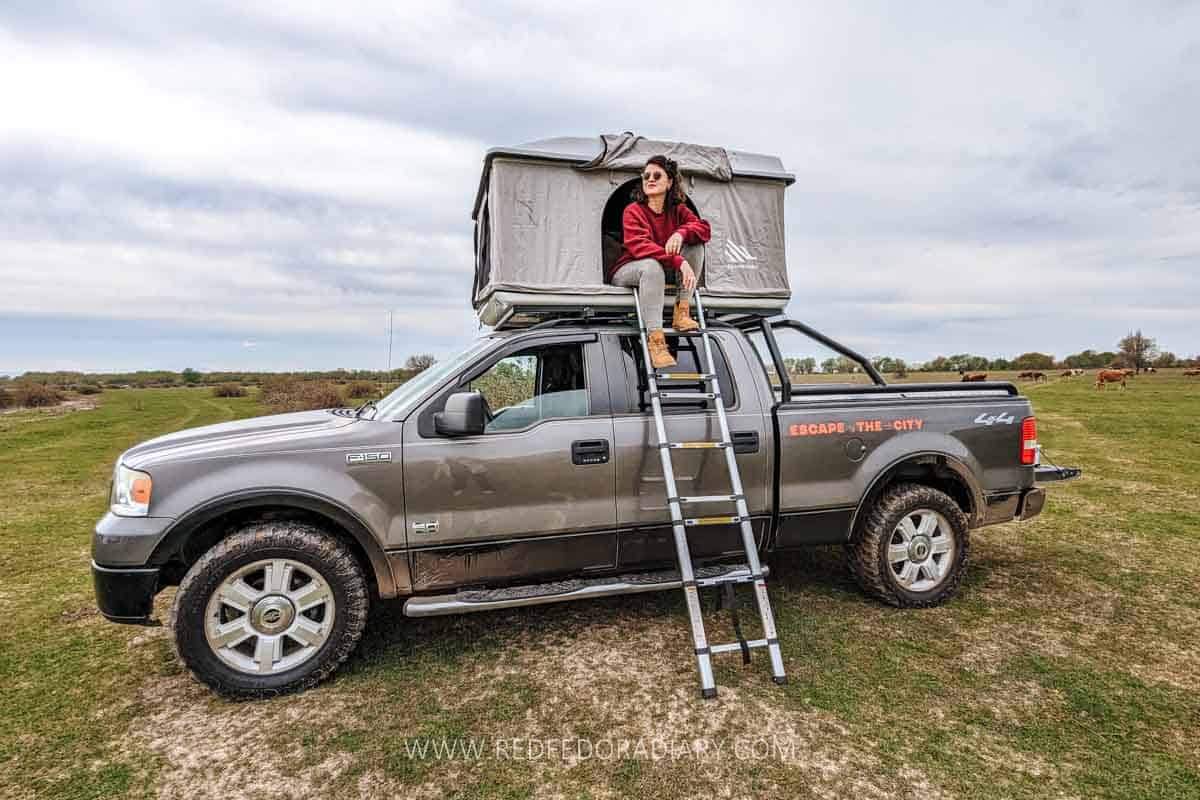
I understand that driving in Georgia may not be everyone’s preference, so I want to highlight an exceptional service called GoTrip.ge . This car rental service provides a skilled driver who can take you from point A to point B throughout the country while allowing unlimited stops along the way. It’s a convenient option that ensures a hassle-free journey. Moreover, the prices are very reasonable, making it an attractive choice for travelers.
Georgia travel tips: How to travel around Georgia
You have several options when traveling around Georgia: marshrutkas, buses, trains, and renting a car.
Marshrutka
Marshrutkas are the most frequent and preferred transportation when traveling to other cities in Georgia. It is fast and drives to remote areas, but they are the least comfortable ones with short leg space and uncomfortable chairs.
Vehicles depart from Didube and Navtlughi bus stations. Depending on the destination, marshrutkas run daily and hourly. There is no need to buy tickets before the departure – show up and ask where to find the one to your desired destination. You pay directly to the driver, or he will direct you to the ticket office.
Sadly, Georgia doesn’t have an organized bus system. The coach bus Metro Georgia, a Turkish company, operates mainly on the Georgia-Turkey route with stopovers to the major cities along the way, including Kutaisi and Batumi.
Omnibus is another option for traveling from Tbilisi to Batumi and Zugdidi (and vice versa) departing from Ortachala bus station.
Train
Georgia does have a moderately organized train system. However, the majority are of Soviet times, meaning that they are slower than buses and marshrutkas. We have the only somewhat fast train, Stadler, on the Tbilisi-Batumi route, which also stops at Kutaisi International Airport stop.
How to buy train tickets
Unfortunately, the website of the Georgia Railway is not very user-friendly. The best way to find the timetable is to Google your destinations, for instance, Tbilisi to Batumi train, and look for the railway.ge website.
Here’s the general timetable . Note that the second Departure column means that the train departs FROM the end destination, not the starting point.
You can buy tickets online by registering on the website and choosing the preferred option. The website will charge you a 1-2% commission when purchasing online. Another downside of Georgian Railway trains is that you can’t choose the seat when buying online or in the station itself.
Alternatively, Tkt.ge offers a more user-friendly experience for buying train tickets in Georgia. Unlike the official Railway website, you can only choose seats on Tbilisi-Batumi trains here. Sadly, for other destinations, the system automatically assigns you the seats. However, they charge extra for selecting seats and commissions using their website.
Other practical Georgia travel tips to know
Tap water is safe to drink .
Due to its proximity to the Caucasus Mountains, Georgia boasts many freshwater sources; therefore, tap water is safe to drink anywhere. Bottled water is cheap to buy as well. I recommend adjusting your tummy to Georgian water for the first two days and buying a bottled one to stay safe.
Then you can use your reusable water bottle to keep you hydrated on your travels. I have Stojo collapsible water bottle .
Electricity plugs
We have standard European plugs with 230 V, so there is no need for a travel adapter if you are coming from Europe. In other cases, you’ll definitely need a universal one .
ATMs and Money Withdrawal
ATMs are almost anywhere, no matter if it’s a big or a small city. The only problem you might see is finding them in remote villages. ATMs are safe to use here and even let you withdraw USD. Some even have EUR. Then you can exchange USD or EUR at exchange booths for a better rate than banks .
You can pay with cards almost everywhere, starting from cafes to small convenient shops. However, do carry cash just in case. And if traveling to remote mountainous villages, always have cash with you.
Georgia has three leading network provider companies, Magti, Silknet, and Beeline, now rebranding themselves as Celfie. They all have 4G or 4.5G internet service and various MB and GB packages.
Magti has the best coverage in Georgia, even in the mountain areas, so if you spend more time in the highlands, I suggest getting a Magti Card.
I have been a Silknet user for years because I love their low-cost local call package bundles. Their internet service is also alright but not as best as Magti’s. I use Silknet for calls and Magti eSIM for the internet.
Beeline (Celfie) is a Russian company with the lowest calls and internet bundle prices. However, their Internet service is relatively slow even though it’s 4G, and the coverage is very poor.
The best way to buy sim cards is to visit their service centers scattered across the city. The staff will help you set it up and choose the right bundle or package that suits your needs. The sim card prices vary by the company and start from 5 GEL.
I don’t recommend buying sim cards or tourist packages at airports. If you need to have a connection the moment you arrive in Georgia and before you get to the city center.
Instead, I recommend the Airalo app – it provides local eSIMs for a more affordable internet connection when traveling.
Tip: I use the Airalo app , which provides local eSIMs for a more affordable internet connection when traveling. Get 3 USD with code: BAIA2592 .
How to top up the sim card
If you run out of credit on your phone, the easiest way to top up a Georgian SIM card is via self-service payment machines. There are several different company machines all over the country, and every single of them is the same when it comes to topping up the sim card. Do note that they take a 4% commission. I usually top up through my internet bank with no extra fee.
Georgia travel tips: Local cuisine and drinks
Georgian cuisine is a delightful fusion of regional dishes shaped by numerous historical influences from invaders over the centuries. As a result, Georgian food exhibits traces of Mongolian, Turkish, Mediterranean, and Persian culinary traditions, resulting in a genuinely diverse culinary experience.

The local cuisine predominantly emphasizes meat, walnuts, dough, and spices. However, vegetarian visitors also have plenty of tasty vegetable and plant-based options.
Here’s a detailed guide to the best and my favorite restaurants in Tbilisi to try different Georgian food.
What to drink in Georgia:
- Georgian tea – tea industry here is slowly reviving, so you can try artisanal loose-leaf teas and have a tea-tasting ceremony.
- Wine – Georgia has broken the GUINNESS World Records for being the first winemaking country globally, producing the beverage for at least 8,000 years.
- Chacha – A strong local spirit made from the leftovers from wine production. However, today there are fruit versions as well.
- Sparkling waters – Georgia has plenty of mineral water sources, out of which Borjomi and Nabeghlavi are the absolute favorites of many locals.
- Lemonade – several companies that make lemonades in bottles are sweet, sparkly, and in different flavors. Tarragon and pear are local favorites. However, I love Laghidze Water’s lemonade, the original company I used to drink as a kid. It’s not bottled, so the best place to try them is at the following cafes: Puri Guliani, Stamba, Bazari Orbelianze, and Laghidze Water itself.
Georgia travel tips: Do’s and don’ts in Georgia
Georgians are recognized as a hospitable nation, where a guest is “a gift from God.” Therefore, Georgians pay a particular interest whether you are a local or a foreigner.
When you meet a Georgian and engage in a friendly conversation, don’t be surprised if they invite you to a family dinner. You can accept or kindly reject, and if you decide to go, make sure to go hungry ; the host will insist on eating every dish on the table and drinking as much wine as you can stomach.
The country is still a bit conservative regarding dressing and behavior etiquette. Avoid wearing short skirts/dresses or see-through clothes; you won’t be punished but will attract a staring eye.
Females should wear a headscarf to cover their heads and shoulders when entering churches and monasteries. Ideally, wear an up-to-knee skirt or a dress. Some churches provide scarves at the entrance, but having your own is better. Men can wear regular t-shirts and pants in churches; no strict rule applies here. Ideally, avoid shorts and tank tops . Do note that these rules are stern in monasteries outside the major cities.
- Don’t blow your nose and French kiss in public.
- Don’t start discussing politics and religion with a Georgian you just met.
- Do leave a tip if there is no extra service fee included in your bill
- Do take the usual safety precautions
- Avoid petting or encountering stray dogs. Some could be vaccinated, but most in remote areas and small towns may not.
My Favorite Travel Resources
To ease your travel planning, check out all the posts about Georgia travel . Additionally, here are some of the websites and services I use when preparing for my next adventure anywhere in the world.
✈ Book affordable flights on WayAway , a platform that shows the best flight deals, tours, and hotels. With a WayAway Plus membership, you can earn cashback . Get 10% off with code: RFD10
🚫 Get compensation for up to 700$ with Airhelp if your flight was canceled or delayed within the last 3 years.
🚗 Rent a car at Local Rent for affordable prices and convenient service.
❣ Pre-book a private car transfer with GoTrip from Tbilisi Airport to your hotel or any other city across Georgia.
💻 Get a VPN from Surfshark to protect your devices from hackers when using public Wi-Fi when traveling.
📱 Install the Airalo app , which provides local eSIMs for a more affordable internet connection when traveling. Get 3 USD with code: BAIA2592 .
💸 Use Wise to withdraw money in local currency without hidden fees and avoid high exchange rates. On top, you might get a Visa or Mastercard debit card .
🍷 For some of the best, expat-designed wine tours check out Eat!ThisTours . Get a 5% discount with code RFD5 .
🏨 Find budget-friendly deals on all sorts of accommodation types on Booking.com .
🩺 Buy the most flexible and budget-friendly travel insurance, SafetyWing , covering COVID .
☀ Book in advance some of the best city walks, cultural experiences, and day tours to maximize your stay and experience here.
Spread the word!
Very good review of Georgia for the visitors. All information is correct, just e-visa platform was closed unfortunatelly.
Thank you for notifing! Will update accordingly
Leave a Reply Cancel reply
Your email address will not be published. Required fields are marked *
This site uses Akismet to reduce spam. Learn how your comment data is processed .
Georgia Travel Guide
Snowy mountains, lush forest, and delicious wine. Georgia is one of the most ecologically diverse and underestimated nations.
Best time to visit Georgia
Travel insurance for georgia, best places to visit in georgia, 16 things to do in tbilisi, georgia (3-day guide), map of georgia, weather in georgia.
Georgia is a charming place to visit year-round. Spring (April-June) and Autumn (September-October) are great months to visit for a perfect blend of warmth and sunshine. The summer can heat up to 30-35 degrees, so walking around cities may get a little unbearable.
How to Travel Safe
How to plan a trip.
- Find Hotels via Booking.com
- Find Hostels via Hostelworld
- Find a Rental Car via Sunny Cars
- Find Cheap Flights via Skyscanner
- Get a Travel Insurance via Heymondo
- Book Tours & Attractions via Viator
- Book a Bus/Train/Transfer via 12Go
- Get a Visa via iVisa
- How to pack light for your trip
- How to plan your trip our tips
Why is Georgia worth visiting?
Still a reasonably unknown destination, Georgia has stunning landscapes, ancient charm, and warm hospitality. From the breathtaking Caucasus Mountains to the vibrant buzz of Tbilisi, and not forgetting incredible wine, the country has so much to offer!
Is Georgia cheap to visit?
Georgia is a great destination to visit on a budget! Feast on scrumptious khachapuri, explore historical wonders, and sip divine wine without breaking the bank. Of course, budget depends on travel styles and specific destinations, but there’s something for everyone.
Can I drink tap water in Georgia?
Tap water is entirely safe to drink throughout Georgia. Travel sustainably by bringing a reusable water bottle to keep yourself hydrated while exploring this beautiful country.
Do I need a visa for traveling to Georgia?
Amazing news! Georgia offers visa-free travel to 98 countries for up to one year, allowing you to enjoy a hassle-free adventure. Nevertheless, it’s always worth checking your country’s entry requirements before your trip.
What language do they speak in Georgia?
In Georgia, the official language is Georgian. Due to the script type, it can be pretty challenging to pick up, but learning a few phrases, such as გამარჯობა pronounced ‘gamarjoba’, is a fantastic way to bond with locals. Don’t worry, though; English is also widely spoken.
Do I need travel insurance for Georgia?
Wherever you go in the world, it’s crucial to have travel insurance. Explore Georgia’s incredible cities, mountains, and unique sites worry-free by being protected from unexpected surprises such as injuries, lost belongings, and delays.
Is Georgia safe?
Despite common misconceptions, Georgia is one of the world’s safest destinations to travel. Like any country, always exercise caution, specifically in busier destinations like Tbilisi, keeping valuables secure and avoiding scams.
What power plug type does Georgia have?
Georgia uses plug types C and F. Type C has two round pins, and Type F has two round pins with two earth clips. Make sure to pack a suitable adapter or purchase one at the airport to keep your devices charged throughout your trip.
Why do people love Georgia?
Georgia usually takes travelers by complete surprise! As a transcontinental country between Europe and Asia, Georgia is home to warm-heated locals, mountainous adventures, incredible food and wine, charming houses, and so much more!
Traveling in Georgia
Nestled between Eastern Europe and Western Asia, traveling in Georgia provides endless adventures. It’s known for its diverse landscapes, home to the soaring peaks of the Caucasus Mountains, the rolling vineyards of Kakheti, and the beautiful cobbled capital city of Tbilisi, full of historic architecture. Spend your days exploring the incredible sites, sipping on a refreshing glass of wine, and skiing or hiking down the breathtaking mountains.
How to plan your trip to Georgia
Follow our Georgia travel guides for an incredible holiday in Georgia . There are endless options: explore the charming capital of Tbilisi (with artsy architecture, cobbled streets, and countless photo opportunities), road trip to the wine region of Kakheti and the ancient cave city of Uplistsikhe, ski in Gudauri, or relax by the Black Sea in Batumi. Whatever you choose, there are so many amazing things to do in Georgia for an unforgettable adventure!
Georgia is the perfect place to travel year-round, with each season offering something a little different, from snow-capped mountains in the winter to sunny beach days in the summer.
Spring and Autumn: The best time to visit Georgia is in Spring (April, May, June) and Autumn (September and October). During these months, the weather is mild, the sun is usually shining, and nature is lush and picturesque, perfect for outdoor activities without the extremes of summer or winter. This is the best time to hike through the Caucasus mountains or stroll through the historic streets of Tbilisi during your vacation in Georgia.
Winter: The weather in Georgia during the winter months, from November to March, offers an entirely different allure. The mountainous regions transform into a winter wonderland, attracting skiers and snowboarders to destinations like Gudauri and Bakuriani. The crisp air and snow-covered landscapes add a magical touch, creating a cozy ambiance.
Summer: July and August are the hottest months, often reaching 30-35 degrees in the lowland areas, making it very hot for exploring cities like Tbilisi. However, summer is the best time to visit Georgia if you’re planning a coastal getaway along the Black Sea. Or, if you’re planning to explore the mountainous regions, temperatures can be milder, great for outdoor activities.
Coastlines and beaches in Georgia
Not necessarily the first place people think of when planning a beach vacation, Georgia is home to a beautiful coastline along the Black Sea, a hidden paradise for beach enthusiasts.
Batumi, Georgia’s biggest coastal resort, is renowned for its modern architecture, vibrant atmosphere, street art, botanical garden, and stony beachfront. Hire a bike and explore the promenade, or if you’re feeling active, cycle all the way to Gonio Fortress near the border of Turkey, about 15 km one way.
Close to Batumi is Kvariati Beach, offering a more secluded and authentic coastal experience. A lush mountainous backdrop, crystal clear waters, and charming beachfront cafes create an idyllic setting for a peaceful break.
One of the most famous beaches in Georgia is Ureki Beach, which has soft golden sand and is believed to have therapeutic benefits for treating various ailments. The coastline transforms into a haven for wellness seekers, where the warm water and dark sands provide a natural spa-like experience.
Food, culture, and religion in Georgia
Georgia has it all! As you wander through the country, get ready to dive into a world where every dish is a flavor explosion, the streets are packed with unique architecture and history, and religion is a massive part of daily life.
Food: Georgian cuisine incorporates influences from Asia, Iran, Turkey, and the Mediterranean, each with a distinctive identity. Try the national treasure of khachapuri, a cheese-filled bread, or the succulent khinkali, a traditional dumpling stuffed with spices, meat, fish, or vegetables. No Georgian meal is complete without a refreshing glass of wine, with most locals having their own vines planted in their back garden.
Culture: Not only do food and wine play a massive role in Georgian culture , but so do hospitality, music, and dance. Music and dance are reflected through unique melodic folk songs, often used to express feelings, and are highly respected throughout the country. Most visitors are often surprised by the genuine kindness of locals, welcoming them into their homes, evident through “supra”, meaning tablecloth, where food fills the table, and groups enjoy socializing and wine together.
Religion: Most of the population identifies as Eastern Orthodox Christian, following the Julian calendar. This means they celebrate Christmas on January 7th and New Year’s twice, on January 1st and January 13th, among other celebrated traditions on their calendar. Despite being predominantly Orthodox Christian, Georgians embrace religious diversity and welcome different beliefs throughout the country.
Why you should travel to Georgia
Picture a range of landscapes, such as snowy mountain peaks, sun-kissed beaches along the Black Sea, medieval castles perched on hills, cobblestone cities with ornate balconies, and futuristic architecture. For nature enthusiasts, the diverse landscapes extend to Svetitskhoveli Cathedral in Mtskheta, a UNESCO World Heritage Site that boasts architectural grandeur. With its iconic defensive towers, the picturesque Svaneti region offers a glimpse into Georgia’s mountainous charm. Wine lovers will find happiness in the country’s wine region of Kakheti, where vineyards stretch as far as the eye can see. Georgia has so much waiting to be discovered!
What sets Georgia apart is not just its breathtaking scenery but the warmth of its people; Georgia is arguably one of the most welcoming countries in the world. So, whether you’re exploring the best places in Georgia or creating connections beyond the typical tourist experience, Georgia promises an authentic journey that makes every traveler feel like they’ve found a second home.
Safety and travel advice Georgia
Crime and safety in Georgia : Due to its geographical location, many believe Georgia is unsafe. However, thanks to the warm hospitality, crime rates are relatively low. As with any destination, it’s wise to stay vigilant and exercise common sense. Keep an eye on your belongings in crowded places, and be cautious in less touristy areas, especially at night.
Natural Disasters: Georgia is prone to frequent small earthquakes, so staying informed about local conditions is advisable, especially if you plan to explore more remote areas. Always follow advice from local authorities and register at your embassy for emergency updates.
Travel Insurance: Before heading on your holiday in Georgia , make sure to purchase travel insurance for your trip. This will cover medical emergencies, trip cancellations, and lost luggage. If you plan to hike or ski, check if your insurance covers activities like these.
Check out these great travel insurance options .
Outdoor Activities: Georgia’s diverse landscapes welcome outdoor enthusiasts, offering activities like hiking, skiing, and paragliding. While these activities are thrilling, it’s crucial to prioritize safety. Always use reputable guides for more challenging hikes or extreme sports, bring appropriate clothing and sturdy footwear, and check weather conditions before embarking on outdoor adventures.
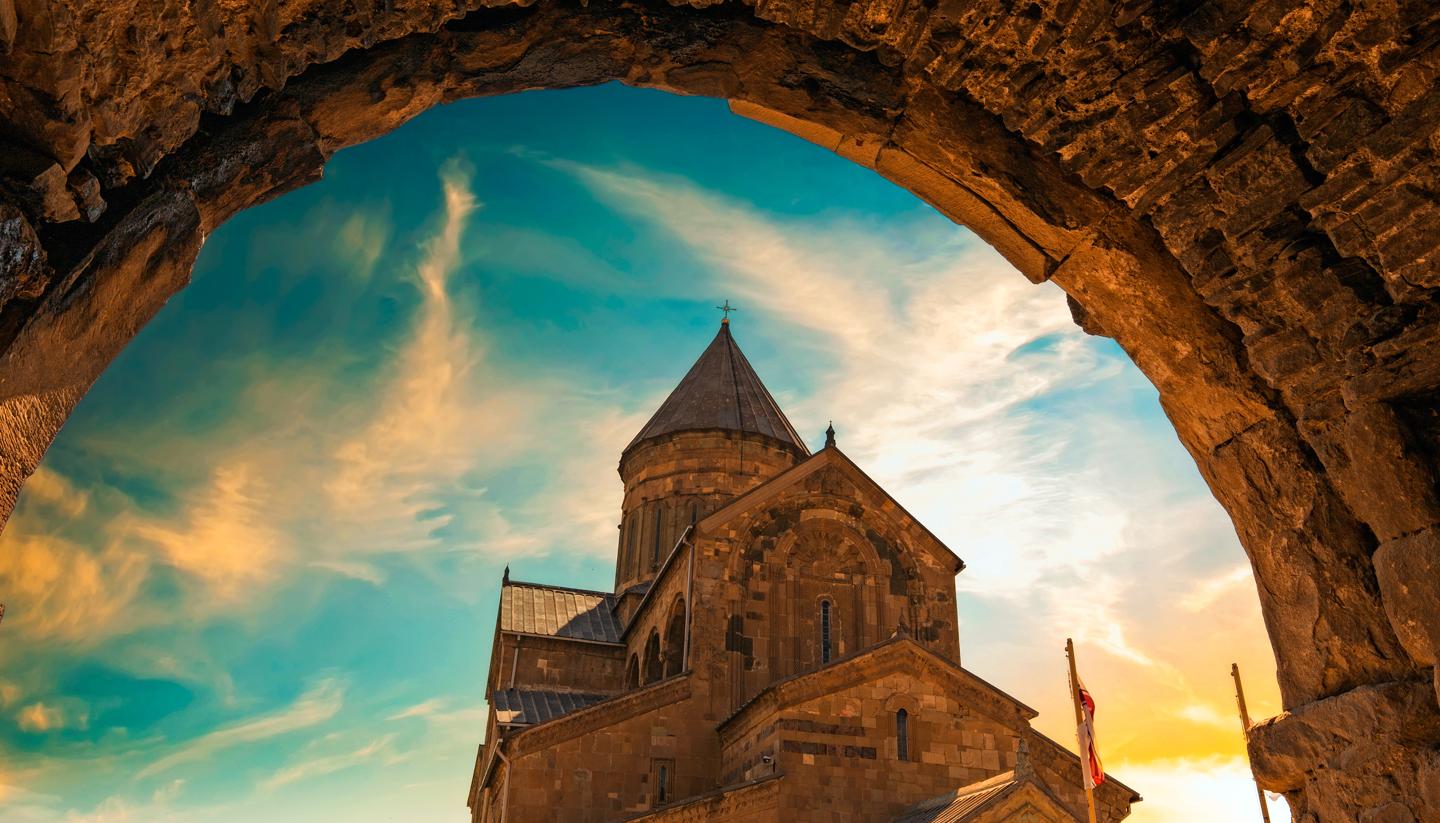
Introducing Georgia
About georgia.
- Images of Georgia
- History, language & culture
- Weather & geography
- Doing business & staying in touch
Plan your trip
- Travel to Georgia
- Where to stay
While you’re there
- Things to see & do
- Shopping & nightlife
- Food & drink
- Getting around
Before you go
- Passport & visa
- Public Holidays
- Money & duty free
Book your flights
- Tbilisi International Airport
Georgia travel guide
It’s extremely easy to love Georgia. Formerly famed as the holiday haunt of the privileged elite of the Soviet Union, today’s country is an often overlooked but deeply rewarding travel destination.
A location at the historical crossroads of Europe, Asia, Russia and the Middle East means it still draws influences from all four, and the end result is a heady one. From its mountain-perched monasteries to its valley-floor vineyards, and from its Turkish-style food to its remarkable capacity for hospitality to strangers, Georgia represents a very special slice of the Caucasus.
Capital city Tbilisi, spread along the banks of the Mktvari River, is an enjoyable but sometimes jumbled mix of old and new. Incense-fogged churches and traditional bathhouses share the city with broad avenues and gleaming new towers, while crowning the skyline is a huge statue of “Mother Georgia” – holding a sword in one hand to ward off enemies, and a goblet of wine in the other to welcome friends.
It’s a sign of how tumultuous the country’s history has been, although it’s also worth pointing out that travellers and visitors fall firmly into the “friends” camp. Georgia, incidentally, claims to be the birthplace of wine – viticulture has been practiced here for more than 6,000 years.
Elsewhere in the country, highlights include the remote uplands of Svaneti, the relaxed Black Sea resort of Batumi, the spectacular hiking and horse-trekking trails of Tusheti and the tangled historical web of second city Kutaisi. Talking of tangled, the Georgian alphabet at times resembles a thicket of twisted fish-hooks, and its presence on everything from street placards to the endless marshrutkas (minibuses) that ply the roads adds an extra sense of foreignness to travel here.
Georgia is an endlessly absorbing destination, a beautiful and beguiling nation made all the more rewarding by its bottomless hospitality and friendly inhabitants.
69,700 sq km (26,911 sq miles).
3,971,368 (UN estimate 2016).
70.7 per sq km.
Parliamentary republic.
President Salome Zurabishvili since 2018.
Prime Minister Irakli Kobakhidze since February 2024.
Travel Advice
The Foreign, Commonwealth & Development Office ( FCDO ) provides advice about risks of travel to help British nationals make informed decisions. Find out more about FCDO travel advice .
Areas where FCDO advises against travel
Your travel insurance could be invalidated if you travel against FCDO advice. Consular support may be limited where FCDO advises against travel.
South Ossetia and Abkhazia
For security reasons, FCDO advises against all travel to the breakaway regions of:
- South Ossetia
FCDO also advises against all but essential travel to:
- areas immediately next to the administrative boundary lines with South Ossetia
- areas immediately next to the administrative boundary lines with Abkhazia
FCDO cannot provide emergency services to British nationals travelling in South Ossetia and Abkhazia, as British government employees are restricted from travelling there.
Find out more about why FCDO advises against travel .
Before you travel
No travel can be guaranteed safe. Read all the advice in this guide as well as support for British nationals abroad which includes:
- advice on preparing for travel abroad and reducing risks
- information for women, LGBT+ and disabled travellers
Follow and contact FCDO travel on Twitter , Facebook and Instagram . You can also sign up to get email notifications when this advice is updated.
Travel insurance
If you choose to travel, research your destinations and get appropriate travel insurance . Insurance should cover your itinerary, planned activities and expenses in an emergency.
This advice reflects the UK government’s understanding of current rules for people travelling on a full ‘British citizen’ passport from the UK, for the most common types of travel.
The authorities in Georgia set and enforce entry rules. If you’re not sure how these requirements apply to you, contact the Embassy of Georgia in the UK .
COVID-19 rules
There are no COVID-19 testing or vaccination requirements for travellers entering Georgia.
You might be asked to wear masks in hospitals.
Passport validity requirements
If you’re visiting Georgia, your passport should be valid for the length of your visit.
Check with your travel provider to make sure your passport and other travel documents meet their requirements. Renew your passport if you need to.
You will be denied entry if you do not have a valid travel document or try to use a passport that has been reported lost or stolen.
Visa requirements
British nationals do not need a visa to visit Georgia for up to one year. To stay longer or to travel for work or study, you must apply for a longer-term visa. Contact the Georgian Ministry of Foreign Affairs for more information.
If you’re in Georgia for more than 183 days and do any paid employment, you’re automatically liable for income tax and must tell the Revenue Service of Georgia . This applies whether you are on a visitor’s permit or officially resident. You’ll be fined if you do not comply.
All visitors to Georgia must have adequate travel insurance to cover all healthcare needs during their visit. You may be asked for evidence of this, either by your airline at check-in or by immigration authorities when you arrive in Georgia. You may face difficulties if you do not have this evidence.
Make sure you have adequate travel health insurance and accessible funds to cover the cost of any medical treatment abroad and repatriation.
Travelling with medicines
Georgia has a very strict anti-drugs policy. This can also cover prescription and non-prescription medicines commonly available in the UK. For example, non-prescription medicines containing codeine are illegal.
This can cause serious problems for travellers and in some cases lead to prosecution. Foreign nationals have been detained on arrival for having medicines that would not normally cause problems in the UK.
For more information on the legal status of a specific medicine, contact the Revenue Service of Georgia or the Embassy of Georgia in the UK .
If you plan to travel with prescription medicine, you must carry a doctor’s prescription and ideally the original packaging.
You should also read FCDO ’s warnings and regional risks advice for Georgia.
There is a high threat of terrorist attack globally affecting UK interests and British nationals, including from groups and individuals who view the UK and British nationals as targets. You should remain vigilant at all times.
UK Counter Terrorism Policing has information and advice on staying safe abroad and what to do in the event of a terrorist attack. Find out how to reduce your risk from terrorism while abroad .
Terrorism in Georgia
Terrorist attacks in Georgia can’t be ruled out. Attacks could happen anywhere and affect western interests and places visited by foreigners, such as tourist sites and cultural events.
Political situation
The political situation in Georgia is generally calm.
Demonstrations
Demonstrations and rallies can occur, particularly:
- around Rustaveli Avenue in Tbilisi
- in large towns
Demonstrations are usually policed, but tensions can escalate without warning. You should:
- check local media
- avoid large gatherings and demonstrations
- follow the advice of local authorities
Crime levels are low. You should:
- take sensible precautious to avoid pick-pocketing, particularly in crowded places
- not leave valuables unattended
- stay aware of your surroundings
- keep your mobile phone charged and with you at all times
Georgian law protects everyone’s human rights and equality, but ethnic minorities and LGBT+ people may face discrimination. Harassment and assault based on race and sexuality do take place.
If someone attempts to assault you or you feel threatened, call the emergency number 112 and ask for the police.
Laws and cultural differences
Personal id.
You’re advised to carry a copy of your passport at all times. Keep the original in a safe place.
Cultural differences
Tbilisi is a cosmopolitan city. There can be more conservative attitudes in rural areas. When travelling outside cities, be aware of cultural sensitivities around modest dress (particularly in places of worship) and open displays of affection.
Prices may be quoted in US dollars and euros, but goods and services must be paid for in local currency (lari).
Travellers’ cheques are rarely accepted. Outside major towns, you may not find ATMs or be able to use credit and debit cards. Take enough cash in lari if travelling to rural or remote areas.
Illegal drugs and prison sentences
If you use illegal drugs of any kind, you can get heavy fines or long prison terms. Smuggling even very small amounts of drugs carries a prison term of 5 to 25 years and heavy fines.
Using cameras
Do not photograph sensitive sites like military bases and power installations.
Be aware of cultural sensitivities when photographing churches and other religious sites.
Some visitors have been stopped from photographing the Presidential Palace in Tbilisi.
Check for any signs telling you not to take photographs. Always seek permission if in doubt.
LGBT+ travellers
Homosexuality is legal in Georgia, and there are anti-discrimination laws, but same-sex relationships are still not widely accepted.
Showing affection in public may result in discrimination or harassment. Homophobic harassment and assault take place.
Pride marches in 2019 and 2021 were cancelled because the police did not guarantee security. In 2023, a Pride event was cancelled after a violent protest.
Read more advice for LGBT+ travellers .
Disabled travellers
Accessibility standards in Georgia are below UK standards. Very few public or private facilities are accessible.
Most public transport does not accommodate disabled travellers.
There are few pavements outside of main cities and pavements are generally uneven.
Read our general advice for disabled travellers .
A law banning surrogacy for foreign couples is expected to be adopted by the Georgian Parliament in the near future. Keep up to date by signing up to our Georgia travel advice .
If you’re visiting Georgia to arrange an international surrogacy, consider the risks and challenges involved. Surrogacy is a complex, lengthy process. You should:
- make sure you’re aware of the facts and well-prepared before starting the process
- get specialist legal advice on Georgian and UK laws before making any arrangements
- read FCDO and Home Office guidance on surrogacy overseas
- research clinics and hospitals thoroughly to make sure they are safe and reputable
The British Embassy cannot get involved in surrogacy arrangements or recommend hospitals or clinics.
Commissioning a surrogacy will not automatically mean that the child holds British citizenship. To bring your child born through surrogacy from Georgia to the UK, you must apply for a full British passport . You need a Georgian birth certificate for this. Check the Public Service Hall and Service Development Agency websites and research the rules for leaving the country with children (some legal details are in Georgian only). You can stay visa-free in Georgia for a continuous period of up to one year. The Ministry of Foreign Affairs of Georgia has more information.
Trade with South Ossetia and Abkhazia
Anyone trading with Abkhazia and South Ossetia needs a licence issued by the Georgia government. This includes buying and selling property and most financial transactions. Anyone trading without a licence may face penalties under Georgian civil and criminal law.
Outdoor activities and adventure tourism
Make sure your travel insurance covers your activities.
If you get into trouble during hiking, skiing, adventure travel or extreme sports, the emergency response may be limited.
Off-piste skiing is very dangerous. It can be difficult to get accurate information on mountain conditions, including avalanche risks. Read our information on staying safe during skiing and winter sports .
If you’re trekking, mountaineering, climbing, off-piste skiing or doing other extreme sports, consider going with specialist guides. Many insurance policies will not cover damage to rental equipment or skiing off-piste without a guide.
Be aware that safety standards in Georgia may not be as high as those in the UK. For example, several people were injured when a ski lift at Gudauri malfunctioned in 2018 and a tourist helicopter crashed near Stepantsminda (Kazbegi) in 2019.
If you plan to hike close to the administrative boundary lines, consider hiring a professional guide.
Transport risks
Take usual precautions after dark in unfamiliar areas.
Street lighting away from main roads can be poor and pavements uneven. There may be occasional short power cuts – consider carrying a torch.
Taxi provision and safety has improved significantly. To stay safe using taxis:
- do not flag taxis in the street
- try to pre-book taxis through an app
- check the taxi has working seatbelts
Road travel
If you’re planning to drive in Georgia, see information on driving abroad and read the RAC Georgia guide .
You can drive in Georgia with a UK driving licence for up to one year (from when you last entered Georgia). To drive for longer, you need a 1949 or 1968 international driving permit (IDP) or Georgian driving licence. If you’re hiring a car, check the rules with the car hire company before you travel. They may require you to have an IDP.
You cannot buy an IDP outside the UK, so get one before you travel.
Drink driving punishments can be severe. Georgia has a lower blood alcohol content limit than the UK, so avoid alcohol if driving.
Driving conditions
Take care when driving, especially at night. Be aware that:
- roads outside city centres are often badly lit and poor quality
- stray livestock can be a hazard
- road markings and the right of way can be confusing
- many cars are poorly maintained
- driving can be erratic
- heavy rain, flooding and snow at higher altitudes can affect roads and bridges making travel difficult or impossible (particularly in remote areas)
- landslides are common
If you’re travelling outside Tbilisi, particularly in remote areas, make sure your vehicle is equipped and check weather conditions locally.
Rail travel
Take usual precautions with your personal safety and belongings. Compartments on sleeper trains usually have locks.
There is currently no train service between Azerbaijan and Georgia.
Extreme weather and natural disasters
There are frequent small earthquakes in Georgia. The most recent significant earthquake took place in 2022 – an earthquake measuring 6.2 struck 104km south-west of Tbilisi. Read the US Federal Emergency Management Agency advice on what to do before, during and after an earthquake .
Lightning and wildfires are a risk in summer, particularly in the mountains.
This section has safety advice for regions of Georgia. It only covers regions where FCDO has specific advice.
You should also read FCDO ’s overall travel advice and safety and security advice .
The administrative boundary lines with the breakaway regions of Abkhazia and South Ossetia are generally unmarked and away from roads. Take care not to cross the lines – you could be arrested by the region’s self-declared authorities.
The Georgia and UK governments do not recognise the unilateral declarations of independence by the breakaway regions of South Ossetia and Abkhazia. Following international law, the Georgian government claims the right to exercise sovereignty in these territories. The UK government, along with almost all other states, recognises Georgia’s right to do this.
Consular support is not available in Abkhazia and South Ossetia.
Buying property in South Ossetia and Abkhazia
Ownership of many properties in these regions is disputed. There are thousands of claims to property ownership from people displaced by conflicts following the collapse of the USSR.
Buying these properties could have serious financial and legal implications, including legal proceedings in Georgia’s courts and enforcement of court judgements elsewhere in Europe. If territorial disputes are settled, this could have consequences. For example, property may need to be returned to its original owners (property restitution).
Travel to and from Russia
It is illegal under Georgian law to enter Georgia from Russia through South Ossetia or Abkhazia. If you do this, you could get heavy fines or a prison sentence of up to 4 years. If your passport has entry or exit stamps from the self-declared authorities in these regions, Georgian authorities may see this as illegal entry through an unrecognised border crossing.
If you’re considering travelling to Russia through the land borders with Russia, check FCDO ’s Russia travel advice . FCDO advises against all travel to Russia.
Unexploded weapons in border and boundary areas
There is some risk from unexploded weapons:
- along the administrative boundary lines with South Ossetia and Abkhazia
- near the border with Azerbaijan (Red Bridge area in particular)
Areas where there might be unexploded weapons are not always marked. Go with a local guide or tour group if visiting these areas.
Border with Azerbaijan
The land border with Azerbaijan has been closed since the start of the COVID-19 pandemic.
If you visit the Udabno caves at the Davit Gareja monastery site, take care not to cross the Georgia-Azerbaijan border. It is unmarked in this area and disputed. There are border guides in the area – seek their advice if you’re unsure.
Before you travel check that:
- your destination can provide the healthcare you may need
- you have appropriate travel insurance for local treatment or unexpected medical evacuation
This is particularly important if you have a health condition or are pregnant.
Emergency medical number
Dial 112 and ask for an ambulance.
Contact your insurance company promptly if you’re referred to a medical facility for treatment.
Vaccinations and health risks
At least 8 weeks before your trip check:
- the latest information on vaccinations and health risks in TravelHealthPro’s Georgia guide
- where to get vaccines and whether you have to pay on the NHS travel vaccinations page
Altitude sickness is a risk in parts of Georgia, including Gudauri ski resort, Mount Kazbegi, and Mount Tetnuldi. Read more about altitude sickness on TravelHealthPro .
Health risks include:
- rabies – treatment is available in Tbilisi and major towns. If you’re bitten or scratched by a dog, get medical attention immediately.
- venomous snakes (vipers), particularly in early summer – few medical facilities outside major towns have anti-venom
- varying water quality – bottled water is widely available
The legal status and regulation of some medicines prescribed or bought in the UK can be different in other countries.
Read best practice when travelling with medicines on TravelHealthPro .
The NHS has information on whether you can take your medicine abroad .
For more information on travelling with medicines to Georgia, see Entry requirements . For information on the legal status of a specific medicine, contact the Georgian Embassy in the UK .
Healthcare facilities in Georgia
The UK does not have a reciprocal healthcare agreement with Georgia. You (or your travel insurer) will need to pay for all treatment as it’s provided.
Medical facilities in Tbilisi are available but can be expensive. Outside Tbilisi, medical facilities are limited.
FCDO has a list of English-speaking doctors in Georgia .
There is also guidance on healthcare if you’re living in Georgia .
Travel and mental health
Read FCDO guidance on travel and mental health . There is also mental health guidance on TravelHealthPro .
The Foreign, Commonwealth & Development Office ( FCDO ) cannot provide tailored advice for individual trips. Read this travel advice and carry out your own research before deciding whether to travel.
Emergency services in Georgia
Telephone: 112 (ambulance, fire, police)
Contact your travel provider and insurer
Contact your travel provider and your insurer if you are involved in a serious incident or emergency abroad. They will tell you if they can help and what you need to do.
Refunds and changes to travel
For refunds or changes to travel, contact your travel provider. You may also be able to make a claim through insurance. However, insurers usually require you to talk to your travel provider first.
Find out more about changing or cancelling travel plans , including:
- where to get advice if you are in a dispute with a provider
- how to access previous versions of travel advice to support a claim##
Support from FCDO
FCDO has guidance on staying safe and what to do if you need help or support abroad, including:
- finding English-speaking lawyers , funeral directors and translators and interpreters in Georgia
- dealing with a death in Georgia
- being arrested or imprisoned in Georgia
- getting help if you’re a victim of crime
- what to do if you’re in hospital
- if you’re affected by a crisis , such as a terrorist attack
Contacting FCDO
Follow and contact FCDO travel on Twitter , Facebook and Instagram . You can also sign up to get email notifications when this travel advice is updated.
You can also contact FCDO online .
Help abroad in an emergency
If you’re in Georgia and you need emergency help from the UK government, contact the British Embassy Tbilisi .
FCDO in London
You can call FCDO in London if you need urgent help because something has happened to a friend or relative abroad.
Telephone: 020 7008 5000 (24 hours)
Find out about call charges
Risk information for British companies
The Overseas Business Risk service offers information and advice for British companies operating overseas on how to manage political, economic, and business security-related risks.

Book a Hotel
© Columbus Travel Media Ltd. All rights reserved 2024
Cookies on GOV.UK
We use some essential cookies to make this website work.
We’d like to set additional cookies to understand how you use GOV.UK, remember your settings and improve government services.
We also use cookies set by other sites to help us deliver content from their services.
You have accepted additional cookies. You can change your cookie settings at any time.
You have rejected additional cookies. You can change your cookie settings at any time.
- Passports, travel and living abroad
- Travel abroad
- Foreign travel advice
Getting help
The Foreign, Commonwealth & Development Office ( FCDO ) cannot provide tailored advice for individual trips. Read this travel advice and carry out your own research before deciding whether to travel.
Emergency services in Georgia
Telephone: 112 (ambulance, fire, police)
Contact your travel provider and insurer
Contact your travel provider and your insurer if you are involved in a serious incident or emergency abroad. They will tell you if they can help and what you need to do.
Refunds and changes to travel
For refunds or changes to travel, contact your travel provider. You may also be able to make a claim through insurance. However, insurers usually require you to talk to your travel provider first.
Find out more about changing or cancelling travel plans , including:
- where to get advice if you are in a dispute with a provider
- how to access previous versions of travel advice to support a claim##
Support from FCDO
FCDO has guidance on staying safe and what to do if you need help or support abroad, including:
- finding English-speaking lawyers , funeral directors and translators and interpreters in Georgia
- dealing with a death in Georgia
- being arrested or imprisoned in Georgia
- getting help if you’re a victim of crime
- what to do if you’re in hospital
- if you’re affected by a crisis , such as a terrorist attack
Contacting FCDO
Follow and contact FCDO travel on Twitter , Facebook and Instagram . You can also sign up to get email notifications when this travel advice is updated.
You can also contact FCDO online .
Help abroad in an emergency
If you’re in Georgia and you need emergency help from the UK government, contact the British Embassy Tbilisi .
FCDO in London
You can call FCDO in London if you need urgent help because something has happened to a friend or relative abroad.
Telephone: 020 7008 5000 (24 hours)
Find out about call charges
Risk information for British companies
The Overseas Business Risk service offers information and advice for British companies operating overseas on how to manage political, economic, and business security-related risks.
Related content
Is this page useful.
- Yes this page is useful
- No this page is not useful
Help us improve GOV.UK
Don’t include personal or financial information like your National Insurance number or credit card details.
To help us improve GOV.UK, we’d like to know more about your visit today. We’ll send you a link to a feedback form. It will take only 2 minutes to fill in. Don’t worry we won’t send you spam or share your email address with anyone.
The Rick Steves guide to life
Travel mogul. philanthropist. legal weed champion. the real rick steves is so much more complex than who you see on tv..

EDMONDS, Wash. — At first glance, it is hard to tell that Rick Steves is protesting.
In the center of his hometown, America’s favorite travel host is perched on the edge of a fountain roundabout engaging in some friendly civil disobedience. As cars circle the intersection, Steves smiles and waves, looking more like an Elf on a Shelf than an angry picketer. This is his way of reminding people he wishes they’d stop driving here.
Steves’s family moved to Edmonds when he was 12, and the 68-year-old is still happy to call it home. Rather than relocate to his beloved Europe, he dreams of bringing some European sensibilities to the edge of the Puget Sound, less than 20 miles north of Seattle.
When he’s not traveling around Europe, writing about Europe or running his multimillion dollar European tour company, the prolific TV host and author likes to squeeze in some local activism. The roundabout routine is his push to block off Edmonds’s very American Main Street for pedestrians. If you squint at it, you can see what Steves sees: this would be the perfect place for a lively town square.
“I like a lot of things about Europe but I love the urban energy of Europe. I love the piazza,” Steves said in a wistful tone you might recognize from PBS. “We don’t have a piazza.”
Unfortunately for Steves, the voting majority of the city does not love the idea of parking their SUVs farther away to shop. So despite his Boy Scout enthusiasm, the most famous man in Edmonds must keep up the perch-and-wave. This is not his only crusade.
Spend any amount of time with Steves, and you’ll encounter a total ham who loves a zany bit. But if you ask him about serious issues like car-free zones, he’ll bring up other causes that are dear to him: affordable housing, supporting the arts, creating senior centers for the elderly to age with dignity.
He’s anti-Trump and pro-cannabis. He does not care if that is bad for business.
The average Rick Steves fan has likely missed this side of him. On TV they see an always-sunny history lover who makes going abroad feel approachable for the average American. That’s an incomplete picture, like thinking you know Paris because you’ve seen the Eiffel Tower on YouTube.
Meet him in Edmonds, and he’ll fill in the rest.
It may look like a lot of gallivanting, but being Rick Steves takes a lot of work.
He spends three months of the year overseas, researching, writing, recording, refining tours, updating guidebooks. If he’s not planning or producing content, he’s often doing promotional events across the United States. This year Steves is celebrating the 40th edition of his first book, “Europe Through the Back Door.” Over the course of his career, he’s built a privately held company that generates $120 million in revenue a year, published 110 books, filmed 12 seasons of “Rick Steves’ Europe” and produced more than 750 podcast episodes.
“It’s just like coordinating a three-ring circus,” Steves said.
That is: really fun, sort of exhilarating and extremely complicated. To pull this off, Steves does not observe the French 35-hour workweek. He’s a workhorse with a reputation for keeping a frenetic pace year-round.
“It’s more of an American work culture,” Amy Duncan, Steves’s communications director, told me. “He’s an unapologetic capitalist but he is also a socialist.”
He makes enough money to fly first class, but he only sits in economy, claiming he doesn’t mind being cramped.
“It never occurred to me that I’m suffering,” he said. “As long as I’ve got an aisle and a seat that reclines, I’m happy.”
Actually, Steves believes airlines should only have one class. It’s part of his egalitarian worldview. He’s also anti-points and anti-miles, refusing to sign up for airline loyalty programs because he believes they bully us into complicating our lives.
Steves also enforces a self-imposed “ carbon tax ” on his tour company, which takes more than 30,000 people to Europe annually. For every customer, Steves invests $30 to atone for emissions created by their flights between the United States and Europe. Last year, that added up to $1 million donated to a portfolio of organizations, Steves said.
“I don’t need to be a slave to the quarterly profit statement. I want to be around and profitable in 10 years from now in a world that you can travel in that’s stable,” Steves said. “This is a smart investment and it’s an ethical expense that I should pay for.”
Rick Steves will tell you he’s motivated by making money; the more he can earn, the more good he can do with it.
“Vicarious consumption, that’s one of my things,” Steves said.
After amassing a windfall from the 2001 George W. Bush tax cuts for high earners, Rick Steves donated $1 million to support the local symphony and performing arts center. In 2005, he used retirement savings to buy a 24-unit apartment complex for the local YWCA’s use as transitional housing for women and children. He figured he’d eventually sell the complex and live on the earnings. About a decade later, he changed his mind and donated the complex valued at $4 million.
He also gave more than $4 million to help build the Edmonds Waterfront Center, a vibrant gathering place for seniors where his daughter had her wedding in 2021. And he gave another $2 million for a similar center in the nearby city of Lynnwood, which broke ground in mid-April .
“Rick puts his money where his mouth is,” said Nancy Leson, a former Seattle Times food critic who used to let Steves’s daughter babysit her son. She’s appreciated his regular presence in the community, like hosting events for local politics at his house and shopping at the farmers market .
“He changed travel,” local resident Karen Howe said on her way into the Waterfront Center with a friend. She’s used Steves’s guidebooks for years. “He’s introduced us to places that most of us would never think of going.”
Rick Steves hasn’t won his piazza battle, but he has brought European touches to Edmonds. At the Rick Steves’ Europe headquarters, there’s an E.U. flag hanging from the mocha brick facade. And gargoyles that drain rainwater, just like at the Notre Dame cathedral.
“Gargoyles scare away evil spirits,” Steves points out, unable to suppress his inner tour guide.
Here Steves employs more than 100 people: editors, audio producers, tour specialists and cartographers such as Dave Hoerlein, his first employee. That’s excluding the fleet of guides and drivers he contracts across the pond to shepherd tour customers.
Inside, he bounds through a maze of cubicles, his neck craned forward, always at an eager pace. His 6-foot frame appears leaner than previous seasons of his life, but his signature look is familiar. No, not khakis and a button-down. That’s vintage Rick. These days, he wears dark jeans and a button-down, plus a thin scarf and leather sneakers.
During a day of meetings, Steves’s fjord-blue eyes lit up at the minutia of the business. He went over new maps with Hoerlein. He and longtime co-author Cameron Hewitt addressed problems like finding a “less glitzy” stop on the Amalfi Coast that’s not Sorrento. They discussed whether a place is worth visiting after it’s gotten too popular, and Steves indulged in some gallows humor.
“It’s going to be like holding the corpse of a loved one who just died,” he said.
His critics argue the “Rick Steves Effect” can turn a charming village, restaurant or museum into a tourist magnet. Matthew Kepnes, the travel writer behind the blog Nomadic Matt , points to the Swiss town Zermatt, which he says Steves put on the map, and has since dealt with overtourism . You’re bound to bump into groups with Rick Steves guidebooks in Italy’s increasingly crowded Cinque Terre.
Whether Steves is actually to blame for changing a place is up for debate. There are plenty of destinations he’s covered that haven’t been inundated with swarms of Americans (see also: Gdańsk).
Steves says he assesses whether a place wants tourism, if it can handle it gracefully. If they don’t or can’t, he may mention it but not promote it.
He has faith — maybe too much — that his clients share his values.
“Does [my work] change the personality of a town? It can. Am I a dramatic impact on Europe? No,” he said.
“There’s a handful of places I really promote aggressively that I’ve had a serious impact on, but otherwise ... my travelers are the kind of people that take only pictures and leave only footprints ... they’re good travelers.”
You don’t have to spend much time in Edmonds to see why Rick Steves never considered leaving.
The city — population roughly 42,000 — sits on a majestic inlet. You can get to a major international airport in about an hour. The community is so courteous, it has an “umbrella share” program in case people forget their own on a rainy day. As Steves walks around town, he greets people by name. He lives within walking distance to both his favorite diner and a pétanque court, the French answer to Italian bocce. He plays bongos at his church on Sundays.
In 1967, Richard “Dick” Steves moved the family here because he was worried about Rick Junior.
“I was hanging out with dangerous kids and going down the wrong trail,” Steves said. Seriously.
His dad, an Army veteran, got by in the upscale suburb as a piano technician and importer. When Steves was 14, his parents dragged him on a work trip to Europe to visit piano factories; it was a radical experience that sparked his lifelong passion for travel.
Back in Edmonds, Steves started teaching piano, eventually turning his savings into trips abroad of his own — not only to Europe, but Turkey, Nepal, Afghanistan. He went to college nearby, earning degrees in European history and business from the University of Washington, where he played in the Husky Marching Band.
After graduation, Steves figured he could keep up his routine: give piano lessons during the school year, then travel during the summer. He started teaching travel classes in the same recital hall where his piano students performed. This was back when there was no internet and few guidebooks to consult for trip planning.
The classes were a hit. At 25, Steves turned his lecture materials into a 180-page book, and self-published “Europe Through the Back Door,” in 1980.
Four years later, he hosted his first European minibus tour group, serving as both bus driver and guide.
His businesses have evolved — his bus tours now take up to 28 travelers, a number Steves says is a sweet spot between making the tour more affordable yet enjoyable for customers and profitable for the company. But his mission has remained the same: to be the best resource for European travel and help Americans travel better.
“I just focus on that and I love it,” he said. “It takes my life out of balance — which is not good — but it lets me do a lot of stuff that I believe in and that’s good.”
Steves has been open about the challenges of being a travel mogul. As he built his empire, he was also raising a family. Being “married” to both took a toll. In 2010, Steves and his wife, Anne, divorced after 25 years of marriage.
Up the hill from his junior high, Rick Steves’s modest beige home offers a window into his many lives. There are family photos on the walls, from older relatives to his baby grandson, Atlas. He hosts political fundraisers on the sprawling deck. A painting of Kerala, India, nods to one of his favorite countries (people forget Steves did four editions of “Asia Through the Back Door”).
Next to his grand piano, there’s a stuffed creature that Steves calls his “Silver Fox” baring its teeth and wearing novelty sunglasses with cannabis leaves on the lenses — a nod to two of his interests: taxidermy and marijuana activism.
“It’s the civil liberties … it’s the racism … everything about it is wrong,” he said of keeping weed illegal.
As for the toothy fox, Steves doesn’t do typical souvenirs anymore, but he makes an exception for stuffed animals.
“The wooden shoes and the pewter Viking ships are so obvious,” he said. “I like to do something a little more organic and a little more striking and it takes me back there — I like it.”
He’s a very good piano player. He can also play the sousaphone and the trumpet — which he did regularly during the pandemic, performing taps for his neighbors at sunset.
Covid-19 was a nightmare for the travel business, but a miracle for Rick Steves’s love life.
After running in the same social circles for years, he and Shelley Bryan Wee, a prominent local bishop, started dating at the end of 2019. They had a lot in common. Both are progressive Lutherans. Both are divorced with adult children. But neither worked a typical 9-to-5, and one of them spent three months of the year in Europe.
Then lockdown happened. Steves, who couldn’t remember if he’d ever had dinner in the same place 10 nights in a row, spent 100 nights at the same table with Wee. It solidified their relationship.
“Shelley is a constant,” Steves said. He still struggles with the balancing act between work and love.
When the stars align and they’re both in Edmonds, Wee cooks, and Steves plays sous chef. They walk Jackson, Wee’s labradoodle, creating their own version of the passeggiata, Italy’s traditional evening stroll. They play table tennis before dinner.
When the world reopened, they started traveling together. They’ve made time for a few big vacations: a trip to Morocco, where they were caught in a windstorm that blew the windows out of their car; a luxury barge cruise through Burgundy, France, “that was embarrassingly expensive,” Steves confessed, followed by a week hiking in the Swiss Alps; and another hiking trip between remote lodges on Mont Blanc.
Before their first trip, Steves edited the contents of Wee’s suitcase, because packing light is part of his philosophy.
“What do you say?” she asked. “You’re talking to Rick Steves.”
Editing by Gabe Hiatt. Additional editing by Amanda Finnegan. Design editing by Christine Ashack. Photo editing by Lauren Bulbin. Videos by Monica Rodman. Senior video producer: Nicki DeMarco. Design by Katty Huertas. Copy editing by Jamie Zega.
More travel news
How we travel now: More people are taking booze-free trips — and airlines and hotels are taking note. Some couples are ditching the traditional honeymoon for a “buddymoon” with their pals. Interested? Here are the best tools for making a group trip work.
Bad behavior: Entitled tourists are running amok, defacing the Colosseum , getting rowdy in Bali and messing with wild animals in national parks. Some destinations are fighting back with public awareness campaigns — or just by telling out-of-control visitors to stay away .
Safety concerns: A door blew off an Alaska Airlines Boeing 737 Max 9 jet, leaving passengers traumatized — but without serious injuries. The ordeal led to widespread flight cancellations after the jet was grounded, and some travelers have taken steps to avoid the plane in the future. The incident has also sparked a fresh discussion about whether it’s safe to fly with a baby on your lap .
- You can still find affordable flights to Europe this summer April 18, 2024 You can still find affordable flights to Europe this summer April 18, 2024
- See how jamón gets made in the heartland of Spanish pork April 16, 2024 See how jamón gets made in the heartland of Spanish pork April 16, 2024
- What to know about Schengen zone, Europe’s ‘border-free’ travel system April 3, 2024 What to know about Schengen zone, Europe’s ‘border-free’ travel system April 3, 2024


IMAGES
VIDEO
COMMENTS
Warnings and insurance. Updated information on a law banning surrogacy for foreign couples expected to be adopted by the Georgian Parliament ('Safety and security' page). The Foreign, Commonwealth ...
Georgia is the ultimate European travel destination. This Caucasian country is home to, definitely, the most striking mountains in Europe, composed of massive glaciers, fairy meadows, and 5,000-meter snowed capped peaks; and great, vibrant capital, very Eastern European on the one hand but, on the other, with its unique Caucasian and Georgian identity and filled with the most unimaginable chaos.
The perfect Georgia itinerary for 1-4 weeks of travel in the Caucasus. Includes detailed transportation info, recommended things to do in Georgia, and up-to-date travel advice for 2024. Oh Georgia. Where do I begin? Georgia is a place that first captured my heart in 2017 and has been pulling me back ever since.
Solo Travel. Copy My Trip: Georgia's wine country, cathedrals and cultural highlights. Apr 23, 2024 • 5 min read. Lonely Planet editor, Alex Butler, recently traveled to Georgia. Here, she shares some tips and insights for anyone planning a similar trip.
Visa requirements for Georgia. Visiting Georgia is usually easy for travelers from most countries. Citizens of 98 nations - including the member states of the EU, Australia, New Zealand, USA, Canada, South Africa, Turkey, Russia and many nations in the Middle East, Central America and Central and Southeast Asia - can visit and stay in Georgia visa-free for 365 days.
July 26, 2023. Georgia - Level 1: Exercise Normal Precautions. O U C. Last Update: Reissued with updates to health information. Exercise normal precautions in Georgia. Some areas have increased risk. Read the entire Travel Advisory. Do Not Travel To: The Russian-occupied Georgian regions of South Ossetia and Abkhazia due to risk of crime, civil ...
Here are 25 things I think you should know before you visit the country of Georgia for the first time. Skip ahead: 1. Late spring or fall is a nice time to visit Georgia. 2. Top georgia travel tip: Buy a local sim card. 3. Always use an app for taxis (and never take a taxi from the airport!) 4.
Accommodation - Georgia is a great budget backpacker destination, with a ton of cheap accommodation options. A bed in a 4-6-bed dorm costs around 15-20 GEL per night. For a private room in a hostel, expect to pay around 50-80 GEL per night. Free Wi-Fi is standard and most hostels also have self-catering facilities.
Call us in Washington, D.C. at 1-888-407-4747 (toll-free in the United States and Canada) or 1-202-501-4444 (from all other countries) from 8:00 a.m. to 8:00 p.m., Eastern Standard Time, Monday through Friday (except U.S. federal holidays). See the State Department's travel website for the Worldwide Caution and Travel Advisories.
Australian Government travel advice for Georgia. Exercise a high degree of caution. Travel advice level YELLOW. Learn more about local safety, laws and health risks. ... Europe; Georgia Latest update. Still current at: 27 April 2024. Updated: 18 March 2024.
Travel Tips for Georgia What Languages are Spoken in Georgia? Georgian is the official language in Georgia. Much of the population speaks Russian, owing to its time as part of the USSR. ... If you had 2-3 weeks and wanted to go from Georgia to another country in Europe for part of your trip, what would you recommend? I was recommended France or ...
This Georgia itinerary contains: Table of Contents Show. Quick travel tips. Georgia itinerary 7 days. Day 1 & 2: Tbilisi. Day 3: Day trip to Mtskheta, Gori & Uplitsikhe. Day 4: Kazbegi. Day 5: Truso Valley. Day 6: Trekking to Holy Trinity Church & Gergeti Glacier.
Discover essential Georgia travel tips from a local and insider advice on best time to visit, public transportation, and other practical tips for first-timers. ... Sandwiched between Europe and Asia, Georgia has lush nature, centuries-old traditions, and rich history. Here, old and new harmoniously co-exist next to each other - remote ...
As a transcontinental country between Europe and Asia, Georgia is home to warm-heated locals, mountainous adventures, incredible food and wine, charming houses, and so much more! ... Safety and travel advice Georgia. Crime and safety in Georgia: Due to its geographical location, many believe Georgia is unsafe. However, thanks to the warm ...
As a traveler, I have always been fascinated by Georgia's diverse landscapes and rich culture. Located at the crossroads of Eastern Europe and Western Asia, the country of Georgia is a hidden gem filled with rich history, stunning landscapes, and a unique cultural heritage. This Country of Georgia travel guide will provide insights and tips for a memorable trip to this beautiful country with ...
Page Contents [ Collapse] 12 Best Things to Do in Georgia (Europe) 1) Soak Up Tbilisi's Old Town. 2) Attend a Traditional Supra. 3) Taste Georgian Wine. Vines & Mountains - 1 Day Kakheti Food & Wine Tour. 4) Visit Svaneti, a Medieval Land. 5) Trek in the Caucasian Mountains. 6) Eat Khachapuri.
A location at the historical crossroads of Europe, Asia, Russia and the Middle East means it still draws influences from all four, and the end result is a heady one. ... Keep up to date by signing up to our Georgia travel advice. If you're visiting Georgia to arrange an international surrogacy, consider the risks and challenges involved ...
The Svaneti and Kazbegi areas, right along the border with Russia, provide ample opportunities to enjoy Georgia's epic nature. They're easily the best Georgia backpacking destinations. Thirdly, Georgia is filled with ancient churches and monasteries. Many of these you can find in unusual or highly scenic locations.
General Travel Advice. As there is no Irish Embassy in Georgia, we are limited in the help we can offer you in an emergency. However, if you need assistance, you can contact the Honorary Consul or the Irish Embassy in Sofia in Bulgaria. Following the conflict with Russia in 2008, the situation has stabilised but remains tense.
FCDO in London. You can call FCDO in London if you need urgent help because something has happened to a friend or relative abroad. Telephone: 020 7008 5000 (24 hours) Find out about call charges.
To help you plan your next European vacation, here are all the active travel warning and advisories (level 2 or higher) that the State Department is currently advising for tourists going to Europe.
Travel tips you can trust. Travel: By The Way Destinations News Tips Newsletter Instagram. Travel: ... What to know about Schengen zone, Europe's 'border-free' travel system. April 3, 2024.